Freedoms at risk: the challenge of the century
Freedoms at risk : the challenge of the century
Globalization, the fruit of all-conquering democracy, is strengthening authoritarian regimes
Freedom: a new and historical crisis
Defending and expanding freedoms in the twenty-first century
Survey methodology
55 countries, 45 languages, 47,408 respondents
39 questions
Who are democracies afraid of
China worries the democratic world
A less influential Russia remains feared by its neighbors
Turkey is disorienting for Europeans
The United States is still considered the dominant global power
Public opinion dreads a return to war
What are democracies afraid of
Cultural diversity seen as a source of insecurity
Will we soon “no longer be able to resolve our disagreements peacefully”?
Concern about the risk of economic downgrading
Manipulation of information and foreign interference
In a fragile democratic world, attachement to the European Union is growing stronger
Public opinion and the European idea
The Western Balkans: between European aspirations and weariness
Support for European armed forces is reinforced
Brexit: a contrasting judgment on a historic decision
The democratic ideal resists
Widespread approval for representative democracy
Criticism of the functioning of democracy in the name of democracy
The efficiency of voting is questioned
Politics and media: the double crisis of representation
Freedom of expression and pluralism are at the heart of democracy
Faced with the challenge of Covid-19, citizens reclaim their attachment to the ideals of freedom
FONDATION POUR L’INNOVATION POLITIQUE
Governing bodies of the Fondation pour l’innovation politique
Supervisory Board
Executive Board
Auditing Committee
Ethics Committee
Scientific and Evaluation Council
INTERNATIONAL REPUBLICAN INSTITUTE
Governing bodies of the International Republican Institute
Board of Directors
Executive Leadership
COMMUNITY OF DEMOCRACIES
Governing Council Member States for the Community of Democracies
KONRAD-ADENAUER-STIFTUNG
Board of Directors Konrad-Adenauer-Stiftung
THE GENRON NPO
Advisory Board the Genron NPO
Chair of the Board
Board of Directors
Auditor
FUNDACIÓN NUEVAS GENERACIONES
Board of Directors Fundación Nuevas Generaciones
The New Generations
Executive Director
REPÚBLICA DO AMANHÃ
República do Amanhã Supervisory Board
Executive Committee
Summary
Democracies today find themselves in a perilous situation, 30 years after the fall of the Berlin Wall signaled their moment of triumph. Externally, the current tensions between the democratic world and authoritarian regimes hark back to the Cold War. Internally, not since the 1930s have identity conflicts, populism, authoritarianism, racism and anti-Semitism undermined democratic societies to such an extent. For the democratic world, the combination of external and internal threats marks the obvious danger of the moment.
In the face of these major challenges, democratic societies still have one priceless asset that is illustrated in the results of our study. The citizens surveyed have confirmed their allegiance to freedoms and to democracy. Our data show that when they voice disapproval, more often than not, the object of their criticism is not the idea of democracy itself but rather the way in which democracy functions in their country.
This is the troubled context within which we have created the global survey Freedoms at risk: the challenge of the century. This survey was born out of close cooperation between the Fondation pour l’innovation politique (France), the International Republican Institute (the U.S.), the Community of Democracies (intergovernmental organization), the Konrad-Adenauer-Stiftung (Germany), the Genron NPO (Japan), the Fundación Nuevas Generaciones (Argentina) and República do Amanhã (Brazil).
The questionnaire was administered to 47,408 people, in each of the national languages, i.e. 45 languages for 55 countries: Albania, Australia, Austria, Belarus, Belgium, Bosnia and Herzegovina, Brazil, Bulgaria, Canada, Croatia, Cyprus, the Czech Republic, Denmark, Estonia, Finland, France, Georgia, Germany, Greece, Hungary, India, Indonesia, Ireland, Israel, Italy, Japan, Kosovo, Latvia, Lebanon, Lithuania, Luxembourg, Malta, Mexico, Moldova, Montenegro, Netherlands, New Zealand, Nigeria, North Macedonia, Norway, Philippines, Poland, Portugal, Romania, Serbia, Slovakia, Slovenia, South Korea, Spain, Sweden, Switzerland, Tunisia, Ukraine, the United Kingdom and the United States.
Following our survey What next for democracy? conducted in 26 countries and published in 2017, and Democracies Under Pressure conducted in 42 countries and published in 2019, we now present Freedoms at risk: the challenge of the century.
Dominique REYNIÉ, Executive Director of the Fondation pour l’innovation politique
Victor DELAGE
Abdellah BOUHEND, Margot COCQUET, Victor DELAGE, Léa GHILINI, Katherine HAMILTON, Camille JAFFIOL, Dominique REYNIÉ, Mathilde TCHOUNIKINE
Fondation pour l’innovation politique:
Abdellah BOUHEND, Margot COCQUET, Victor DELAGE, Anne FLAMBERT, Léa GHILINI, Élisa GRANDJEAN, Madeleine HAMEL, Katherine HAMILTON, Camille JAFFIOL, Léo MAJOR, Dominique REYNIÉ, Mathilde TCHOUNIKINE
International Republican Institute:
Thibault MUZERGUES, Jan SUROTCHAK
Community of Democracies:
Patricia GALDAMEZ, Thomas GARRETT, Joanna ŁOZIŃSKA
Konrad-Adenauer-Stiftung:
Hedwige HARDION, Caroline KANTER, Clara KUBLER, Dimitri MAUCHIEN, Nele WISSMANN
The Genron NPO:
Yasushi KUDO, Yuho NISHIMURA, Seiko WATANABE
Fundación Nuevas Generaciones:
Lorenzo AGÜERO, Julián OBIGLIO, María Anne QUIROGA
República do Amanhã:
Octavio de BARROS, Thomás de BARROS, Vasco CALDEIRA, Anthony TAÏEB, Renée ZICMAN
Robert HUNT
Alice CANDY, Katherine HAMILTON
Julien RÉMY
Brice TEINTURIER (Deputy Managing Director France)
Federico VACAS (Deputy Director), Alice TÉTAZ (Director of Studies), Salomé QUÉTIER-PARENT (Senior Research Officer)
GALAXY Imprimeurs
January 2022
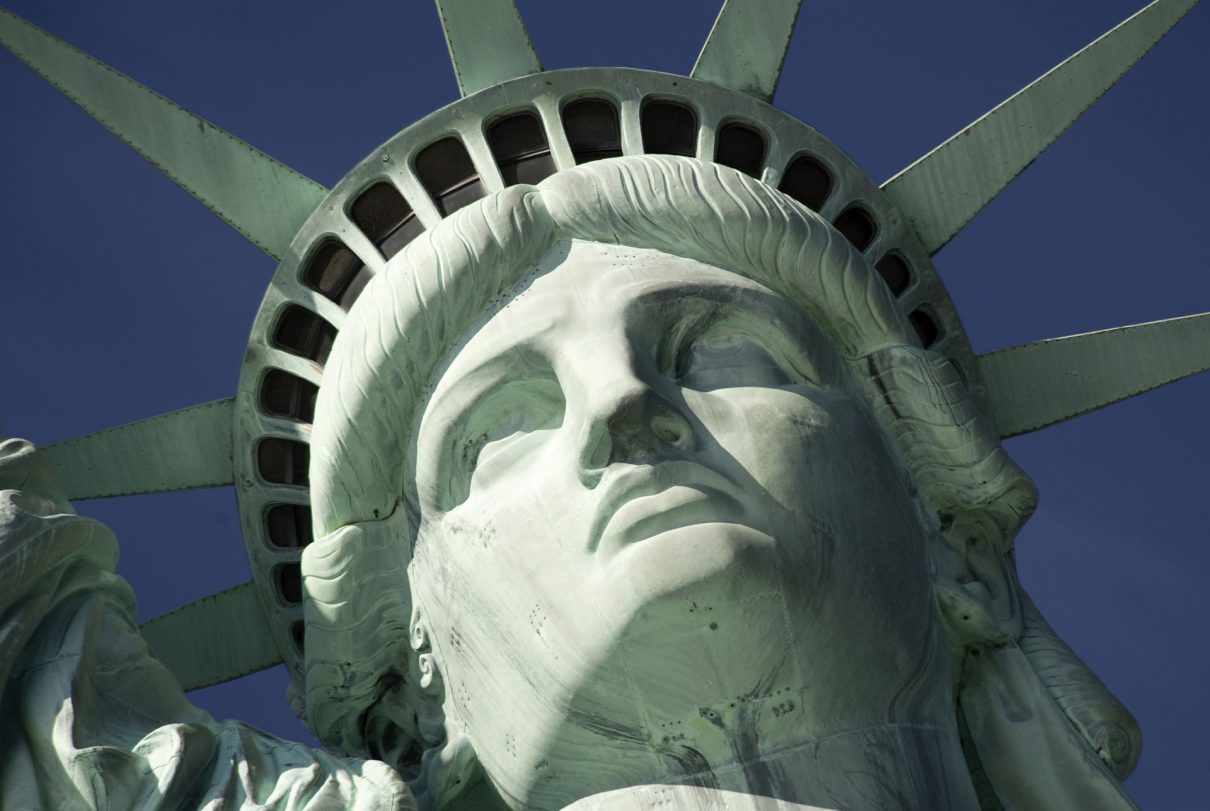
Freedoms at risk : the challenge of the century
Dominique Reynié, University Professor at Sciences Po,
Executive Director of the Fondation pour l’innovation politique.
“I believe that everything is always in question, that everything must always be saved,
that nothing is acquired definitively, and that there will never be rest on earth for men of goodwill.”
Raymond Aron, interviewed for television by Georges Suffert,
Un certain regard, ORTF, December 7th 1969
Joseph R. Biden, Jr., “Why America Must Lead Again. Rescuing U.S. Foreign Policy After Trump”, foreignaffairs.com, March-April 2020.
See Yves Bertoncini and Dominique Reynié, “The illiberal challenge in the European Union”, in András Sajó, Renáta Uitz and Stephen Holmes (eds.), Routledge Handbook of Illiberalism, Routledge, 2021, pp. 822-839.
Democracies today find themselves in a perilous situation, 30 years after the fall of the Berlin Wall signaled their moment of triumph. In an interview given in the spring of 2020, the man who would become president of the United States of America, Joe Biden, pointed out that not only has democracy stopped spreading but that it is actually in retreat: “Today, democracy is under more pressure than at any time since the 1930s. Freedom House has reported that of the 41 countries consistently ranked “free” from 1985 to 2005, 22 have registered net declines in freedom over the last five years.”1 Not even the most apparently robust democratic blocs have been invulnerable to this process of regression. Such is the case in the European Union, where elected governments are challenging the rule of law while claiming to be inspired by “illiberal democracy”.2
Significantly, the year 2021 ended with a “Summit for Democracy”, an event that President Joe Biden had first pledged in that same interview. In his keynote speech, delivered on December 9th, 2021, to representatives from 110 countries, Biden declared that “democracy is facing sustained and alarming challenges”. Seeming particularly worried, he spoke about trends “largely pointing in the wrong direction”, positing that “we stand at an inflection point”. “Will we allow the backward slide of rights and democracy to continue unchecked? Democracy doesn’t happen by accident. We have to renew it with each generation. […] In my view, this is the defining challenge of our time.” Also speaking at the summit, French President Emmanuel Macron echoed the American President’s concerns – “you have brought us together to talk about the only political model that allows us to defend these rights and freedoms: democracy” –, adding that the fight was “more necessary than ever”.
Globalization, the fruit of all-conquering democracy, is strengthening authoritarian regimes
Daniel Twining, “How Biden can beat the great-power authoritarians in China and Russia”, thehill.com, December 8th 2021.
The current tensions between the democratic world and authoritarian regimes hark back to the Cold War. China proclaims the superiority of its model, as the Soviet Union did in its time. Stalin’s Russia presented “people’s democracy” as the one true democracy, in opposition to representative democracy. China under Xi Jinping claims to have achieved authentic democracy by constructing a “socialist democracy with Chinese characteristics” that Beijing pits against “American democracy”. Moreover, by classifying its model as a “global democracy”, China proclaims it to be an appropriate solution for not just Chinese citizens but the whole world.
However, there is at least one major difference between our era and that of the Cold War, which lies in the fact that most authoritarian regimes do not reject the capitalist economy, or even globalization. Not only do the new economy and its accompanying innovations no longer destabilize regimes that are hostile to freedoms, they now enrich and strengthen them. No country illustrates this better than China, whose gradual rise to power accelerated after it joined the World Trade Organization (WTO) on December 11th, 2001.
Globalization provides authoritarian regimes with important economic resources, but it also offers them new ways to influence the world and to destabilize liberal societies. For China, Russia and Turkey, today it is easier than ever to interfere in the domestic affairs of countries – above all those governed by democratic regimes, which are inherently more open since they are founded on the principle of disclosure, even transparency – to spy on them, to disrupt their public services through computer hacking and to disturb the public debate through the mass production of false information, by supporting protest movements, endorsing separatist claims, and interfering with electoral campaigns in order to influence the result but, moreover, to weaken democracy itself in the eyes of its own citizens. More broadly, they do so to discredit democracy in the eyes of the world; to indicate that a page is being turned, that the time has come for a world dominated by authoritarian powers, that the historical cycle of freedom has come to an end.
Therefore, even though globalization was born out of the collapse of communism, and while it may signal the triumph of democracy, its spread has not resulted in the continuous expansion of political liberalism. On the contrary, having initially blessed the democratic world, globalization now appears to be endangering it. Owing to many of its side effects in developed societies – deindustrialization, metropolitanization, dematerialization of professional activities, decline in social and economic status, the accumulation of vast wealth – globalization creates conditions that favor populist movements and authoritarian discourse.
For dictatorships, the challenge of the century is twofold: on the one hand, they must call into question the role played by democratic states and their principles in regulating the world order; on the other hand, they seek to lower the status of regimes that are founded on the rights and freedoms of the individual and that stir up emancipatory ideas in countries beyond their borders. As Daniel Twining, president of the International Republican Institute (IRI), points out: “Autocrats are attacking open systems in part to stymie their own people’s natural attraction to freedom. Great-power authoritarians in China and Russia view subverting democratic practice as central to their geopolitical ambitions; should not free nations see protecting and promoting democracy as part of ours?”3
Freedom: a new and historical crisis
See Dominique Reynié (ed.), Islamist Terrorist Attacks in the World 1979-2021, Fondation pour l’innovation politique, September 2021.
The twenty-first century, as it unfolds, appears to have become entangled in multiple power struggles that all seem to be curtailing the established freedoms of citizens. Thus, in the field of health, the outbreak of a pandemic that originated in Wuhan at the end of 2019 – caused by the Covid-19 virus – has resulted in a painful and costly ordeal for the whole world. It has forced our countries to impose restrictive measures, and even lockdowns, as well as to adopt health strategies based around the de jure or de facto obligation of vaccination, actions that fuel accusations of a “health dictatorship” voiced by a small but zealous section of society.
In the field of security, democratic societies have been transformed to combat terrorism, and in particular Islamist terrorism, which has been a global concern since the tragedy of 9/11.4 This terrorism gives rise to a culture of suspicion and surveillance. Out of fear of an attack, exceptional rules imposed in emergency situations are accepted and adopted as common law. Meanwhile, the fear of terrorism and Islamism keeps populists supplied with a steady stream of voters.
At the same time, freedom of speech is being challenged in increasingly multicultural democratic societies. Our sense of social cohesion is being corroded by mutual misunderstandings, distrust and hostility. Intercultural disputes escalate into conflicts over values when the core difference of opinion concerns fundamental freedoms such as freedom of speech or freedom of the press. For example, we need look no further than the tragedies caused by the violent responses to the publication of The Satanic Verses by Salman Rushdie in 1988 and of cartoons in Denmark in 2008, not to mention the attacks on Charlie Hebdo in 2015. This type of terrorism takes the form of an internal war against the values of a liberal society, as was the case for the attacks in Paris and its surrounding region on November 13th, 2015, or in Nice on July 14th, 2016. Not since the 1930s have identity conflicts, populism, authoritarianism, racism and anti-Semitism undermined democratic societies to such an extent.
Without the freedom to debate and publish, the democratic model amounts to nothing. Those freedoms make the model possible, legitimate and effective, since it is liberty that enables human ingenuity to reach its full potential. Yet our century has also seen the emergence of a new transnational and digital public space. The cause of this particular upheaval is not found beyond democratic borders, nor is it foreign or hostile to liberal values. It lies in the remarkable technological innovations developed by companies whose success is made possible by the freedoms they enjoy. However, although they have an extraordinary effect on the number of people participating in the public media space, the power of digital platforms – The Big Five (GAFAM) – is nonetheless problematic. What becomes of democracies if the laws enacted by elected assemblies no longer have the power to regulate our freedoms? What becomes of democracies if the power to guarantee those freedoms stealthily shifts from parliaments into the hands of monopolistic companies?
Lastly, we must consider the repercussions for liberal societies of the fact that freedom of speech is no longer secure in the very environment where it should be most closely safeguarded: at universities. Schools and universities are responsible for nurturing the generations that will shape tomorrow’s world. The decline of academic freedom therefore casts a shadow over the future of freedoms in general. Universities will lose their chief purpose if they fail to halt the destructive spiral of intolerance, censorship and violence. Just as inevitably, the decline of freedom within the university environment will also trigger the deterioration of the university itself, of its knowledge and its resources. Also at stake, in this regard, is our ability to produce competent, responsible, inventive and liberal elites, without which democratic states will lose the power advantage they have always held over authoritarian states.
Defending and expanding freedoms in the twenty-first century
Ibid.
In this difficult context, the world is also confronted with global warming, one of the greatest challenges of the century. We will assume here that the effectiveness of the response to global warming is dependent to a large extent on the democratic model, because of the pressure it allows citizens to exert on their rulers. Furthermore, as Daniel Twining underlines: “Responsive and accountable democratic institutions will be essential to solving the world’s toughest challenges – from climate change to social justice to inclusive prosperity. Authoritarians who usurp their people’s most basic rights to life and liberty are not going to be trustworthy partners in attending to the common good of humankind.”5 The ultimate success of the fight against global warming will therefore depend not only on the stability of the democratic model but also on the extent to which it spreads around the globe. The democratic world seems eager to be embodied, among other things, by its resolute commitment to combating global warming. Its determination is such that it may be necessary to advise caution and to ensure that this mission is pursued with discernment – in other words, by taking on board its psychological, political, economic and social effects. If poorly conducted, or dogmatic and authoritarian in nature, the fight against global warming will contribute to weakening the democratic system and the support of society, particularly for those with lower-incomes and the middle classes.
While we must defend the climate, we must also defend our freedoms. This means deploying necessary resources to fight against ignorance and disinformation. If we are no longer able to offer high-quality education and information to as many people as possible, there can be no democratic regime. Freedom will be lost if we fail to keep inequality in check and to fight the corruption that, as highlighted by the results of our study, is of the utmost concern to our citizens.
Lastly, freedom will vanish if we give up the notions of prosperity and power. Defending freedom also means defending conditions that are propitious to economic growth and to scientific and technical innovation. The democratic world must ensure that it has the resources required to sustain the social and human progress that both constitute its raison d’être and strengthen its legitimacy. But the democratic world must also continue to develop its power, including its military power. In the twenty-first century, it may seem troubling to compare the vast financial resources earmarked for the ecological transition with the weak level of investment into ensuring the prosperity of democratic societies and their capacity to guarantee their own security in an increasingly dangerous world: a world in which China is threatening Taiwan and Russia is threatening Ukraine; in which Turkey is pushing Azerbaijan to wage war against Armenia, threatening Cyprus and putting pressure on Greece; and in which the Iranian theocracy is on the verge of possessing atomic weapons.
In the face of these major challenges, democratic societies still have one priceless asset that is illustrated in the results of our study. The citizens surveyed have confirmed their allegiance to freedoms and to democracy. Our data show that when they voice disapproval, more often than not, the object of their criticism is not the idea of democracy itself but rather the way in which democracy functions in their country. Freedom is not cultural. It is a human aspiration. Within us lies the force most capable of guaranteeing the sustainability of democracy in the twenty-first century.
| This survey was born out of close cooperation between the Fondation pour l’innovation politique (Fondapol), the International Republican Institute (IRI), the Community of Democracies (CoD), the Konrad-Adenauer-Stiftung (KAS), the Genron NPO, Fundácion Nuevas Generaciones (NG) and the República do Amanhã.
Following our survey What next for democracy?, conducted in 26 countries in 2017, and Democracies Under Pressure (42 countries, 2018), we now present Freedoms at risk: the challenge of the century, our new survey conducted in 55 countries. |
Survey methodology
fondapol.org, iri.org, community-democracies.org, kas.de, genron-npo.net, nuevasgeneraciones.com.ar/sitio/ and republicadoamanha.org.
The Fondation pour l’innovation politique (France), the International Republican Institute (the U.S.), the Community of Democracies (intergovernmental organization), the Konrad-Adenauer-Stiftung (Germany), the Genron NPO ( Japan), the Fundación Nuevas Generaciones (Argentina) and República do Amanhã (Brazil) joined together to work on an extensive international survey conducted across 55 countries, the results of which are published below under the title “Freedoms at risk: the challenge of the century”. The analysis of the results is available to the public, freely accessible on the respective websites of the seven partner think tanks.1 Six versions are available: in French, English, Spanish, Arabic, Portuguese and Japanese.
This publication is a written analysis by the Fondation pour l’innovation politique. The International Republican Institute, the Community of Democracies, the Konrad-Adenauer-Stiftung, and the Genron NPO helped in creating the questionnaire, but the following is the result of the Fondation pour l’innovation politique’s work. All opinions expressed should be considered those of the Fondation pour l’innovation politique team and do not necessarily reflect the opinions and views of the partner institutions.
The study2 is based on a questionnaire designed by the teams working at the partner think tanks. It was administered by Ipsos, a leading polling company, across national samples selected from each of the 55 surveyed countries. This survey encompasses the 27 Member States of the European Union, the Western Balkans (Albania, Bosnia and Herzegovina, Kosovo, Montenegro, North Macedonia, Serbia), other European countries that are not members of the European Union (Belarus, Georgia, Moldova, Norway, Switzerland, Ukraine), or that have left it (the United Kingdom), as well as Australia, Brazil, Canada, India, Indonesia, Israel, Japan, Lebanon, Mexico, New Zealand, Nigeria, the Philippines, South Korea, Tunisia and the United States.
55 countries, 45 languages, 47,408 respondents
Albanian (Albania), Albanian (North Macedonia), Arabic (Lebanon), Arabic (Tunisia), Belarusian, Bosnian, Bulgarian, Brazilian Portuguese, Croatian, Czech, Danish, Dutch, English, Estonian, Filipino, Finnish, French, Georgian, German, Greek (Cyprus), Greek, Hebrew, Hindi, Hungarian, Indonesian, Italian, Japanese, Korean, Latvian, Lithuanian, Luxembourgish, Macedonian, Maltese, Montenegrin, Norwegian, Polish, Portuguese, Romanian, Russian, Serbian, Slovak, Slovenian, Spanish, Swedish, Ukrainian.
In the case of Bosnia and Herzegovina, half of the interviews were conducted online and half were conducted in person.
In total, 47,408 people were surveyed. The study was conducted on the basis of representative national samples drawn from the population aged 18 years and above. Quotas for gender, age, profession, region and the size of respondents’ towns were used to ensure the representativeness of the samples and varied by country. The samples take into account the demographic weighting of each country. The approximate sizes of the samples were a thousand people in countries with more than 8 million inhabitants, six hundred people for those with 5 to 8 million inhabitants and five hundred people for countries with less than 5 million inhabitants. For some countries (Albania, Bulgaria, Croatia, Estonia, Latvia, Lithuania, North Macedonia, Serbia, Slovakia and Slovenia), the sample size was increased to 800 people despite a population of less than 8 million in order to maximize the representativeness of the results.
The 39 questions to which those participating in our survey “Freedoms at risk: the challenge of the century” were invited to respond is available on fondapol.org. It was administered in each of the national languages, amounting to 45 languages3 across the 55 countries. The data was collected over a five- week period (between July 9th and August 10th 2021, i.e. before the fall of Kabul) with the exception of Indonesia and the Philippines, where the questionnaire was administered between June 23rd and 30th of 2021. The survey was administered at a time when the countries were still, to varying degrees, going through the Covid-19 crisis. The interviews were all conducted via a self-administered online questionnaire with the exception of 10 countries, where in-person interviews were carried out: Albania, Bosnia and Herzegovina,4 Cyprus, Georgia, India, Kosovo, Malta, Moldova, Montenegro and North Macedonia. In all of these countries, these interviews were conducted according to the prevailing health regulations.
39 questions
The “Eastern European Union” sub-category is made up of Bulgaria, Croatia, Czech Republic, Estonia, Hungary, Latvia, Lithuania, Poland, Romania, Slovakia and Slovenia.
The “Western European Union” sub-category comprises Austria, Belgium, Cyprus, Denmark, Finland, France, Germany, Greece, Ireland, Italy, Luxembourg, Malta, the Netherlands, Portugal, Spain and Sweden.
This designation is without prejudice to positions on the status of Kosovo, and is in line with UN Security Council Resolution 1244 and the opinion of the International Court of Justice on the Kosovo declaration of independence.
For most of the questions, we asked respondents to answer by choosing a level on a four-point scale (e.g.“yes,absolutely”/“yes, somewhat”/“not really”/“not at all”) to assess, inter alia, levels of satisfaction, trust or optimism. In this document, for the sake of convenience and legibility, we usually present and comment on the results by adding up, on the one hand, the “yes, absolutely”/”yes, somewhat” answers and, on the other hand, the “not really”/”not at all” answers.
In some cases, respondents were asked to choose between two options. For instance, when asked for their view on globalization, the options offered to the respondents were “globalization is an opportunity” and “globalization is a threat”.
Some of the questions had three possible answers. When asked about the benefits to their country of NATO membership, for example, respondents could answer that the latter is “a good thing”, “a bad thing”, or “neither good nor bad”.
If they failed to respond to any of the questions, respondents received the following message: “Please try to answer the question. However, if you have no opinion on this question, you may move on to the next one by clicking ‘next question’” (the rate of non-responses was between 0% and 2% both online and in-person).
Lastly, the results are presented either by country or by sub- category. The overall results are presented in the “Global” category. The value of each country has been by weighted to take into account their demographic weight within the overall sample. Accordingly, the results from India make up 38.1% of the overall weighted sample. Because of this demographic weight, and unless otherwise specified in the document, the overall (“Global”) average does not include India.
For a given question, the “Global” average therefore corresponds to the results obtained from the 54 countries surveyed (excluding India). For a given question, the “EU” average corresponds to the results from across the Member States of the European Union, i.e. 27 countries, with values weighted according to demographic weight. We have also included separate “Eastern European Union”5 and “Western European Union”6 sub-categories. We use an average referred to as the “Western Balkans”, which corresponds to the Balkan countries that are not members of the European Union: Albania, Bosnia and Herzegovina, Kosovo,7 Montenegro, North Macedonia and Serbia.
The seven organizations made a collective choice to use, whenever possible the online method to administer this poll. In some countries, where freedom of expression can be limited, the online methodology was the only reliable solution to get to meaningful results.
The online methodology also allowed us to cover more countries, including some that usually do not appear in opinion surveys of public perception of democracies. We believed those countries deserve to be included in the final results, even though, for some, the individual samples may include some specific caveats that, for the sake of transparency, we would like to point to the attention of the reader here.
The samples conducted online in Belarus, Indonesia, Mexico, Montenegro Nigeria and the Philippines represent populations that are more urban, more educated, or more affluent than the general population. The survey results in these countries should therefore be viewed as more reflective of the opinions of the more “connected” segments of these populations, even if the weighting applied to the data makes it possible to correct for some of the sampling bias.
Furthermore, we would like to point out some specific situations in which the underrepresentation of certain groups and overrepresentation of others was difficult to avoid in the present state of online polling capacities:
– Nigeria: underrepresentation of Muslims (15% in the sample vs. 54% in the latest estimates).
– Belarus: underrepresentation of older respondents (the sample is 41% of 18–34-year-olds, 40% of 35–49-year-olds, and 7% of the 60+ age group – compared to numbers of 28%, 27%, and 28%, respectively, for these age groups). Bias partially corrected by data weighting.
– Indonesia: overrepresentation of Christians in the sample (17% Christian and 77% Muslim, vs. official estimates at 9% Christian and 87% Muslim).
– Lebanon: Overrepresentation of youth (53% of respondents fall within the 18–34 age group, compared to the expected 38%). Bias partially corrected by data weighting.
– Israel: the sample should be considered as for Hebrew speakers only.
– Tunisia: overrepresentation of the 18–34 age group (60% vs. an expected 35%), and underrepresentation of the older population (6% and 3% in the 50–59 and 60+ age cohort in the sample, vs. the 16% and 19% of the actual populations). Bias partially corrected by data weighting.
It is our hope that the experience of administering this survey in those countries will be used to correct the representativity issues we encountered in our samples, so that future surveys can set even higher standards for online and offline polling methodologies at the global level.
Finally, we hope that our investigation will contribute to helping those countries where freedom is restricted to progress on the road to democratization.

Who are democracies afraid of
The current tensions between the democratic world and authoritarian regimes hark back to the Cold War. China proclaims the superiority of its model, as the Soviet Union did in its time. Stalin’s Russia presented “people’s democracy” as the one true democracy, in opposition to representative democracy. China under Xi Jinping claims to have achieved authentic democracy by constructing a “socialist democracy with Chinese characteristics” that Beijing pits against “American democracy”. Moreover, by classifying its model as a “global democracy”, China proclaims it to be an appropriate solution for not just Chinese citizens but the whole world.
However, there is at least one major difference between our era and that of the Cold War, which lies in the fact that most authoritarian regimes do not reject the capitalist economy, or even globalization. Not only do the new economy and its accompanying innovations no longer destabilize regimes that are hostile to freedoms, they now enrich and strengthen them. No country illustrates this better than China, whose gradual rise to power accelerated after it joined the World Trade Organization (WTO) on December 11th, 2001.
Globalization provides authoritarian regimes with important economic resources, but it also offers them new ways to influence the world and to destabilize liberal societies. For China, Russia and Turkey, today it is easier than ever to interfere in the domestic affairs of countries – above all those governed by democratic regimes, which are inherently more open since they are founded on the principle of disclosure, even transparency – to spy on them, to disrupt their public services through computer hacking and to disturb the public debate through the mass production of false information, by supporting protest movements, endorsing separatist claims, and interfering with electoral campaigns in order to influence the result but, moreover, to weaken democracy itself in the eyes of its own citizens. More broadly, they do so to discredit democracy in the eyes of the world; to indicate that a page is being turned, that the time has come for a world dominated by authoritarian powers, that the historical cycle of freedom has come to an end.
China worries the democratic world
In 2018, the 42 countries of the Democracies Under Pressure study were: Albania, Australia, Austria, Belgium, Bosnia and Herzegovina, Brazil, Bulgaria, Canada, Croatia, Cyprus, Czech Republic, Denmark, Estonia, Finland, France, Germany, Greece, Hungary, Ireland, Israel, Italy, Japan, Latvia, Lithuania, Luxembourg, Malta, Netherlands, New Zealand, Norway, North Macedonia, Poland, Portugal, Romania, Serbia, Slovakia, Slovenia, Spain, Sweden, Switzerland, Ukraine, the United Kingdom and the United States.
Although the European Union is the power that respondents consider least worrying, it is not an entity comparable to a traditional nation state.
In our survey, we sought to establish how authoritarian countries are perceived. We asked the following question: “For [China, Russia, Turkey], please tell me if you think their posture on the international stage is worrying, reassuring or neither”. This shows that 60% of respondents consider China’s posture on the international stage to be “worrying”, 52% feel the same way about Russia and 37% about Turkey. Almost a quarter of respondents (22%) consider China’s attitude to be “neither worrying nor reassuring” while 18% consider it to be “reassuring”. In India, whose results are not included in the calculation of the global average owing to its demographic weight, concerns about China’s posture are shared by 43% of respondents (12% are reassured, 17% answered “neither” and 28% chose not to respond). In our 2018 survey of 42 countries,1 China’s reputation was less of a concern. In the eyes of the public, it was the least worrying, behind Russia and the United States.2
A strong majority of citizens are concerned about China (in %)

Copyright :
Fondation pour l’innovation politique – January 2022
On this subject, see: Paul Charon and Jean-Baptiste Jeangène Vilmer, Les Opérations d’influence chinoises. Un moment machiavélien, Institut de recherche stratégique de l’École militaire (Irsem), 2nd edition, October 2021.
Jean-Pierre Cabestan, Laurence Daziano, Hong Kong: The Second Handover; Hongkong : la seconde rétrocession, Fondation pour l’innovation politique, juillet 2020; 香港: 二次回歸 ; 香港: 二次回归.
China is comfortable with, and at times even ostentatiously assertive about, its model, which combines the totalitarian organization of the state with a capitalist economy and high-tech control society. Externally, thanks to a soft power strategy presenting the image of a great civilization gloriously reclaiming its status as a global power, it has been able to increase its influence without immediately raising serious concerns. However, Beijing’s power play can no longer be hidden.3 The public now views the country’s desire to reshape the rules of globalization to its advantage and its geopolitical expansion projects – as evidenced by its brutal repression in Hong Kong4 and its increasingly frequent acts of aggression against Taiwan and, more generally, throughout the Asia-Pacific region – as a threat. Moreover, while the Covid-19 health crisis may have played in Beijing’s favor by destabilizing the Western world, and above all the United States, China is now suspected of having obstructed investigations into the origins of the virus. It is also accused of withholding information on both the severity of the pandemic on its territory and the speed with which it spread around the world.
| Fear of China rose drastically between 2018 and 2021
In 2018, among respondents from the 42 countries in the Democracies Under Pressure survey, half (49%) said they were worried about China’s posture on the international stage. In 2021, looking only at the same 42 countries from 2018, we see that this fear has increased sharply (65%). |
The desire to deepen relations with Beijing is counterbalanced by concerns about China (in %)
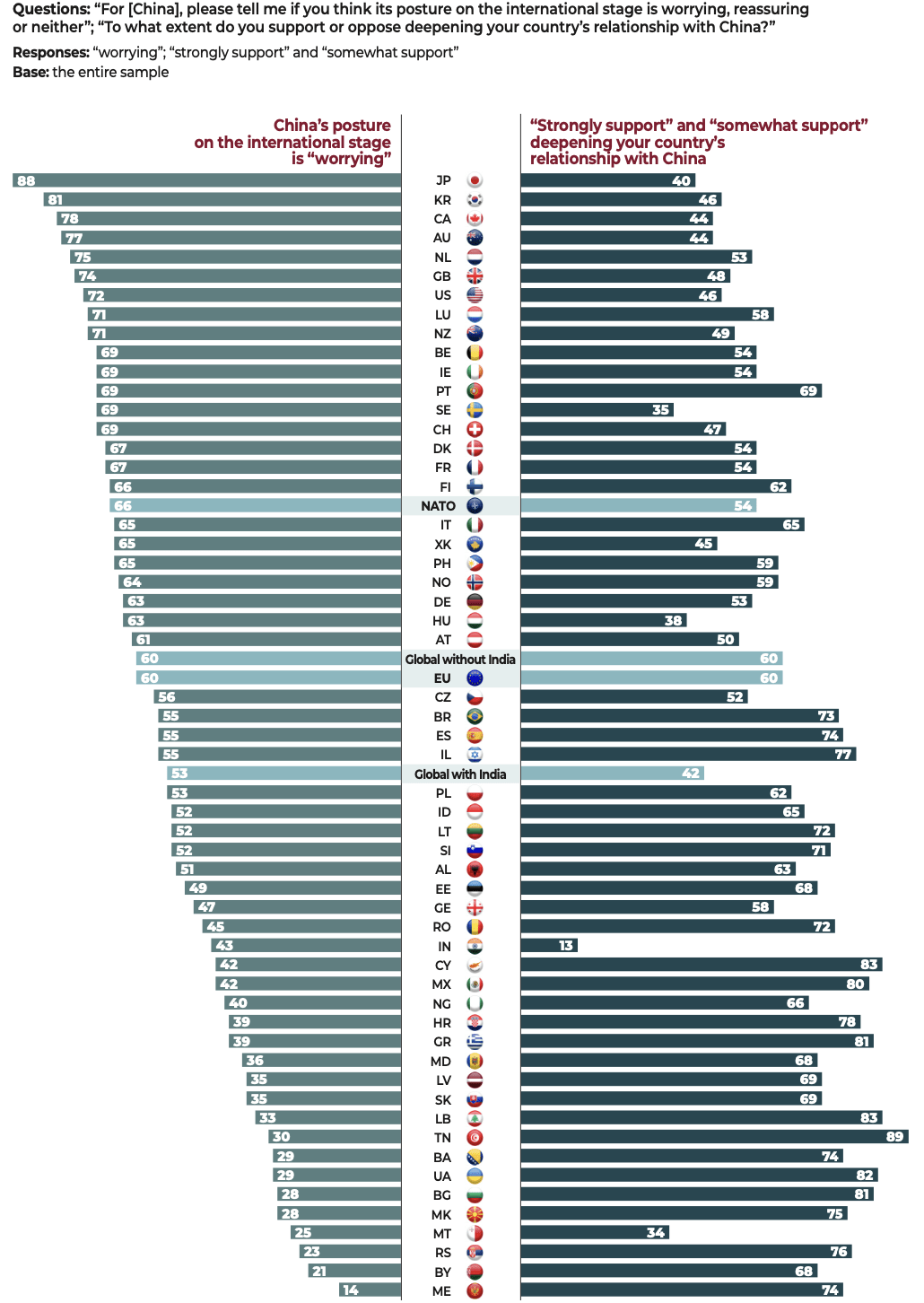
Copyright :
Fondation pour l’innovation politique – January 2022
See Emilie Sweigart and Gabriel Cohen, “Brazil’s Evolving Relationship with China”, americasquaterly.org, October 19th 2021.
See Amb. Martha Bárcena Coqui, “Why Mexico’s Relationship with China Is So Complicated”, americasquaterly.org, September 28th 2021.
The Americas in the face of Chinese ambition
Concerns regarding China are unprecedentedly widespread among Canadians (78%), Americans (72%) and Brazilians (55%), though the prospect of a deepening of relations with China is causing discord among public opinion across the Americas. While the majority of Canadians (56%) and Americans (54%) are opposed to the deepening of relations, the same cannot be said of Brazilians. On the contrary, there is broad support for this proposal in Brazil (73%). In Mexico, concern about China is less widespread (42%) and most Mexicans (80%) want their country to deepen its relationship with China. It is worth bearing in mind that Beijing, under Hu Jintao and Xi Jinping, has multiplied the number of strategic partnership agreements and, in doing so, has become Brazil’s largest economic partner5 and Mexico’s second largest behind the United States; as time passes, Mexico is doing proportionally more trade business with China and less with the United States.6
In the Americas, China is a growing cause of concern (in %)
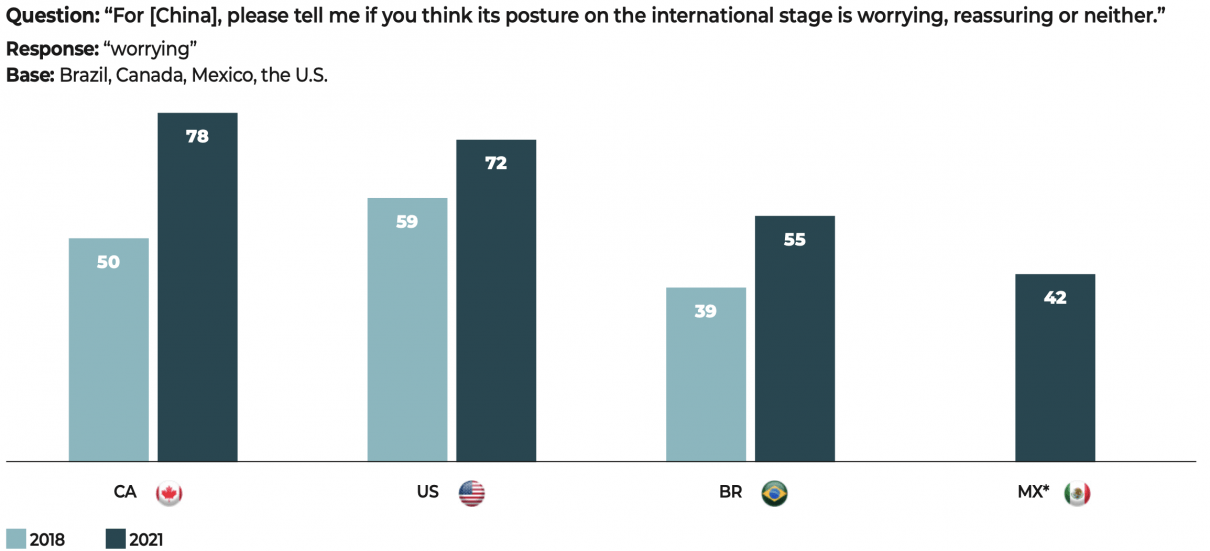
Copyright :
Fondation pour l’innovation politique – January 2022
* Mexico was not on our panel in 2018.
See Anchal Vohra, “China Wants to Be Lebanon’s Savior”, foreignpolicy.com, July 9th 2020.
See David Sacks, “Countries in China’s Belt and Road Initiative: Who’s In and Who’s Out”, Council on Foreign Relations, March 24th 2021.
See Oluwatosin Adeshokan, “Why Is China Looking to Establish Banks in Nigeria?”, thediplomat.com, October 13th 2021.
| Lebanon, Tunisia, Nigeria: fragile states in favor of deepening their relations with China
One measure of Beijing’s growing influence can be seen in the number of governments willing to enter into economic partnerships with China. In Lebanon, Beijing is acting quickly to build infrastructure in the country and, above all, to unfurl the so-called Pan-Arab Highway linking Beirut and Damascus.1 Tunisia, in the midst of an economic and political crisis, joined the “Belt and Road Initiative” initiative in 2018, offering China opportunities for cooperation2 and prospects for greater influence in Africa. Lastly, Nigeria, the most populous country in Africa, has become a new El Dorado for Chinese business, whose increased investment there has coincided with diminishing levels of Western investment.3 |
See Muhammad Zulfikar Rakhmat, “Indonesia and China inked a deal to promote the use of the Yuan and Rupiah. The political and economic implications are huge”, theconversation.com, October 14th 2020.
See “North Korean nuclear issue and US-China conflict greatest risks to peace in Northeast Asia in 2021”, The Genron NPO, March 2nd 2021.
China is viewed negatively in the Asia-Pacific region
In the Asia-Pacific region, the level of concern is high among Filipinos (65%) and Indonesians (52%). However, both Filipinos (59%) and Indonesians (65%) want to see a deepening of their countries’ relationships with China. Indonesia and China signed an agreement in September 2020 to settle their trade transactions in their respective national currencies, thereby reducing their dependency on the dollar and other currencies.7
Concerns regarding China are even more widespread in New Zealand (71%), Australia (77%) and South Korea (81%). The same can be said of Japan, where in 2021 the fear is almost unanimous (88%) at a similar level to that registered in 2018 (91%). The impact of Beijing’s increasing military presence in the South China Sea is being felt across the entire region, leading to harsher public perceptions of China.8 New Zealanders (51%), South Koreans (54%), Australians (56%) and the Japanese (60%) are now opposed to the deepening of relations with China.
Finally, although the same fear is not as commonplace in India (43%), three-quarters of Indians (72%) are opposed to a deepening of relations with their neighbor, while territorial disputes between the two Asian giants remain unresolved.
Populations from the Asia-Pacific region favor investments by democratic powers over those from China (in %)
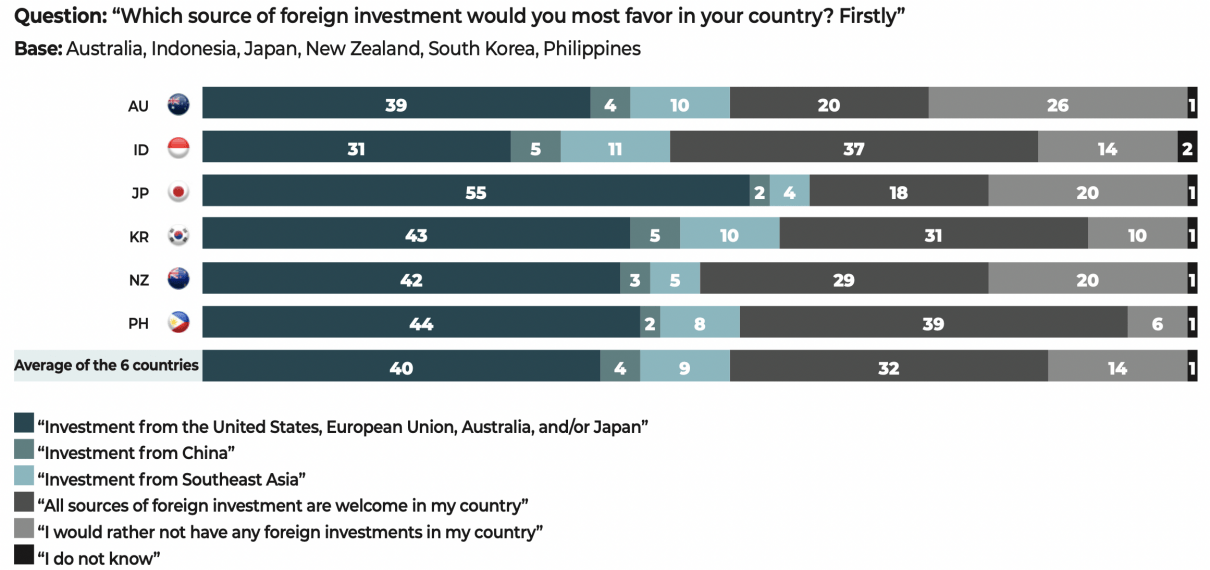
Copyright :
Fondation pour l’innovation politique – January 2022
See A World Safe for the Party. China’s Authoritarian Influence and the Democratic Response. Country Case Studies from Nepal, Kenya, Montenegro, Panama, Georgia and Greece, International Republican Institute, 2021, pp. 54-60.
Quotation cited in Silvia Amaro, “China bought most of Greece’s main port and now it wants to make it the biggest in Europe”, cnbc.com, November 15th 2019.
China divides the European continent
Among Europeans (in EU Member States), concerns about China’s posture on the international stage have spread rapidly and are now shared by 60% of respondents, 20 points higher than in 2018 (40%). Greeks are among the least troubled by this potential threat (39%), although the level of concern there has also increased compared to 2018 (29%). The two countries have grown progressively closer since the 2008 financial crisis.
China intends to turn the Greek port of Piraeus into one of Europe’s biggest ports and a key logistical interface on the “Belt and Road Initiative”.9 Chinese President Xi Jinping said in 2019: “We want to strengthen Piraeus’ transshipment role and further boost the throughput capacity of China’s fast sea- land link with Europe.”10
Opinions are more divided in Eastern Europe. In that region, Bulgarians, Latvians, Slovaks and Croats are those least worried about China. On the other hand, a sense of concern is more prevalent in Lithuania, Slovenia, the Czech Republic, Hungary and Poland.
The Chinese posture is inciting anxieties in Europe (in %)
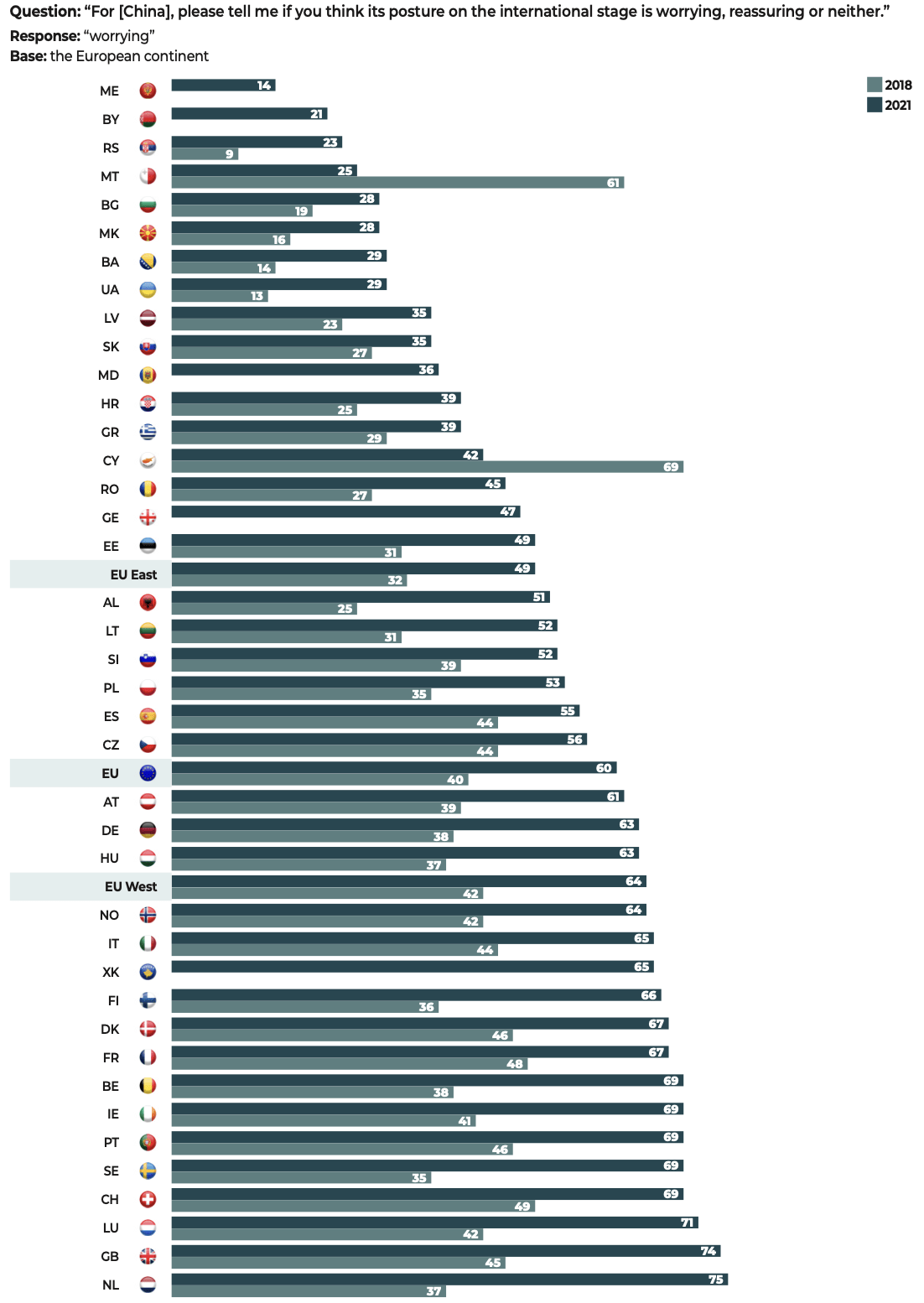
Copyright :
Fondation pour l’innovation politique – January 2022
The “17+1”, or “16+1”, is a forum initiated by Beijing to extend its economic and political influence in Europe beyond the institutional and formal framework of the European Union and to pursue its flagship investment project, known as the “Belt and Road Initiative”. The “17+1” initiative includes Albania, Bosnia and Herzegovina, Bulgaria, Croatia, the Czech Republic, Estonia, Greece, Hungary, Latvia, Montenegro, North Macedonia, Poland, Romania, Serbia, Slovakia and Slovenia. Lithuania pulled out of the “17+1” initiative in March 2021.
In the Western Balkans, a third (33%) of respondents said that they were worried by China’s posture on the international stage, a similar amount to those who find it reassuring (34%). Kosovars are the exception (65% are worried by China’s behavior). Established in 2012, the “17+1” initiative11 is bearing fruit. Eastern Europe is a key region for the “Belt and Road Initiative” project launched in 2013. Chinese investments, such as the construction of a railway linking Belgrade and Budapest, seem to be winning people over: the data show that public opinion is more favorable to a deepening of relations with China in the Eastern European Union (64%) than in the Western European Union (59%). In the Western Balkans, support for stronger trade links with Beijing is greater still (70%).
A less influential Russia remains feared by its neighbors
In the democratic world, Europe fears Russia the most (in %)
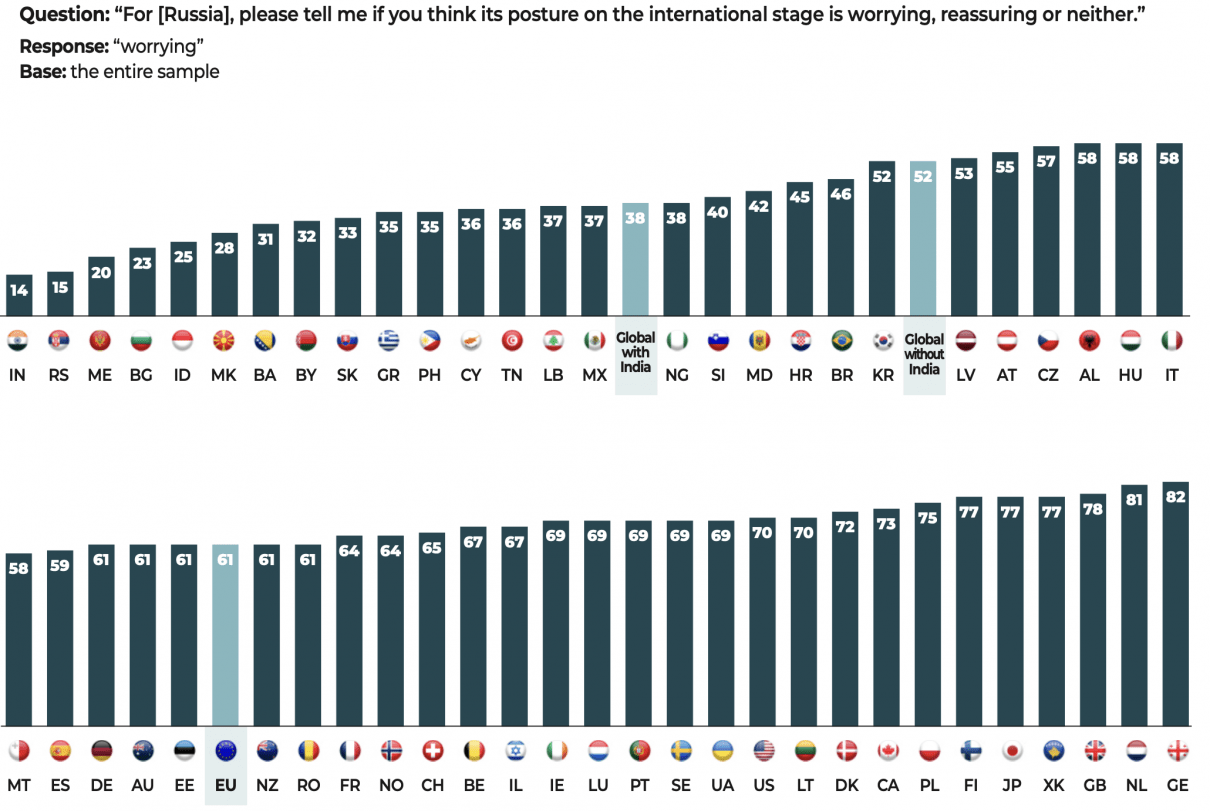
Copyright :
Fondation pour l’innovation politique – January 2022
See “Russia cyber-plots: US, UK and Netherlands allege hacking”, bbc.com, October 4th 2018.
See Simone Tagliapietra and Georg Zachmann, “Will natural gas cooperation with Russia save the Greek economy?”, bruegel.org, April 20th 2015.
Russia has become a country with a fragile economy that is suffering from a rapidly ageing population. Only a small minority (4%) of those surveyed named Russia as the most influential global power. A majority (52%) of respondents nonetheless still indicate that they are worried by its posture on the international stage. This fear is particularly widespread among Georgians and Ukrainians, of course, but it is also prevalent among the Dutch, Brits, Finns, Danes and Swedes. In part, this can be owed to Russian interference in domestic affairs: the Netherlands and the United Kingdom have both been subject to cyberattacks by Moscow, particularly during election campaigns, which they have condemned.12
However, the level of concern has not risen between 2018 and 2021 in countries that are particularly sensitive to Russian pressure; indeed, although remaining high, it has actually gone down in some of these countries. For example, concerns about Russia are shared by 61% of Estonians (down 19 points from our 2018 survey), 53% of Latvians (down 13 points) and 70% of Lithuanians (down 4 points).
Greece is the exception in Europe, since only a third of respondents indicated that they were worried by Russia. In 2015, the two countries signed an agreement within the framework of the Turkish Stream, a major pipeline that passes through Greece and Turkey to connect Russia and Europe.13 Construction began in 2017 and the pipeline started operating in 2020.
Russia’s posture is a cause of concern in NATO countries (66%), particularly in the United Kingdom, Canada and the United States. Respondents who consider their country’s membership of NATO to be “a good thing” are more likely to express concern about Russia (73%) than those who see it as “a bad thing” (54%).
In the Asia-Pacific region, Russia is deemed worrisome by a majority of South Koreans, Australians, New Zealanders, and three quarters of the Japanese.
Turkey is disorienting for Europeans
See Tuvan Gumrukcu, “Turkey says sent Cypriot vessel away from its continental shelf”, reuters.com, October 4th 2021.
See Humeyra Pamuk, “Erdogan says Turkey plans to buy more Russian defense systems”, reuters.com, September 27th 2021.
See Steven Erlanger, “Turkish Aggression Is NATO’s ‘Elephant in the Room’”, nytimes.com, August 3rd 2020.
Turkey is the authoritarian power that the democratic world worries the least about: 37% of respondents say that they are worried about Turkey’s posture on the international stage, and only 19% find it reassuring. Public opinion seems to be on standby: almost half (44%) of respondents find it “neither worrying nor reassuring”.
However, in the European Union, Turkey (63%) is the main cause of concern ahead of Russia (61%) and China (60%). There are some Member States where people are particularly worried: the Netherlands (78%), Luxembourg (76%), Germany (74%), Austria (73%), Belgium (72%), France (71%) and Italy (70%). It is worth noting that these are Western European countries, most of which host sizeable Turkish communities. In the heart of Mediterranean Europe, Cypriots (95%) and Greeks (85%) are most troubled by Turkey’s posture, something that may be explained by the territorial disputes pitting Cyprus and Greece against Ankara, both over the island of Cyprus since 1974 and, more recently, over oil and gas exploration rights in the Mediterranean.14
Democracies outside the Euro-Mediterranean region seem less concerned with Turkey. Around a third of Americans (38%), Australians and Canadians (36%), the Japanese (34%), South Koreans and New Zealanders (32%) find Turkey’s posture on the international stage to be worrisome.
On average, half the population in NATO member countries (50%) are troubled by Turkey’s posture on the international stage. This figure rises to 58% if we remove the United States from the NATO average, which proves that it is principally Europeans who are worried about Turkey’s stance on the international stage. The country, which will celebrate the seventieth anniversary of its membership of the North Atlantic Alliance in 2022, has been stoking tensions for several years, particularly by purchasing a defense system from Russia that is incompatible with those of the North Atlantic Alliance15, by launching offensives in northern Syria, as well as by confronting Greek ships in the eastern Mediterranean and French vessels off the Libyan coast.16
Turkey, the NATO member country that worries Europeans and the Mediterranean region (in %)
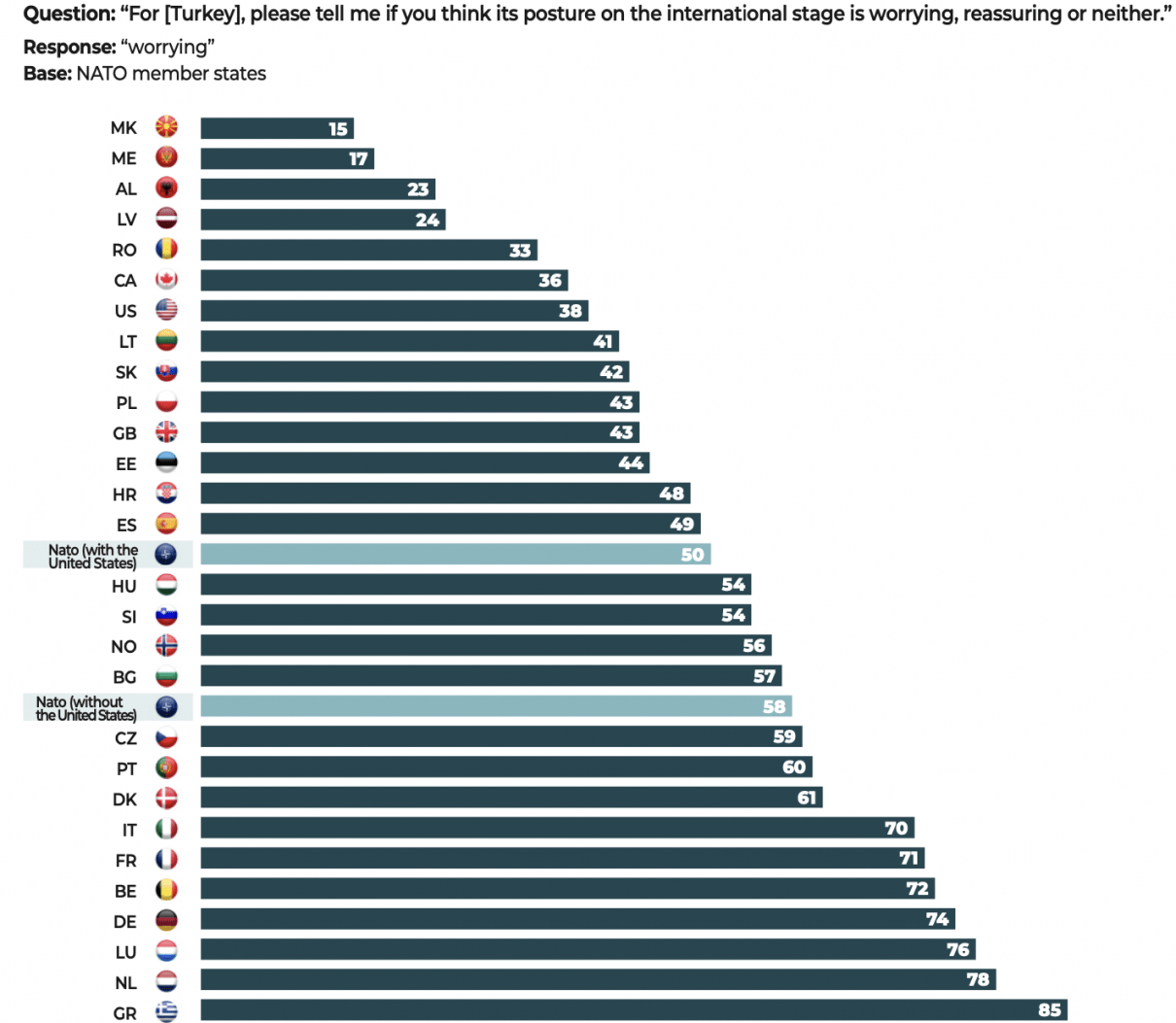
Copyright :
Fondation pour l’innovation politique – January 2022
The issue of immigration continues to shape public perceptions of Turkey, especially as President Recep Tayyip Erdoğan puts pressure on the borders of the European Union: almost three-quarters (70%) of respondents in the European Union who believe that immigration is one of the greatest threats to their democracy are worried by Turkey’s posture on the international stage (compared with 50% overall).
See Richard Allen Greene and Oren Liebermann, “Tensions between Israel and Palestinians are sky-high. Here’s what you need to know”, cnn.com, May 16th 2021.
See “President Erdoğan, President Putin of Russia talk over phone”, Presidency of the Republic of Türkiye, Directorate of Communications, iletisim.gov.tr, May 12th 2021.
See Omar Babakhouya, La Diplomatie turque au Moyen-Orient à l’ère AKP. Quel arbitrage entre idéologie et pragmatisme ?, L’Harmattan, 2020.
| The Israeli view on tensions with Turkey
Two-thirds (67%) of Israelis are worried by Turkey’s posture. President Erdoğan stepped up his aggressive rhetoric towards the Jewish state following the outbreak of tensions between Israel and Palestine in May 2021,1 shortly before our survey was administered. In a statement on May 12th 2021, Erdoğan announced that “the international community should give the State of Israel a strong and deterrent lesson”.2 Relations with the Jewish state have not always been so strained. In 1949, Turkey became the first Muslim-majority country to recognize the State of Israel. However, it broke off diplomatic ties in 2010 and the AKP party now endorses an Islamist-nationalist program that stands at odds with the Kemalist doctrine.3 |
Younger generations are less afraid of authoritarian powers (in %)

Copyright :
Fondation pour l’innovation politique – January 2022
The higher the social category, the greater the fear of authoritarian regimes is (in %)

Copyright :
Fondation pour l’innovation politique – January 2022
Fears about authoritarian powers vary according to the respondents’ other concerns (in %)
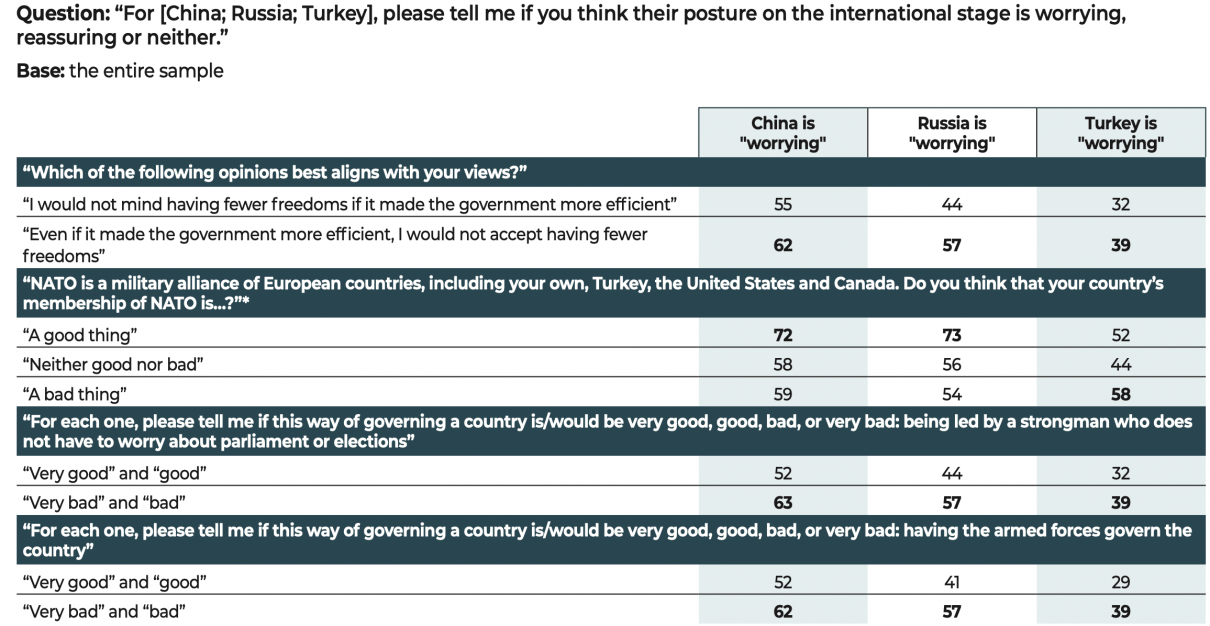
Copyright :
Fondation pour l’innovation politique – January 2022
Meme for the reader: 72% of respondents who think their country’s membership of NATO is a good thing are worried about China’s attitude on the international stage.
* For this question, the sample is made up of populations from NATO member countries.
The United States is still considered the dominant global power
The United States remains by far the most influential power
The views that respondents hold on American power tend to be influenced by how they judge the state of democracy in their own country. The latter is illustrated by how well they think democracy works and how worthwhile they think it is to vote. Thus, respondents of the opinion that democracy is not working well in their own country are more likely to think that the posture of the United States on the international stage is a cause for concern. On the other hand, those who think that their own democracy is working well are more worried about China, Russia or Turkey. The same correlation is found among the respondents who believe that “voting is pointless because politicians do not care about the will of the people”.
The public considers the United States to be the most influential power (in %)
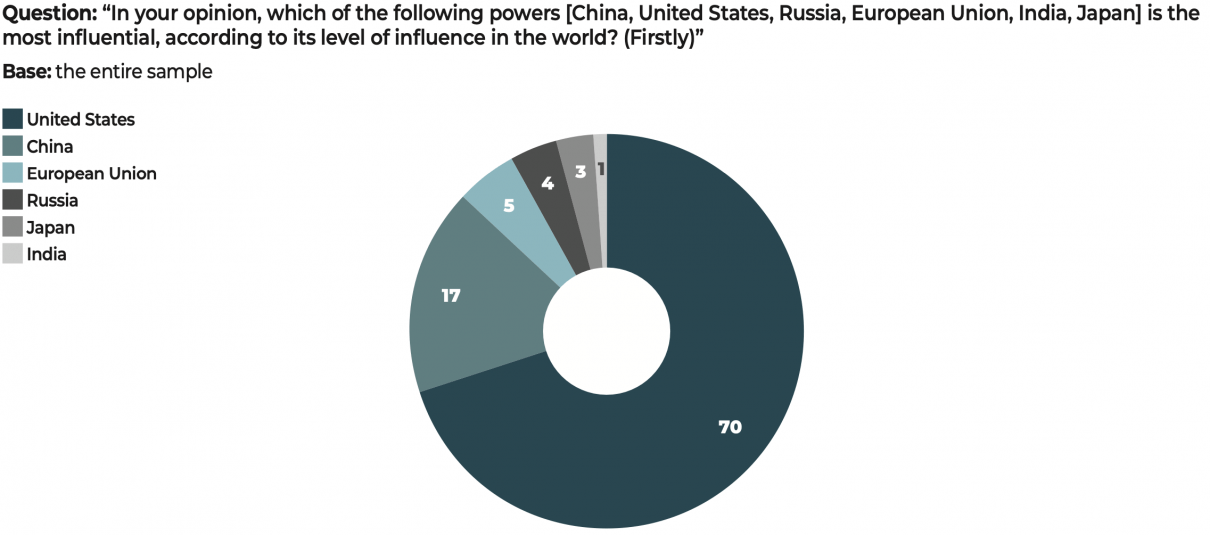
Copyright :
Fondation pour l’innovation politique – January 2022
Respondents who are critical of how democracy works in their country are less fearful about authoritarian regimes (in %)

Copyright :
Fondation pour l’innovation politique – January 2022
Memo for the reader: Among the respondents who consider that “voting is pointless because politicians do not care about the will of the people”, 38% say they are worried about the attitude of the United States on the international scene.
If we compare the 2018 and 2021 data for the 42 countries that took part in both surveys (i.e. excluding Belarus, Georgia, India, Indonesia, Kosovo, Lebanon, Mexico, Moldova, Montenegro, Nigeria, Philippines, South Korea and Tunisia), the improvement in the image of the United States is even more pronounced: 56% of respondents expressed concern in 2018, compared to a third (33%) in 2021.
See John Glaser, Christopher A. Preble and A. Trevor Thrall, Fuel to Fire. How Trump Made America’s Broken Foreign Policy Even Worse (and How We Can Recover), Cato Institute, 2019.
Compared to our last international survey, the image of the United States has improved significantly: in 2018, over half of respondents (56%) were concerned by the power of the United States.17 Some of the Trump administration’s rhetoric and decisions concerning foreign policy and trade might have fueled the feeling that his presidency was an excessive additional disruption in an already uncertain world, something felt all the more keenly since it concerned the leader of the free world.18 This reaction can be seen within American society itself: although almost a third of Americans (30%) are still worried by their country’s posture on the world stage, this result is down by 13 points compared with 2018 (43%). Other countries in the Americas have followed the same trend: 41% of Canadians and 39% of Brazilians find the U.S.’ posture to be worrisome, compared to 76% and 53% respectively in 2018. Looking at the Americas as a whole, it is Mexicans who are most worried (46%) about the United States; however, since this is the first time the country has taken part in our survey, we are unable to draw a comparison with 2018.
Israel’s special relationship with the United States is also reflected in the results: in 2021, more than half of Israelis (56%) say that they find the United States to be a reassuring presence. The same is true of other friends of the United States, notably the Philippines, a historical ally with which it signed a mutual defense treaty in 1951. A majority of Filipinos (59%) also said that they were reassured by the American posture on the international scene, at a time when they are confronted with Chinese aggression in the South China Sea.
In the European Union, the deterioration of the image of the United States noted in 2018 has reversed in 2021. While 63% of Europeans found the American power to be worrisome in 2018, this number decreased to 31% in 2021.
NATO’s intervention in the Western Balkans at the turn of the twentieth and twenty-first centuries left a lasting impression. Attitudes towards the intervention in favor of Kosovo during the War in 1999 are still reflected in public opinion. Kosovars (87%) and Albanians (65%) are most likely to be reassured by the United States; on the other hand, Serbs (61%) and a significant number of Bosnians (37%) find the posture of the United States worrying. The American-led NATO bombing of Serbian targets during the Yugoslav Wars may explain the former country’s distrust of the United States, but also for Bosnians, who have a large Serbian population.
| The Special Relationship: the British are more reassured in 2021
In 2017 and 2018, only 16% of Britons said they thought the posture of the United States on the international stage was reassuring. In 2021, that figure has more than doubled (36%). The British sense of reassurance is likely to be felt even more keenly now that the two countries have entered into a military alliance with Australia and the United States to counter the influence of China (AUKUS). |
See Steve Scherer and Dave Graham, “Tensions over cars, protectionism loom at North American leaders summit”, reuters.com, November 18th 2021.
With the exception of Canada, the Anglosphere views the United States as a reassuring power
In the countries that make up AUKUS (Australia, the United Kingdom and the United States), a tripartite military alliance made public in September 2021 and formed to counter the influence of China, the posture of the United States is considered to be more reassuring in 2021 (36% among the British and 39% among Australians) than it was in 2018 (16% and 20%, respectively). This is also the case for New Zealand, which previously formed part of ANZUS (Australia, New Zealand and the United States), a forerunner of AUKUS: 15% in 2018, compared to 29% in 2021. These countries in the Anglosphere are increasingly preoccupied with Beijing. However, the United States’ neighbor to the north appears to be less effusive in its support; 41% of Canadians are worried by the posture of the United States on the international stage, a result that can be explained in part by trade tensions. The United States- Mexico-Canada Agreement (USMCA), which replaced the North America Free Trade Agreement (NAFTA) in July 2020, has led to a trade tug-of-war. While NAFTA proposed a model for the integration and standardization of a common market in North America inspired by the European Union, USMCA is based to a greater extent on cooperation and is generating considerable tensions over the protection of certain strategic priorities (such as electric vehicles) that the signatory countries are prepared to fight tooth and nail to defend19.
See Andrew Moravcsik, “Why Europe Wins”, foreignpolicy.com, September 24th 2020.
| The European Union, a soft power influence
The European Union cannot be considered as a “power” in the same way that China, Russia and the United States are because it is not a state. As a system of close cooperation between 27 sovereign states, the European Union exerts an influence that is more akin to soft power through its internal market, its legal model and its normativism. The European Union cannot conceive of the use of hard power.1 This European Union, with its singular nature, is judged “reassuring” by almost half of respondents (44%), while 20% of respondents consider it “worrying” and more than a third (36%) think that it is “neither reassuring nor worrying”. |
American power is making people less anxious in 2021 than it did in 2018 (in %)
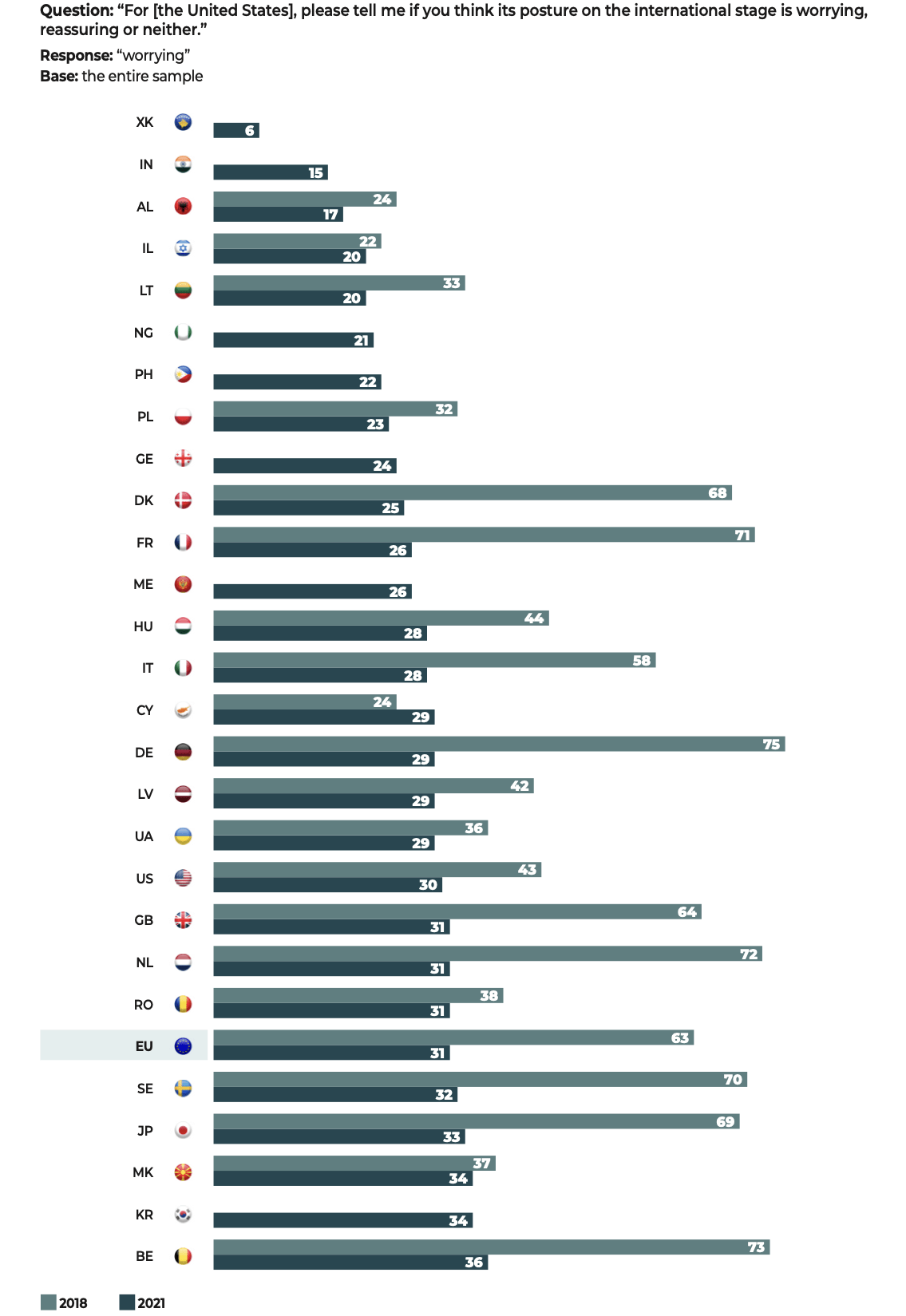
Copyright :
Fondation pour l’innovation politique – January 2022
American power is making people less anxious in 2021 than it did in 2018 (in %) – continued
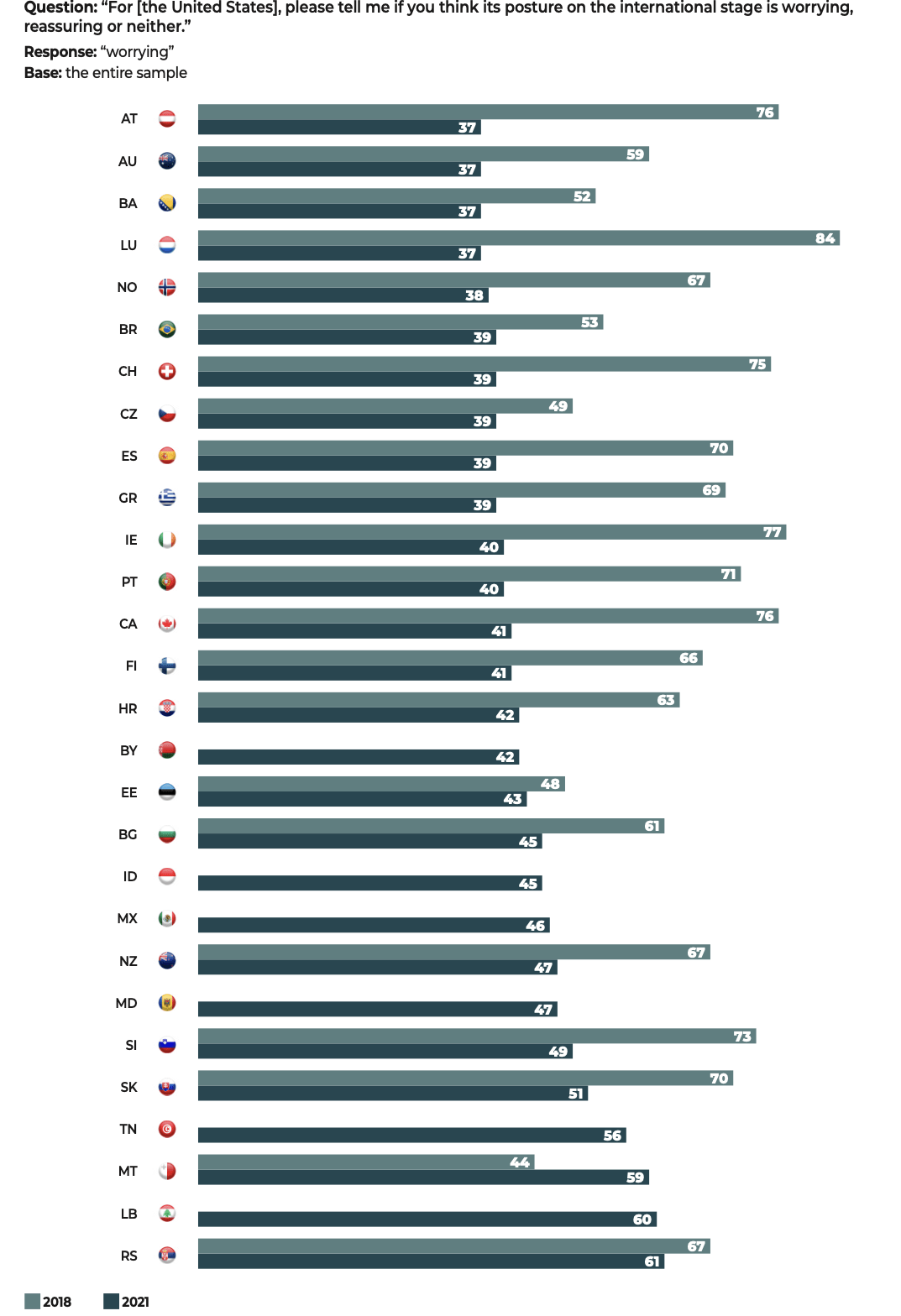
Copyright :
Fondation pour l’innovation politique – January 2022
NATO membership does not ensure the perception of the United States as reassuring
Two-thirds of Americans (65%) consider their NATO membership to be “a good thing”. However, among the member countries of this alliance, not including the United States itself, only a third of those surveyed (32%) think that the posture of the United States is “reassuring”. This number is all the more underwhelming when we consider that the same proportion (32%) considers it to be “worrying”, while 36% find it “neither reassuring nor worrying”. In Eastern Europe, the attachment to NATO is stronger (63%) than in Western Europe (53%). Support for NATO in its member countries in the Western Balkans – Albania, North Macedonia and Montenegro – is higher still (67%).
In the European Union, Eastern countries are more attached to NATO membership than Western countries (in %)
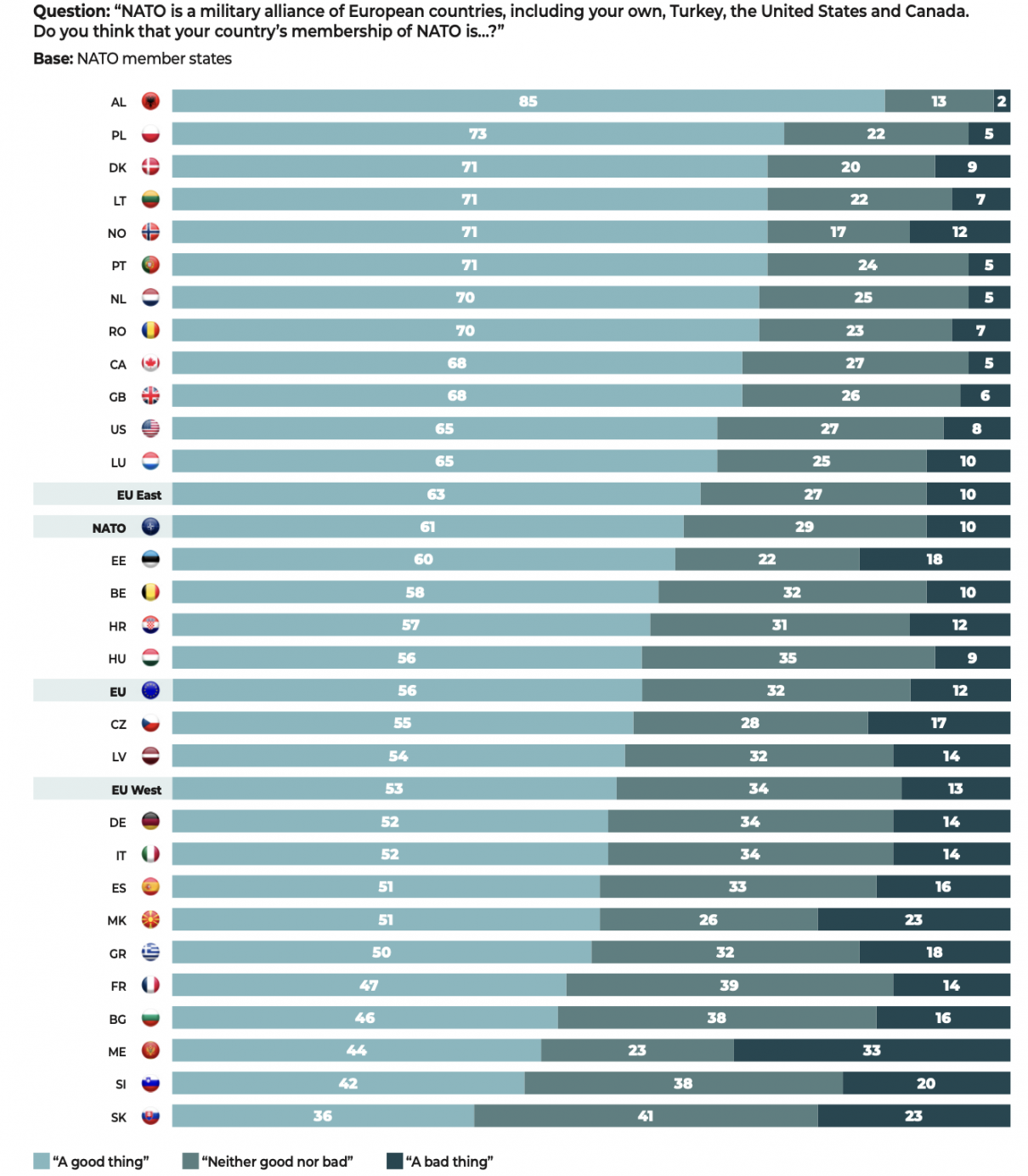
Copyright :
Fondation pour l’innovation politique – January 2022
Fear of authoritarian powers and judgment on NATO membership (in %)
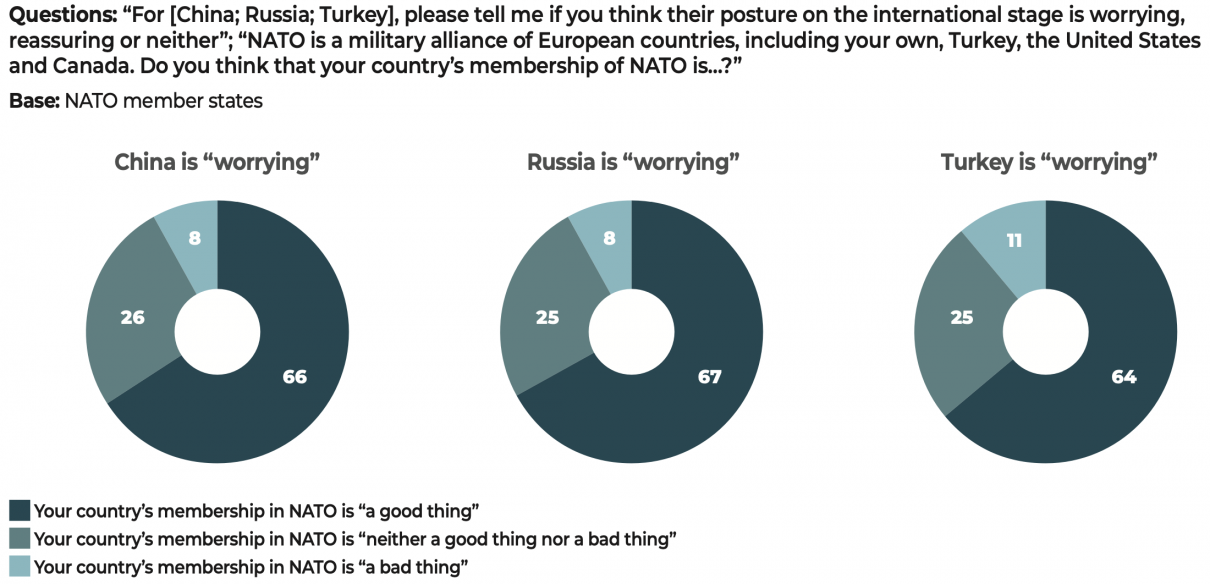
Copyright :
Fondation pour l’innovation politique – January 2022
Memo for the reader: Among those who say they are concerned about China’s attitude on the international stage, two-thirds (66%) think their country’s membership of NATO is “a good thing”.
Federal Election Commission, “Official 2020 Presidential General Election Results”, March 11th 2020, p. 8.
Federal Election Commission, Washington, “Federal Elections 2016. Election results for the U.S. President, the U.S. Senate and the U.S. House of Representatives”, December 2017, p. 10.
| The United States, the world’s premier democracy, has suffered a setback
In the aftermath of Donald Trump’s presidency and Joe Biden’s ascension to the White House, two-thirds of Americans (67%) consider that democracy is working well in their country. This relatively high figure suggests that there are signs of recovery after the legitimacy of Biden’s election was strongly contested by some of the defeated president’s supporters, to the point that they stormed the Capitol on January 6th 2021. The record turnout for the election on November 3rd 2020, when more than 158 million votes were registered1 (compared to just over 136 million in 2016),2 may also be symptomatic of a healthy democracy. The results of our survey nonetheless show that great divisions, among the deepest of any of the countries surveyed, persist within American society. |
In the United States, women, small town dwellers and those with lower incomes are the most critical of the state of their country’s democracy (in %)
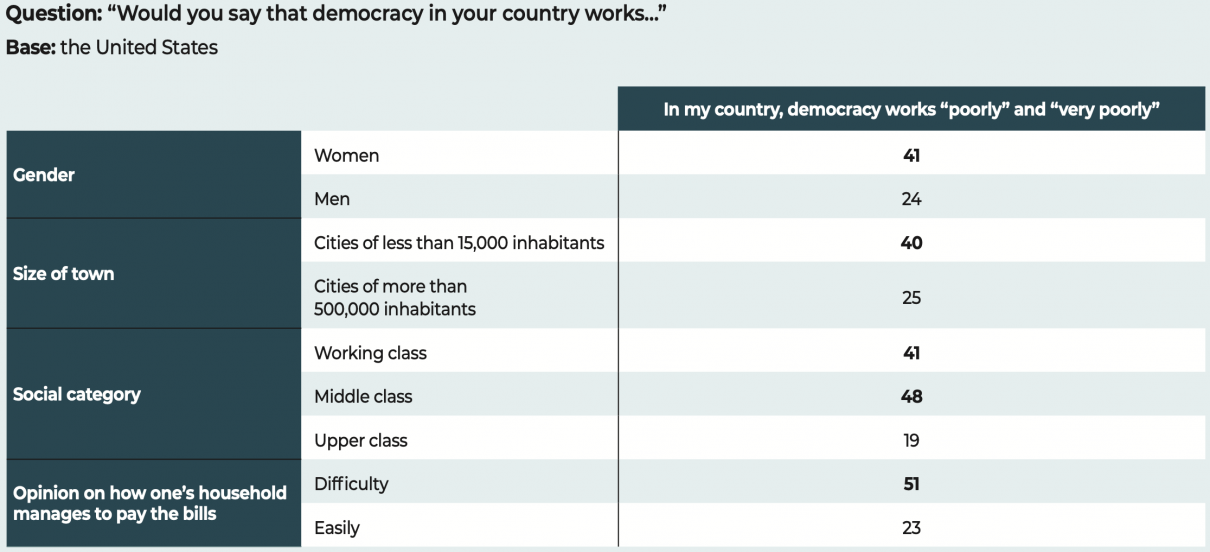
Copyright :
Fondation pour l’innovation politique – January 2022
Public opinion dreads a return to war
See Thibault Muzergues, War in Europe? From Impossible War to Improbable Peace, London: Routledge, 2022.
In the light of ongoing geopolitical upheaval, and in particular the rivalry between China and the United States, a significant number of people fear a return to war.20 Therefore, the prospect “that another World War will break out in the coming years” is considered “likely” by half the people surveyed (50%). Indonesians (66%), Mexicans (60%), Americans (59%), the Lebanese (58%), Australians (57%), Ukrainians (55%), Croats and Cypriots (54%) are the populations that most believe in the possibility of a new global conflict.
Despite the international turmoil, Europeans (EU) remain irenic in their outlook: only 38% of those surveyed believe that another World War is a likelihood in the coming years.
Some countries, despite being geographically exposed to a historically belligerent power, strangely seem to be even less worried. This is the case in Estonia and Finland, Germany, and the Netherlands. On the other hand, half of Greeks and Hungarians and a majority of Romanians and Slovenes fear the outbreak of another World War. The irenicism of Europeans is shared, broadly speaking, by the wider Western world. In NATO member countries, for example, if we include the results from the United States (59%), half of those surveyed (46%) think that the outbreak of another World War is likely in the coming years. However, that figure drops to 38% if we remove the United States from the calculation.
The 9/11 terrorist attacks had not yet happened.
| War in the 21st century
“The terrorist attack on the United States by Osama ben Laden,1 the gas attack on the Tokyo subway by the followers of the Aum sect, and the chaos created by Morris Jr. and his ilk on the Internet, where the degree of destruction is in no way less than that of a war, represent a half-war, a quasi-war, a sub-war, in short, the embryonic form of a new type of war. Whatever name one gives to these new forms of confrontation, they cannot make us more optimistic than in the past, because we have no reason to be optimistic. This is because the reduction of the functions of war in the strict sense does not mean that war no longer exists, because it will not be totally abolished, even in the so-called postmodern, post-industrial era. It will only have reinvested human society in a more complex, more extensive, more hidden and more subtle way. As Lord Byron said in the poem in which he mourns Shelley’s death, ‘Nothing has happened, once the water of the sea has changed and that is all.’ War, which has undergone the transformation of modern technology and the market system, will be made in even more atypical forms. In other words, while we are seeing a relative decrease in military violence, we are at the same time seeing an increase in political, economic and technical violence. Moreover, no matter what form violence takes, war is war, and even if its appearance has changed, it will always obey the same principles.” Qiao Liang and Wang Xiangsui, written January 17th 1999, |
Are democratic societies deluded?
The prospect of a new World War (in %)
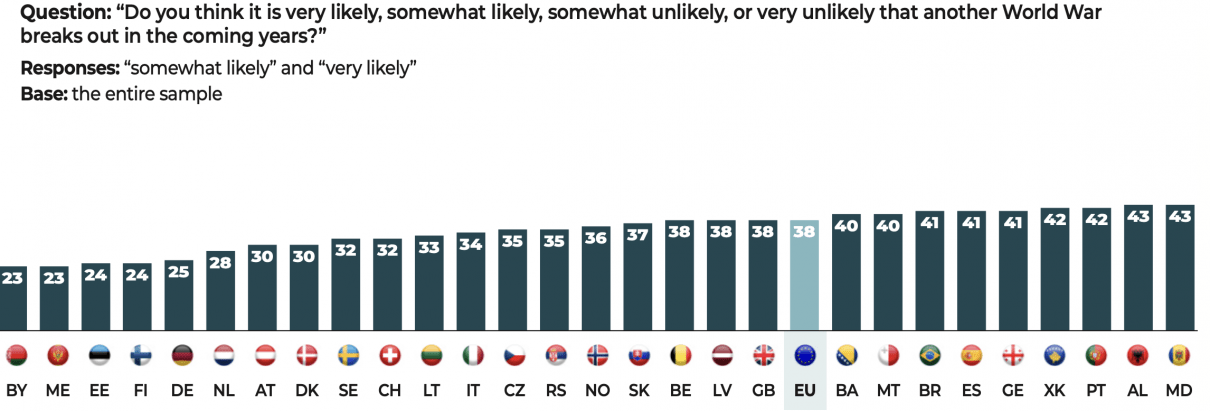
Copyright :
Fondation pour l’innovation politique – January 2022
Who thinks that a new World War is likely? (in %)
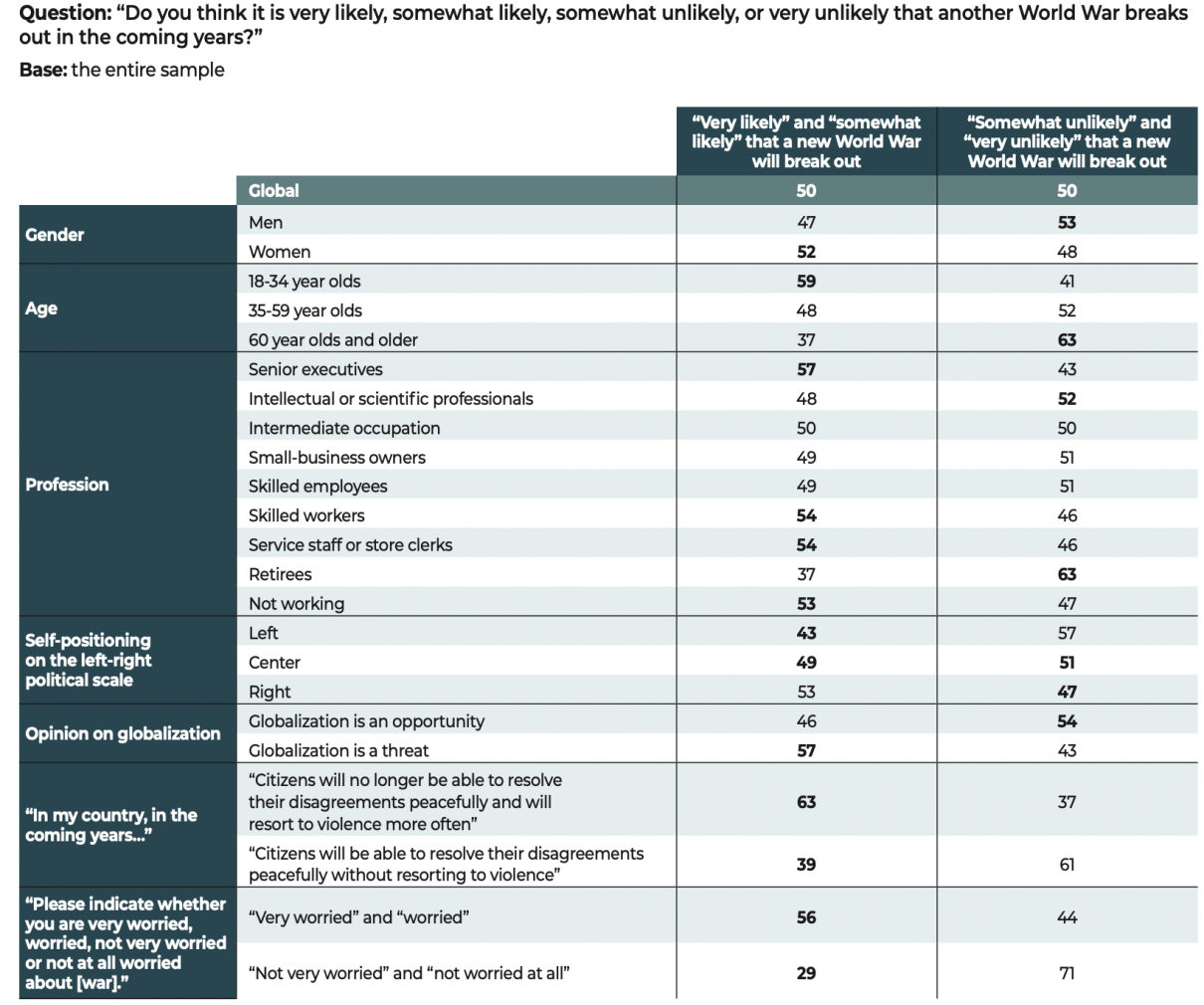
Copyright :
Fondation pour l’innovation politique – January 2022
Are democratic societies deluded?
The prospect of a new World War (in %) – continued
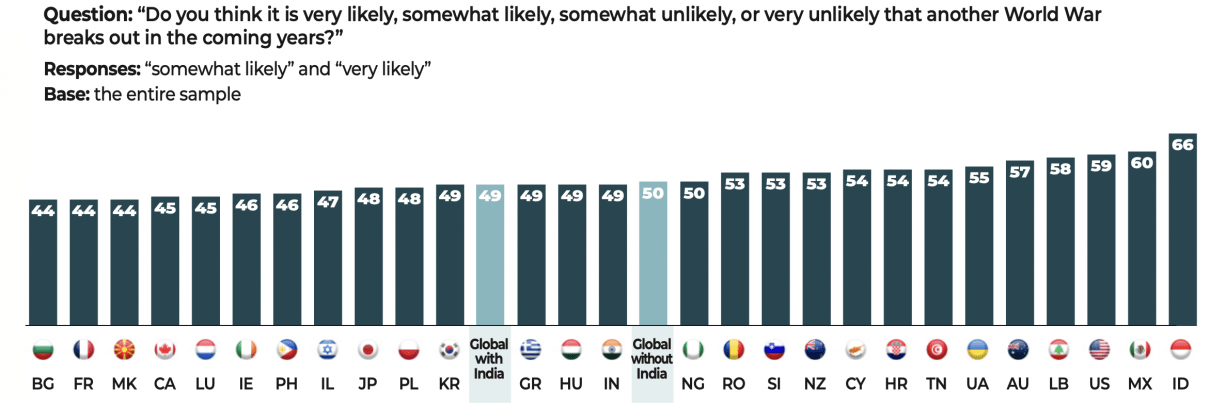
Copyright :
Fondation pour l’innovation politique – January 2022
What are democracies afraid of
At the same time, freedom of speech is being challenged in increasingly multicultural democratic societies. Our sense of social cohesion is being corroded by mutual misunderstandings, distrust and hostility. Intercultural disputes escalate into conflicts over values when the core difference of opinion concerns fundamental freedoms such as freedom of speech or freedom of the press. For example, we need look no further than the tragedies caused by the violent responses to the publication of The Satanic Verses by Salman Rushdie in 1988 and of cartoons in Denmark in 2008, not to mention the attacks on Charlie Hebdo in 2015. This type of terrorism takes the form of an internal war against the values of a liberal society, as was the case for the attacks in Paris and its surrounding region on November 13th, 2015, or in Nice on July 14th, 2016. Not since the 1930s have identity conflicts, populism, authoritarianism, racism and anti-Semitism undermined democratic societies to such an extent.
Without the freedom to debate and publish, the democratic model amounts to nothing. Those freedoms make the model possible, legitimate and effective, since it is liberty that enables human ingenuity to reach its full potential. Yet our century has also seen the emergence of a new transnational and digital public space. The cause of this particular upheaval is not found beyond democratic borders, nor is it foreign or hostile to liberal values. It lies in the remarkable technological innovations developed by companies whose success is made possible by the freedoms they enjoy. However, although they have an extraordinary effect on the number of people participating in the public media space, the power of digital platforms – The Big Five (GAFAM) – is nonetheless problematic. What becomes of democracies if the laws enacted by elected assemblies no longer have the power to regulate our freedoms? What becomes of democracies if the power to guarantee those freedoms stealthily shifts from parliaments into the hands of monopolistic companies?
Cultural diversity seen as a source of insecurity
Climate change, crime, economic crisis, funding of social programs (retirement, health, etc.), government deficits and debt, immigration, Islamism, political extremism, rising cost of living, social inequalities, terrorism, unemployment and war.
See Dominique Reynié (ed.), Islamist Terrorist Attacks in the World 1979-2021, Fondation pour l’innovation politique, September 2021. To carry out this research, we used three types of sources: the information on attacks available via search engines, the cross-referencing of existing databases, particularly the Global Terrorism Database (GTD) and the Armed Conflict and Event Data Project (ACLED), and academic research.
Optimism and pessimism are found in equal measures. When asked “What do you think your country will be like tomorrow?”, more than a third of respondents (35%) replied that their country would be “not as good as it is now”. An average of 36% said their country would be “better than it is now” and 29% said it would be “as good as it is now”. The French are among the least optimistic in this regard, with only 9% believing that their country will be better tomorrow. The Lebanese (10%), Belgians (10%), Finns (12%) and the Japanese (12%) show similar levels of pessimism.
Crime and terrorism top the list of security fears
Among the main sources of fear named in the survey,1 concerns about security issues are very widely shared. A majority of respondents said that they were afraid of crime (89%), overwhelmingly so in Indonesia (96%), Albania, Lebanon and Mexico (97%), and Nigeria and Tunisia (98%).
Fear of terrorism is also globally widespread (83%) among Moldovans and Ukrainians (87%), Bulgarians, the French and Israelis (89%), Indians, the Lebanese and Tunisians (92%), Indonesians (93%), Filipinos (95%), Georgians and Nigerians (96%).
Intercultural conflicts
Large sections of the populations surveyed are afraid of immigration (63%). Immigration is undoubtedly one of the facets of globalization and, as such, it influences responses to several of the questions. For example, concerns about immigration are more widespread among those who consider globalization to be a threat (73%). Concerns about immigration are less common among those who, on the contrary, see globalization as an opportunity, though they remain substantial (58%). Similarly, while the fear of immigration remains most widespread in towns of under 15,000 inhabitants (67%), such concerns remain high in cities of over 500,000 inhabitants (60%) that are more closely associated with globalization.
Islamism and the terrorist threat
Islamism is another widely cited concern (59%). Islamism is associated with a threat to the fundamental values of democratic societies: freedom of the press, freedom of conscience, gender equality, freedom of sexual orientation, tolerance, etc. Of course, Islamism is also associated with the threat of terrorism. At least 48,035 Islamist attacks have been carried out over the last 40 years, resulting in the deaths of at least 210,138 people.2 Between 1979 and 2000, 2,194 attacks and 6,817 deaths were recorded (i.e. 4.6% of all Islamist attacks over the period 1979 to 2021). After the turning point of 9/11, 8,265 attacks were carried out between 2001 and 2012, causing 38,186 deaths (i.e. 17.2% of all Islamist attacks over the period 1979 to 2021). Finally, between 2013 and 2021, with the advent of the Islamic State and Boko Haram, there were 37,576 attacks and 165,135 deaths (i.e. 78.2% of all Islamist attacks over the period 1979 to 2021).
This rise in Islamist terrorism certainly fuels a fear of Islamism within democracies. This sense of fear is at its highest in Israel (86%), Cyprus and France (84%), Bulgaria and the Czech Republic (82%), Belgium (78%), Germany, Austria and Slovakia (76%). In predominantly Muslim countries, this fear of Islamism is prevalent in Nigeria (69%), Tunisia (63%), Indonesia (60%) and Bosnia-Herzegovina (55%). Lebanon (37%) stands as an exception.
| Democracies confronted with the violence of Islamist terrorism
“Terrorist violence mainly affects civilians. Death due to terrorism creates an unbearable sense of permanent vulnerability. People in the democratic world are more traumatized by terrorist violence because they have inherited an irenic culture, a logical consequence of the decline of interstate violence. But democracies are also more helpless because they represent a soft political order based on f reedom and human rights. Inevitably, democracies feel defenseless. A desire for repression, control, surveillance, expulsion and border closure is expressed in the open. It creates a culture of security, even paranoia, which is perpetuated by the inevitable measures designed to reassure much more than to prevent. Through the violence of jihadists, Islam and Muslims are raising irrepressible and growing fears. Fear of the other splits societies, and they end up opposing themselves: a propensity for violence, xenophobia, identity conflicts, and authoritarianism are the result.” “Islamism and populism: a relentless dialectic”, in Dominique Reynié (dir.), |
What are democracies afraid of? (in %)
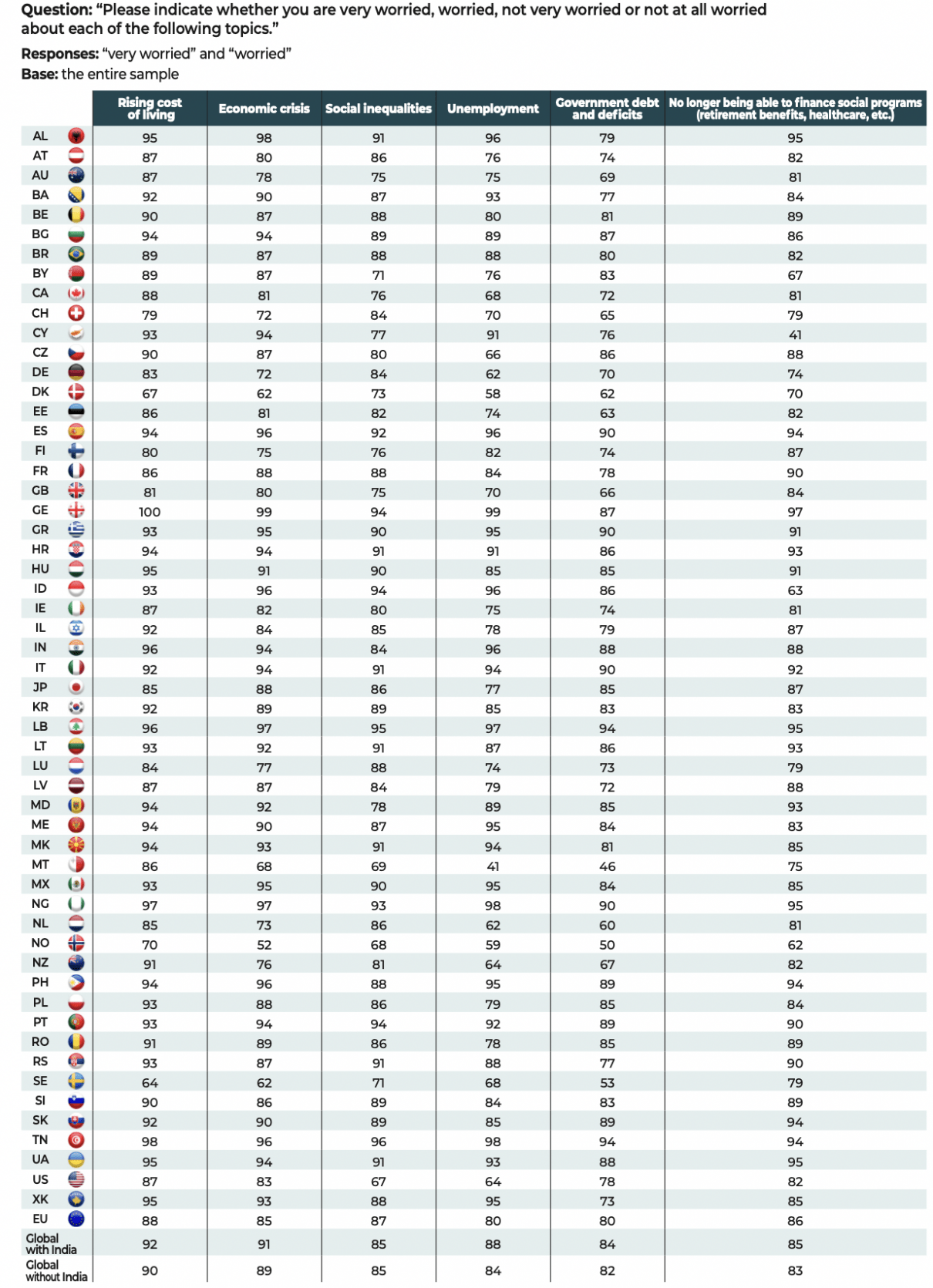
Copyright :
Fondation pour l’innovation politique – January 2022
What are democracies afraid of? (in %) – continued
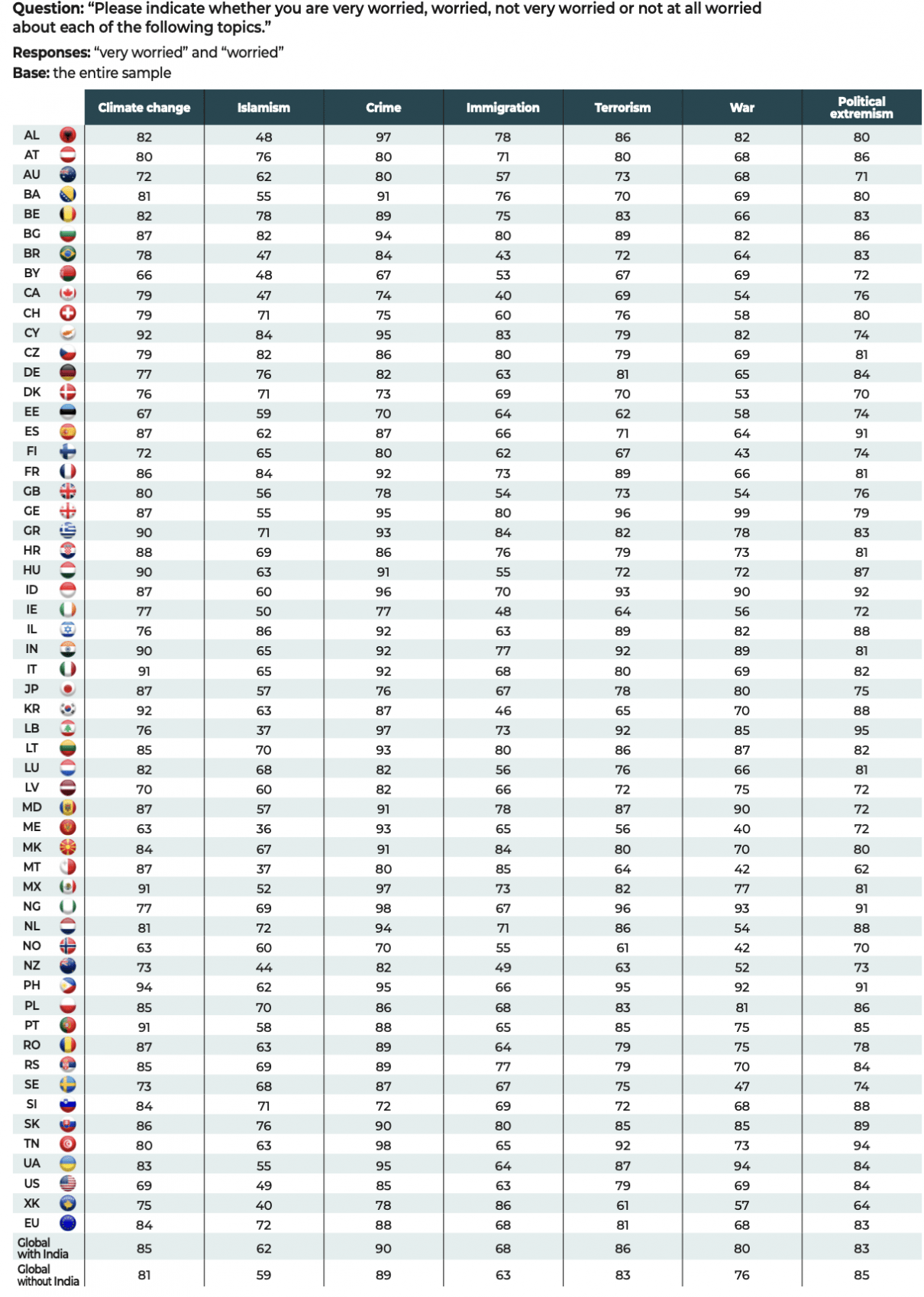
Copyright :
Fondation pour l’innovation politique – January 2022
Will we soon “no longer be able to resolve our disagreements peacefully”?
Democratic societies are undermined by mistrust…
On average, two-thirds (64%) of respondents say that “you can never be too careful when dealing with others”, while only 36% are of the opinion that “you can trust most people”. Distrust of others is more widespread among women (68%) than men (61%), more common among under 35s (67%) than respondents aged over 60 (59%), and also high among respondents with lower incomes (71% of service staff or store clerks) than those with higher ones (53% of senior executives).
Only in Indonesia (63%) and Northern Europe (57% of Finns, 56% of Danes, 55% of the Dutch and 52% of Norwegians) do a majority of respondents claim to trust others, with the exception of Swedes (45%).
… and the fear of “no longer being able to resolve disagreements peacefully”
Although a majority (56%) of respondents think that in the coming years citizens will “be able to resolve their disagreements peacefully without resorting to violence”, a significant minority (44%) chose the other option (“citizens will no longer be able to resolve their disagreements peacefully and will resort to violence more often”). It is worth noting that the Lebanese (76%), the French (71%) and Belgians (61%), who are among the most pessimistic with respect to the future of their own countries, are also the most likely to think that disagreements will lead to violence. On the other hand, in countries where a sense of interpersonal trust is more widespread, those who think that citizens will no longer be able to resolve their disagreements peacefully are in the minority: as is the case for 29% of Norwegians and Danes, and 33% of Finns and Indonesians.
On January 6th 2021, the storming of the Capitol building by supporters of former President Donald Trump, which gravely disrupted the process to certify the results of the presidential election, demonstrated the fragility of the world’s premier democracy. The concept of using violence to promote one’s opinions is by no means absent from democratic societies: one in five respondents (19%) believe that “using violence to defend one’s political opinions can be justified”. In the European Union, 17% of respondents agree. Among the 55 countries surveyed, the highest percentages of people who support this statement were recorded in Kosovo (43%), Hungary (42%), India (33%), Lebanon (31%) and Moldova (30%).
Interpersonal distrust is more prevalent among those who believe that “citizens will no longer be able to resolve their disagreements peacefully and will resort to violence more often” (in %)
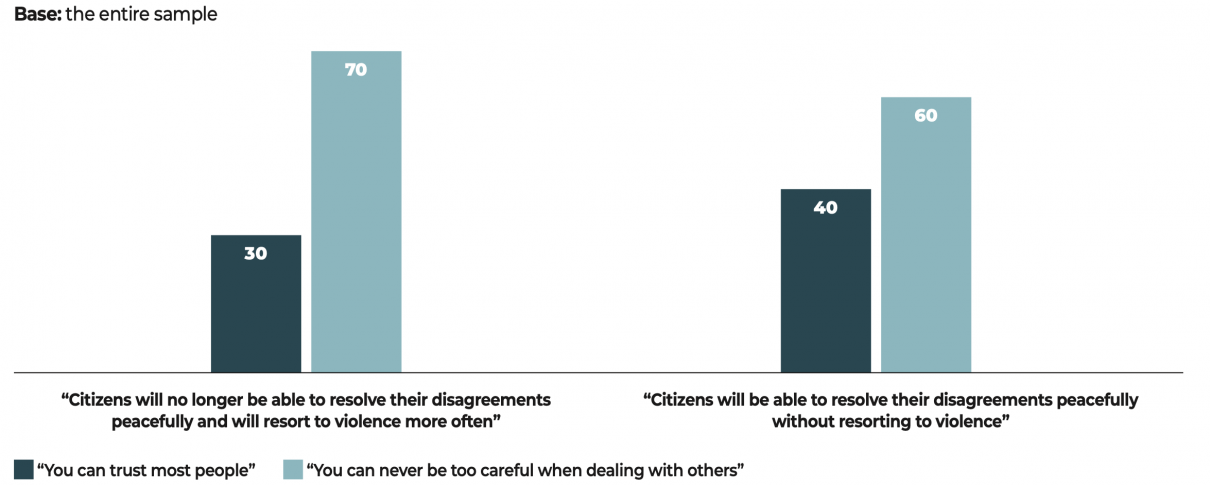
Copyright :
Fondation pour l’innovation politique – January 2022
Memo for the reader: 70% of respondents who think that “citizens will no longer be able to resolve their disagreements peacefully and will resort to violence more often” also indicate that “you can never be too careful when dealing with others”.
See “Banned weapons stoke deadly violence in Nigeria”, france24.com, June 9th 2018.
See Nemanja Rujevic, “Serbia: The land of guns”, Deutsche Welle, December 29th 2016.
See Ondřej Plevák, “Firearm ownership rights embedded into Czech constitution”, euractiv.com, July 23rd 2021.
U.S Government Accountability Office, “Firearms Trafficking. U.S. Efforts to Combat Firearms Trafficking to Mexico Have Improved, but Some Collaboration Challenges Remain”, January 2016.
Katy Watson, “Jair Bolsonaro and guns: A US culture war raging in Brazil”, bbc.com, November 15th 2021.
Half of respondents (47%) support the right to own a firearm for self-defense
Half of respondents (47%) are in favor of the “right to have a firearm in one’s home for self-defense”. This opinion is more widely shared by men (52%) than women (43%) and is more commonplace among under 35s (52%) than over 60s (40%). Of course, the major differences in opinion registered on this subject between countries and groups of countries tend to reflect their different legal frameworks: for example, while a third (32%) of respondents in the European Union want the right to own a firearm, that proportion rises to 84% in the United States, where that right is guaranteed by the Second Amendment to the Constitution.
Although gun ownership is limited to licensed gun owners by law, there is broad support for the right to bear arms in Nigeria (76%). However, such a viewpoint does not have the same meaning in a country governed by the rule of law as in a country with endemic gun violence. Nigeria is a fragile state that has suffered from the flow of arms arriving from countries such as Chad and Libya, fueled in part by the Boko Haram insurgence since 2009. In 2018, the United Nations Regional Centre for Peace and Disarmament estimated that “more than 350 million small arms and light weapons (pistols, assault rifles, semi-automatic weapons, etc.)” were circulating in Nigeria.3
In Serbia, more than two-thirds (68%) of those surveyed are in favor of the right to have a firearm in one’s home for self-defense. Following the breakup of Yugoslavia, most of the weapons used in the wars of the 1990s remained in circulation, mainly in Serbia, the country with the second highest number of guns per capita after the United States.4
In July 2021, the Senate in the Czech Republic approved the inclusion in the constitution of the right to use arms to defend oneself and others under legal conditions, in response to the European Union’s pro-regulatory stance on firearms acquisition and possession of firearms.5 Two-thirds (64%) of Czechs support the right to own a firearm.
The Mexican government is fighting to prevent the proliferation of firearms in a country beset by violence. Mexico suffers greatly from weapons that are smuggled in by drug cartels, particularly from the United States.6 A large majority of Mexicans (61%) support the right to own a firearm.
Lastly, Brazilian society is divided on the issue: 48% of the Brazilians surveyed are in favor and 52% are opposed. Honoring his electoral pledge, President Jair Bolsonaro has taken various measures to promote the right to bear firearms since the beginning of his mandate. The number of weapons in circulation in the country increased by 70% in 2020.7
Younger generations seem to be bracing themselves for a more violent world (in %)
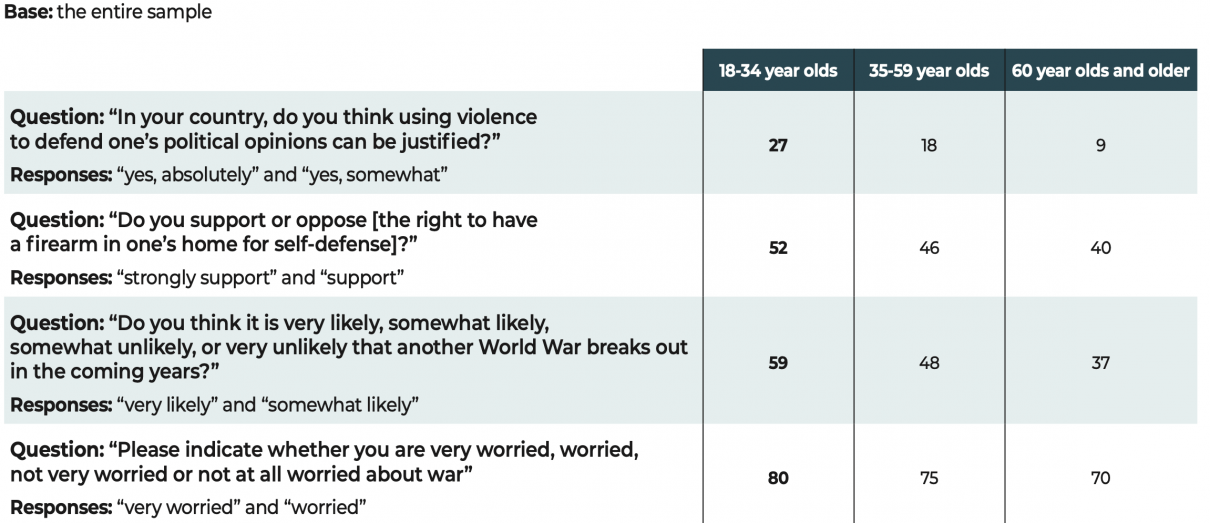
Copyright :
Fondation pour l’innovation politique – January 2022
Should we be given the right to own a firearm in our homes for self-defense? (in %)
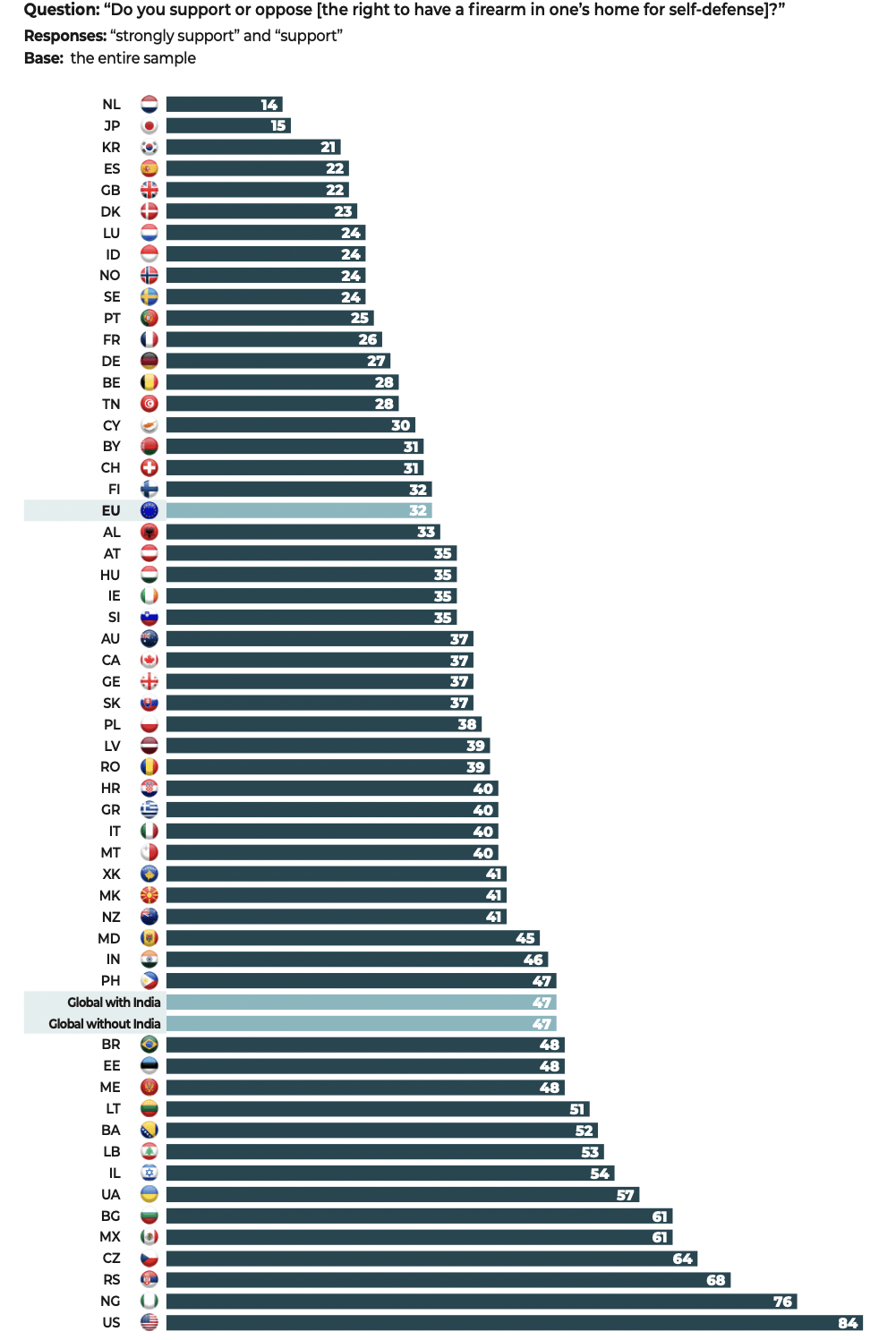
Copyright :
Fondation pour l’innovation politique – January 2022
Concern about the risk of economic downgrading
Democratic societies are more afraid of personal difficulties in the immediate future than they are of a Third World War. This may be one of the consequences of the Covid-19 pandemic, which appears to have put progress made in terms of development at risk and which has exposed the unsuspected fragility of health systems. Furthermore, for the first time since the late 1990s, global poverty is on the rise. Inevitably, such an outlook is cause for public concern. The rising cost of living (90%) is at the top of the list of public concerns, just ahead of economic crisis (89%) and crime (89%). A similar number of respondents fear social inequality (85%) and unemployment (84%).
Economy: the most worried countries… (in %)

Copyright :
Fondation pour l’innovation politique – January 2022
…the least worried countries (in %)

Copyright :
Fondation pour l’innovation politique – January 2022
| Pandemics and historical upheavals
“In addition to its potential as a selective agent operating upon intrinsic biological factors, the Black Death might also have shaped population patterns by severely altering exogenous factors that affected health and demography. Historical documents from the post-Black Death period indicated that standards of living improved after the epidemic, at least in some areas of Europe such as England. These changes in standards of living resulted in large part from the massive depopulation caused by the Black Death, which reversed the pre-epidemic conditions of an excess population relative to resources. After the Black Death, there was a severe shortage of laborers, effectively ending the medieval system of serfdom, and consequently wages improved dramatically while prices for food, goods, and housing fell. These changes represented a major redistribution of wealth. Real wages rose to levels that were not exceeded until the 19th century, which allowed for improvements in housing and diet for people of all social status levels. In England, for example, grain prices dropped steeply after 1375 and generally remained low for almost a century and a half thereafter. Though it took several years for real wages to rise in England in the aftermath of the Black Death (in fact, they may have actually dropped in the period immediately after the epidemic), by the late 14th century real wages had risen sharply to their medieval peak. By the late 15th century, real wages were at least three times higher than they had been at the beginning of the 14th century.” Sharon N. DeWitte, “Mortality Risk and Survival in the Aftermath of the Medieval Black Death”, |
Overall, the rising cost of living is a greater cause for concern than climate change (in %)
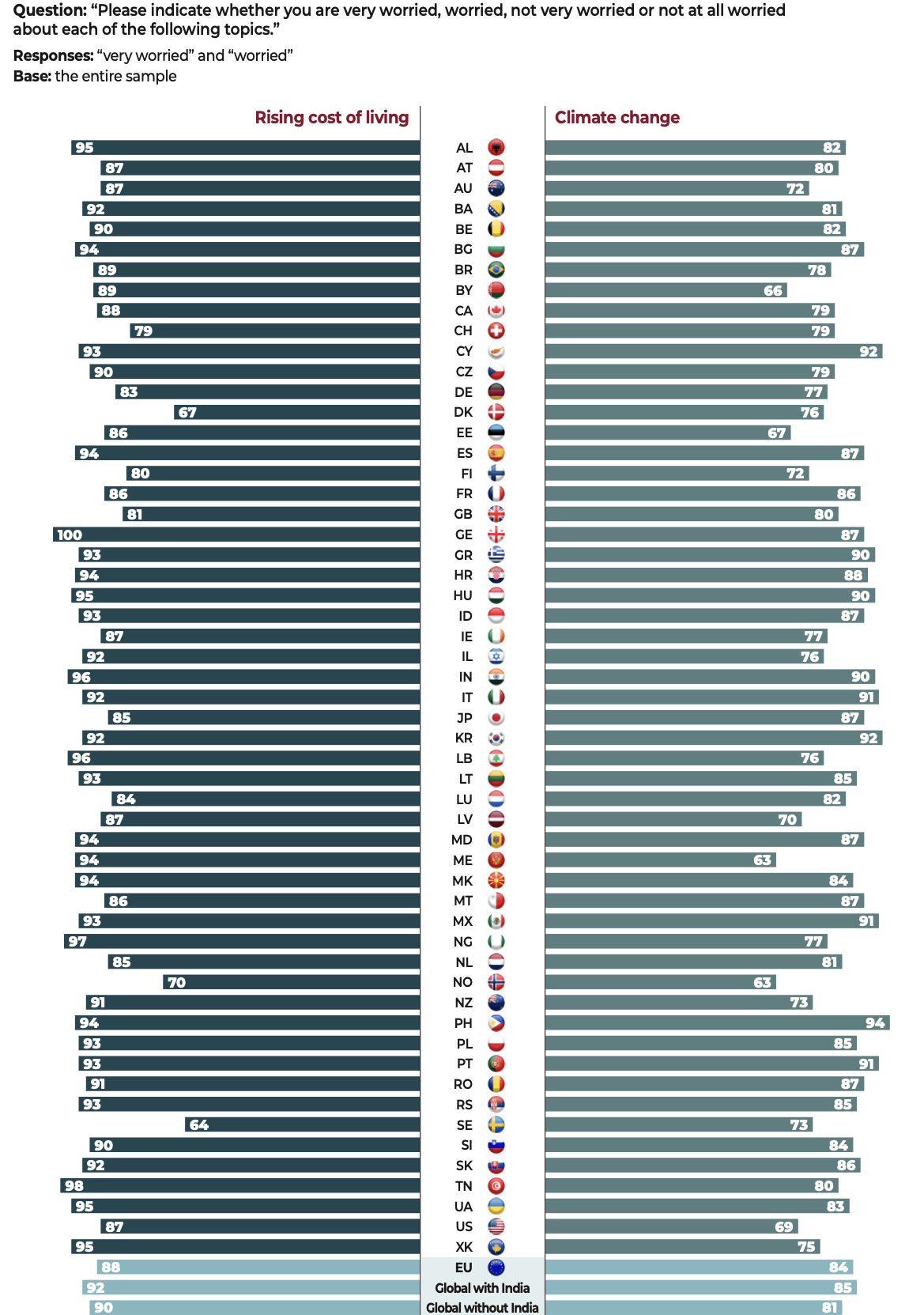
Copyright :
Fondation pour l’innovation politique – January 2022
Manipulation of information and foreign interference
See Gregory Winger, “China’s Disinformation Campaign in the Philippines”, thediplomat.com, October 6th 2020.
Democratic societies’ naivety is outlined by the fact that most respondents (88%) condemn the disruption of electoral campaigns by foreign powers using the Internet and social media. The number of such incidents has risen sharply in recent years. In addition to Russia, Turkey and Iran, China is also trying to influence elections. The Philippines was the target of a Beijing-led disinformation and influence campaign on the Facebook platform that supported Rodrigo Duterte’s presidential bid in 2016. China continued to interfere in Filipino politics until, in September 2020, Facebook removed the accounts from which this disinformation campaign was being conducted.8 Of all the populations who took part in our survey, Filipinos are the most worried about foreign powers interfering in their election campaigns (96%).
The emergence of a transnational digital public space represents both an opportunity and a challenge for the democratic world. Our survey shows that the decline of the traditional media (press, television and radio) stems from their failure to fulfil certain expectations related to information and communication services and capacities: accessibility, sociability, range of choice, permanence of information, price, etc. This is why social media platforms have been so successful. They have proved capable of meeting and satisfying these expectations. This is why the public have such mixed opinions about them. They enable foreign interference in electoral campaigns but they also contribute to a form of public emancipation. Therefore, on the one hand, social media are looked upon unfavorably by an overwhelming majority, who believe that they “are bad because they facilitate the spread of false information” (73%); on the other hand, they are also considered to be “good because they help people get informed” (83%).
Public ambivalence towards social media (in %)
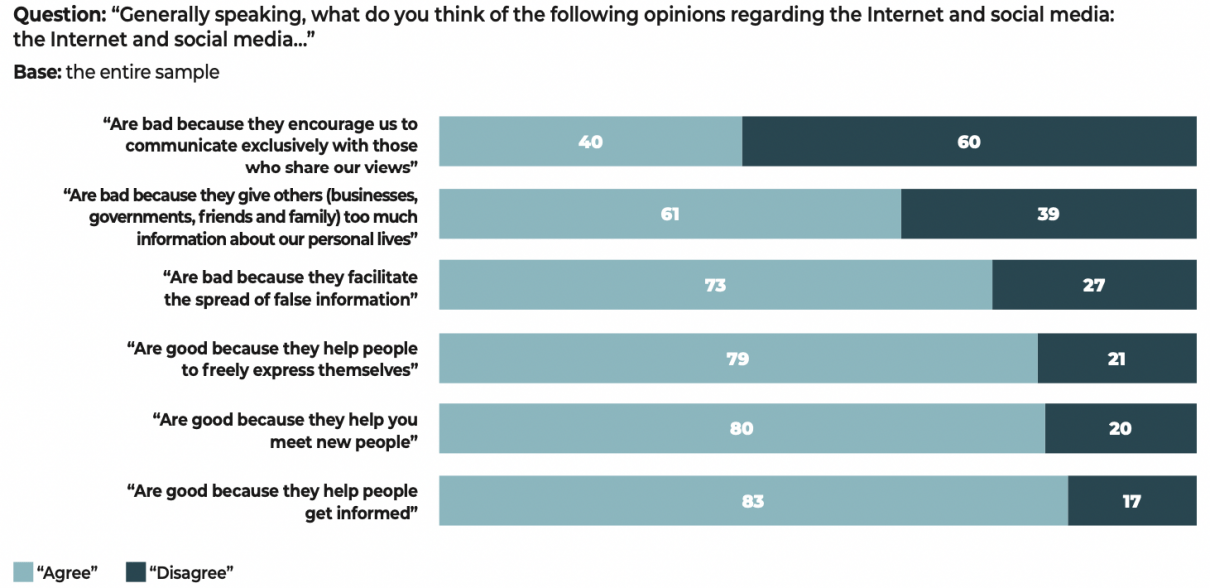
Copyright :
Fondation pour l’innovation politique – January 2022
Memo for the reader: To the question “Generally speaking, what do you think of the following opinions regarding the Internet and social media: the Internet and social media…”, 61% of respondents “agree” with the idea that they “are bad because they give others (businesses, governments, friends and family) too much information about our personal lives”.
Fear of interference by foreign powers in election campaigns is massive (in %)
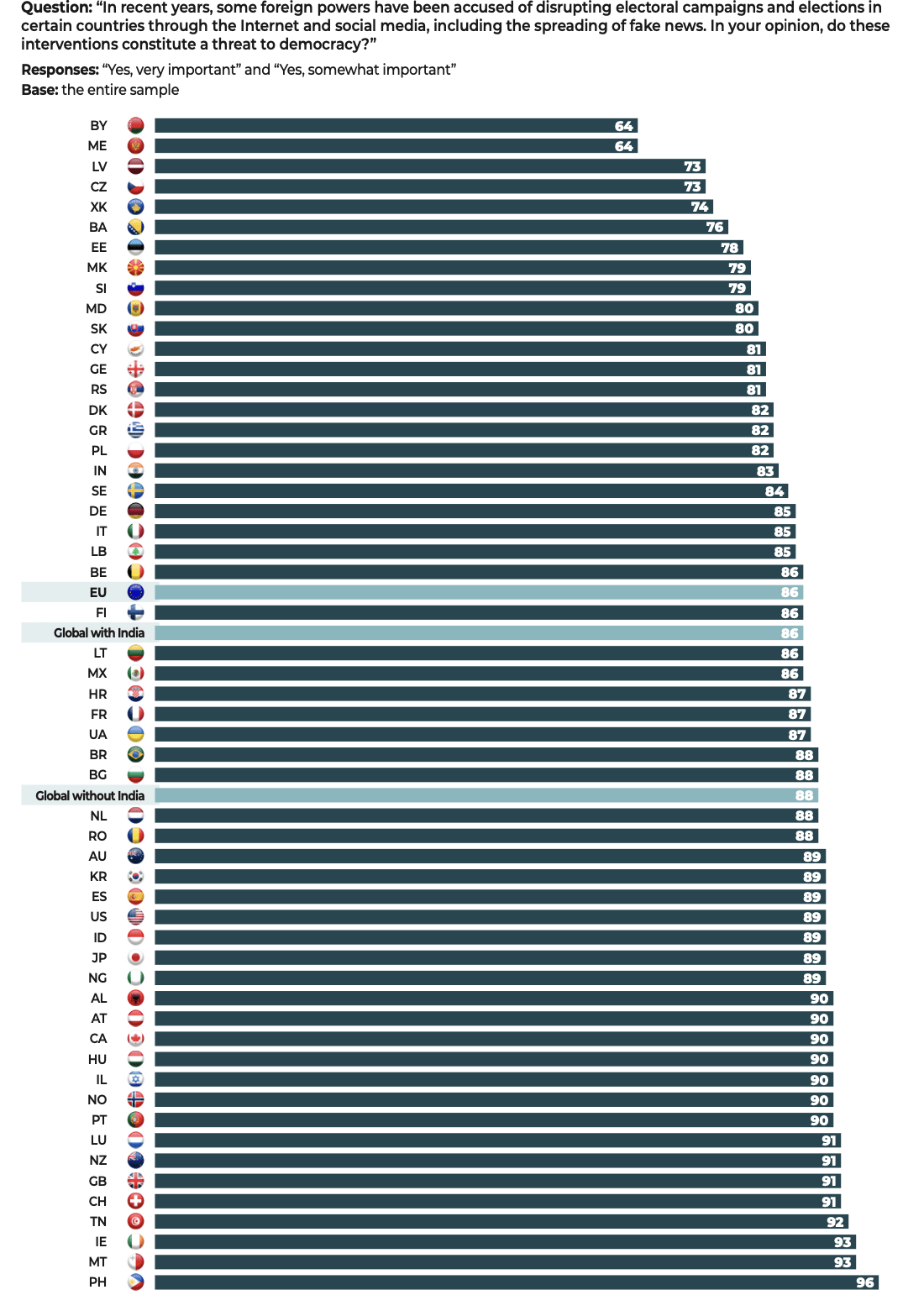
Copyright :
Fondation pour l’innovation politique – January 2022
Overall, three-quarters of respondents (73%) believe that Big Tech – or the GAFAM – have too much power in terms of information and public debate and that their governments should be able to control them more. Although no tech giant originated in the European Union, most of its citizens (79%) agree with this opinion. This opinion is particularly widespread among Austrians, Belgians, the Dutch, Finns, the French, Germans, the Irish, Luxembourgers and Spaniards.
However, the level of demand for increased regulation is also similar to or higher than the global average (73%) in the United States (70%), home of Big Tech, and countries in the Anglosphere such as Australia (83%), the United Kingdom (83%), New Zealand (81%) and Canada (74%). Democratic societies show no interest in surrendering the new benefits that the advent of social media has brought them, but nor will they disregard the pressing need for public regulation.
Europeans enjoy the benefits of social media, but demand greater regulation (in %)
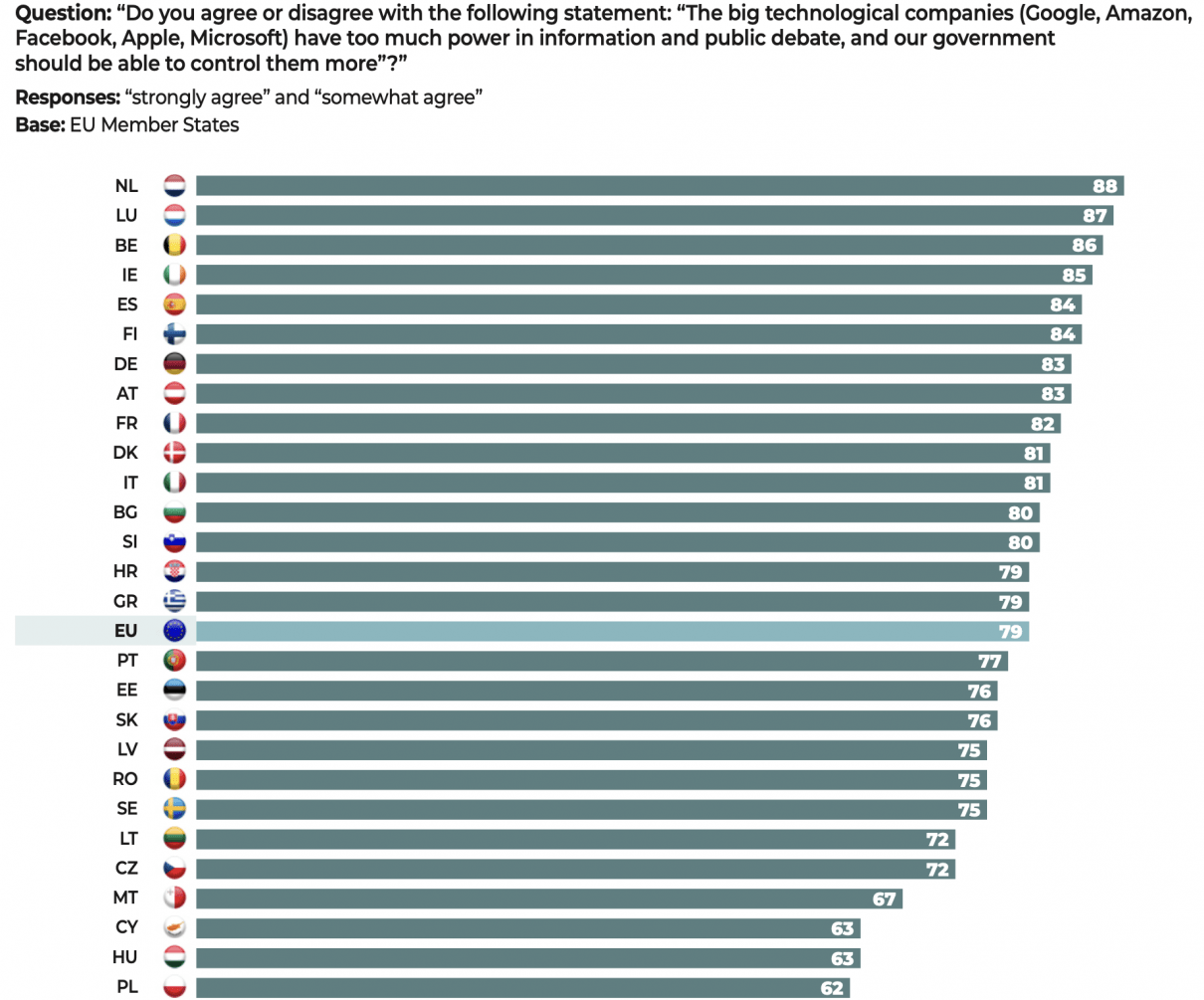
Copyright :
Fondation pour l’innovation politique – January 2022
| The Irish and Luxembourgers are also in favor of public regulation of GAFAM
Facebook and Google have set up in Ireland, while Amazon has installed its European headquarters in Luxembourg. However, most respondents in Luxembourg (87%) and Ireland (85%) consider that Big Tech has too much power in information and public debate and that their governments should be able to control them more. Those majorities are much higher than the global average (73%) and even the average for European Union countries (79%). |
In a fragile democratic world, attachement to the European Union is growing stronger
Democracies today find themselves in a perilous situation, 30 years after the fall of the Berlin Wall signaled their moment of triumph. In an interview given in the spring of 2020, the man who would become president of the United States of America, Joe Biden, pointed out that not only has democracy stopped spreading but that it is actually in retreat: “Today, democracy is under more pressure than at any time since the 1930s. Freedom House has reported that of the 41 countries consistently ranked “free” from 1985 to 2005, 22 have registered net declines in freedom over the last five years. Not even the most apparently robust democratic blocs have been invulnerable to this process of regression. Such is the case in the European Union, where elected governments are challenging the rule of law while claiming to be inspired by “illiberal democracy”. The abolition of the European Union is a key aspect of the program cited in this rhetoric of dissent. In principle though, the European Union as a concept and institution is one of the most elaborate responses that nations have implemented to alter the scope of their power. Allegations that the European Union is not democratic are paradoxical, since the intention of this “ever closer union” is precisely to adjust the scope of democratic nations’ power to a global scale. As such, the election of the European Parliament by universal suffrage, which has been in place since 1979, and the creation of European citizenship in 1992 are indicative of post-national democratic politics. Such steps made the European Union the first transnational political organization in democratic history to boast an assembly elected by universal suffrage and is still the only such example. How can this venture be considered as anything other than the first serious attempt to revive the concept of democracy and incorporate its model of government by citizens’ consent within a framework compatible with globalization?
Public opinion and the European idea
See Dominique Reynié (ed). Democracies Under Pressure, vol. I: “The issues” and vol. II: “The countries”, Fondation pour l’innovation politique/ International Republican Institute, 2019 (both volumes can be downloaded from fondapol.org/en), and Id., What next for democracy? An international survey by the Fondation pour l’innovation politique, Plon, 2017. Unlike the last two measurements from 2018 and 2021, the average figure for the European Union in 2017 did not include data for Cyprus, Ireland, Luxembourg, Malta or Slovenia, as the demographic weighting of these countries was still negligible in relation to the whole of the European Union. In addition, the average European Union figures for 2017, 2018 and 2021 do not include the United Kingdom as a result of the June 2016 Brexit referendum.
A majority of the Europeans (EU) surveyed (52%) see their country’s membership of the European Union as “a good thing”. This is 3 points higher than in our 2018 survey (49%) and 7 points more than in 20171 (45%). Only a minority (18%) believe that their membership is “a bad thing”, and a third (30%) that it is “neither good nor bad”. After initially struggling to adopt an effective response, the development of a joint vaccination policy during the coronavirus crisis has not only maintained but strengthened the level of attachment to the European Union, as did the historic recovery plan. While the EU might sometimes seem abstract or intangible, the health crisis has shown it in a new light, leading to more favorable views.
Attachment to the European Union in 2017, 2018 and 2021 (in %)
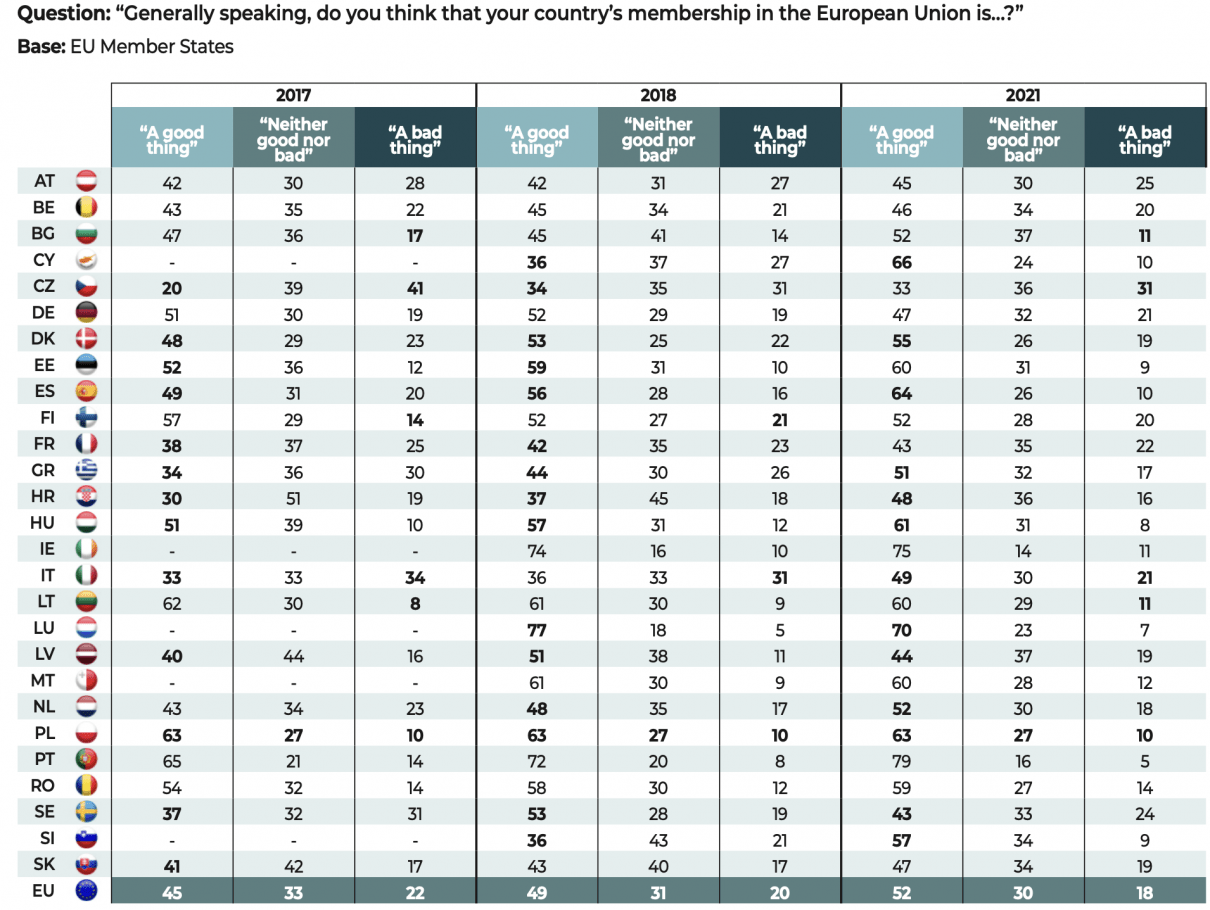
Copyright :
Fondation pour l’innovation politique – January 2022
Support for the euro is keeping the populist surge at bay
The level of attachment to the European Union must also be assessed in light of its citizens’ views about the European currency. Citizens see the euro as a protector of their assets, which would be put at risk by a return to their national currencies. Support for the euro is therefore founded on an advantage that has been well understood. Anti-euro rhetoric, which has long been adopted by populists, is now perceived as a threat to the material assets owned by Europeans – so long as the euro remains strong. Illustrating this, two-thirds of Eurozone citizens (64%) say that they want to keep the European currency. One in four (28%) would prefer to switch back to their national currency but believe that this would not be possible. Only a small minority (8%) believe that it would be both preferable and possible to abandon the euro. As already seen with our previous two surveys from 2017 and 2018, support for the European currency is stronger than support for the European Union itself in most Eurozone countries.2 In 2021, the opposing opinion is only seen in Cyprus, Lithuania and Portugal.
While support for the euro is strongest among respondents who believe that their standard of living has improved (72%), it is still significant for those who consider that their standard of living has declined (51%).
Support for the euro is stronger than for the European Union (in %)
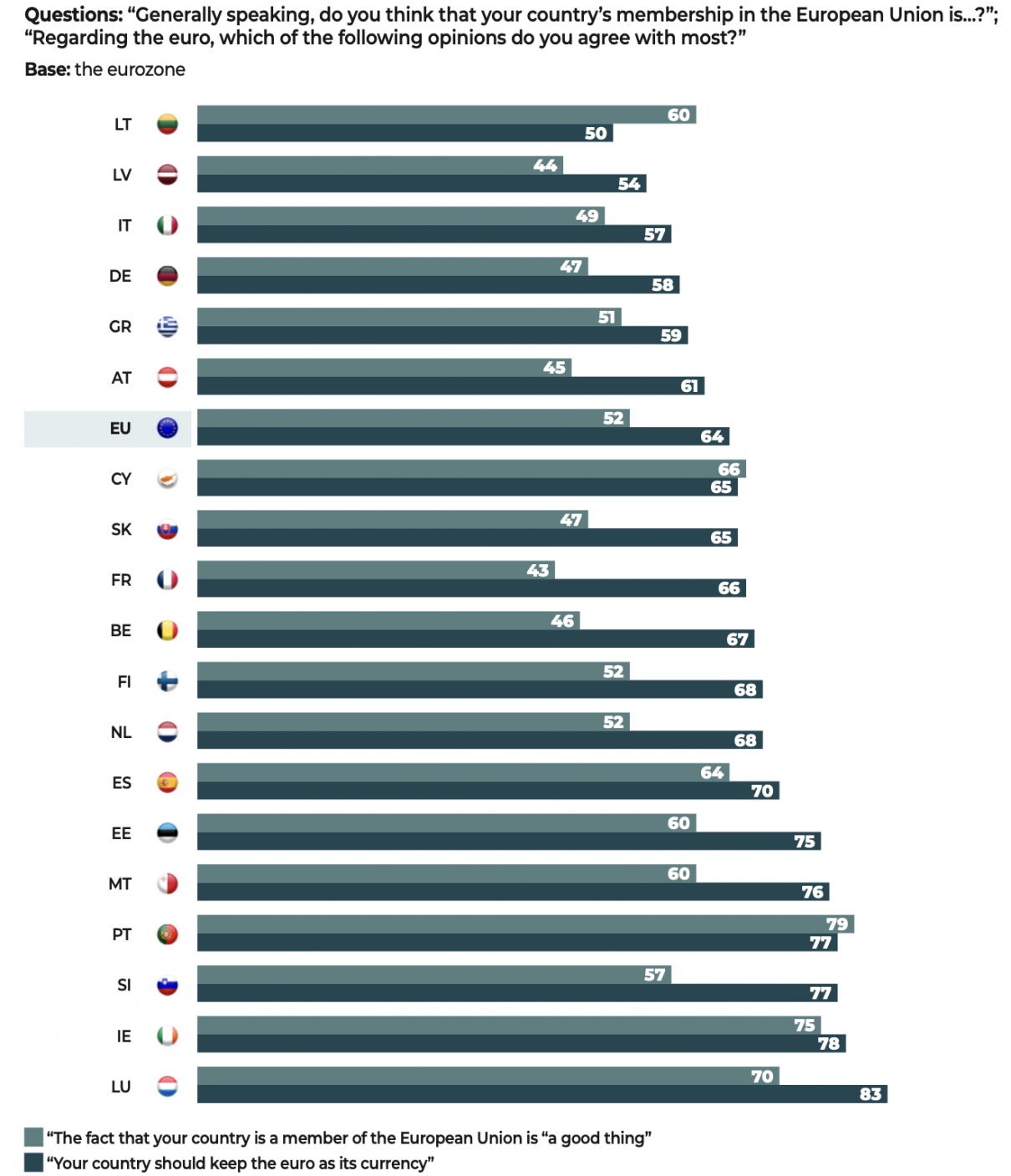
Copyright :
Fondation pour l’innovation politique – January 2022
Attachment to the euro remains high across the different socio-demographic groups (in %)
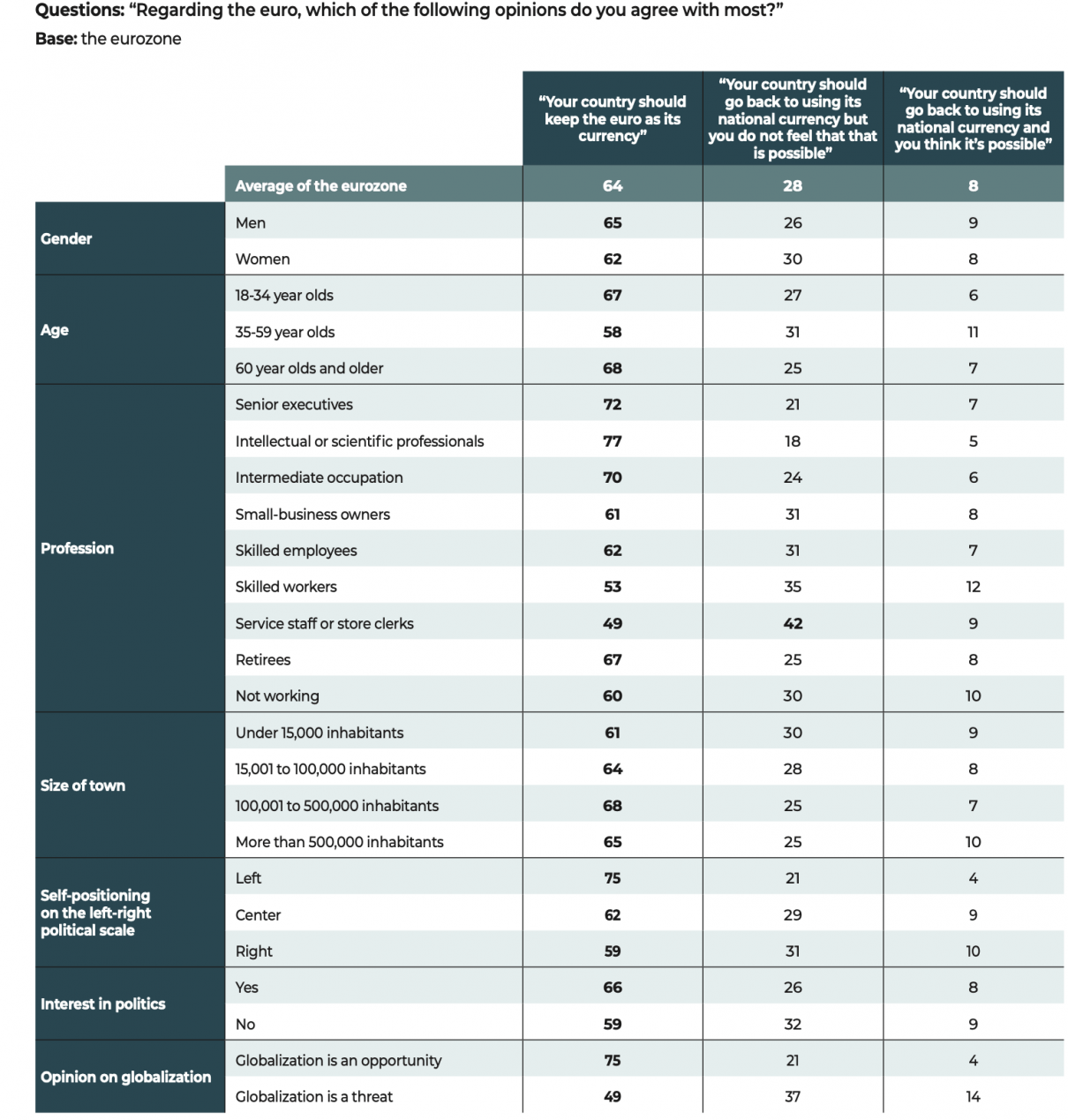
Copyright :
Fondation pour l’innovation politique – January 2022
Europeans trust European institutions more than national ones
Within the European Union, levels of trust in the European Commission (47%) and European Parliament (47%) are relatively high considering the discredited status currently surrounding political institutions. This result is all the more striking if we compare it with the national institutions in Member States: on average, 41% of Europeans (EU) said that they trust their national government, while 44% trust their national parliament. In each country, we observed comparable levels of trust in the European Commission and European Parliament. In France, one of the countries with the lowest levels of trust in European institutions, the same pattern can be observed: 41% of respondents trust the European Commission and the European Parliament.
Trust in the European Commission exceeds trust in national governments… (in %)
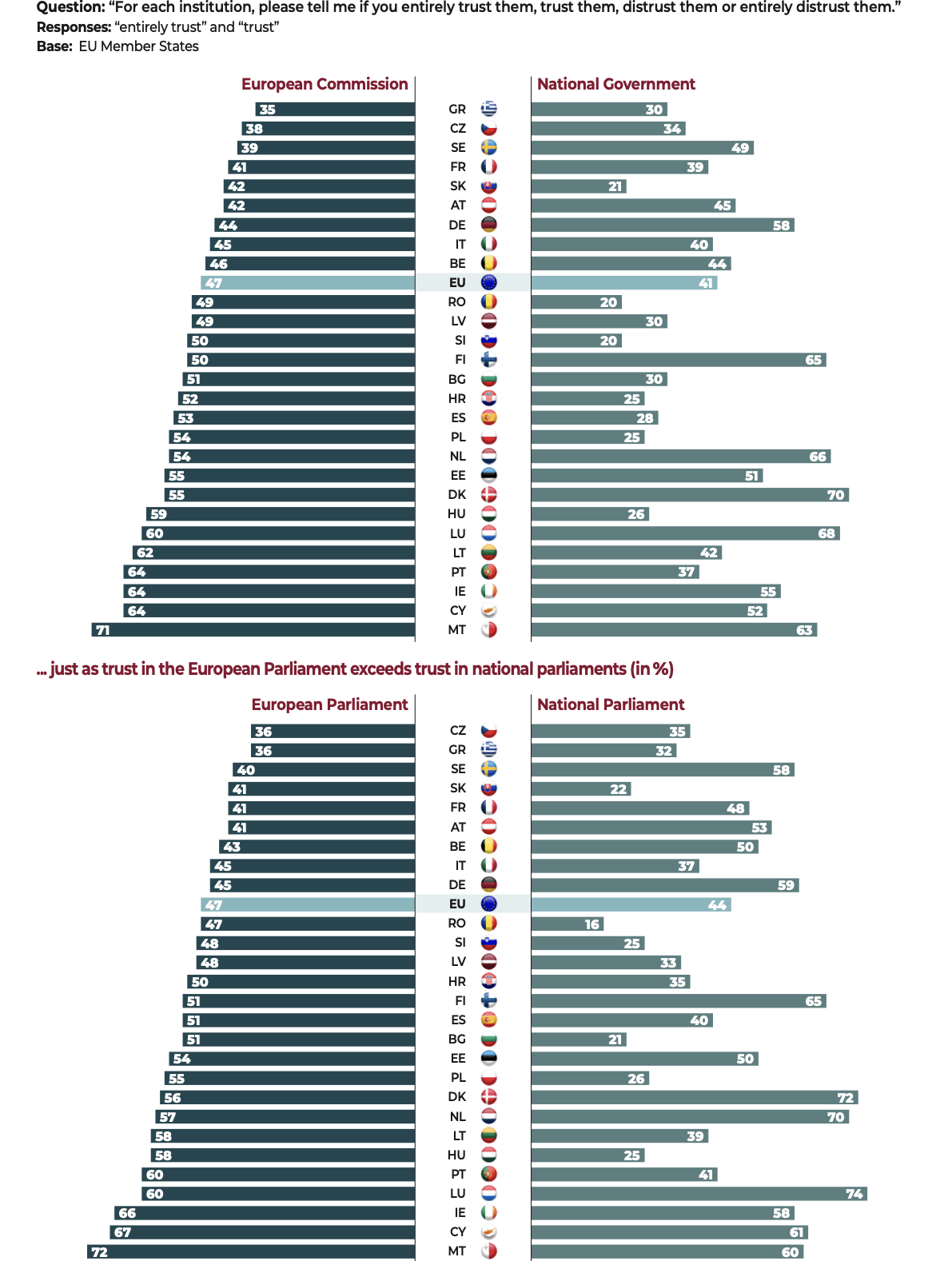
Copyright :
Fondation pour l’innovation politique – January 2022
Within the European Union, while populations from Eastern Europe have the most trust in European institutions, they also have the most distrust in their own national institutions. This lack of trust particularly stands out when they are asked about the greatest threats to democracy in their country. In the Western EU, around one in five (18%) respondents identified their own government, with this figure rising to 44% for Eastern European countries. The levels of trust in European institutions indicate that the European Union is perceived by some as a way of protecting democracy in the face of their national governments’ authoritarian drift.
In Eastern Europe, more people view their national government as a threat to democracy (in %)

Copyright :
Fondation pour l’innovation politique – January 2022
Europeans are divided about the effect that the European Union has on their democracy (in %)
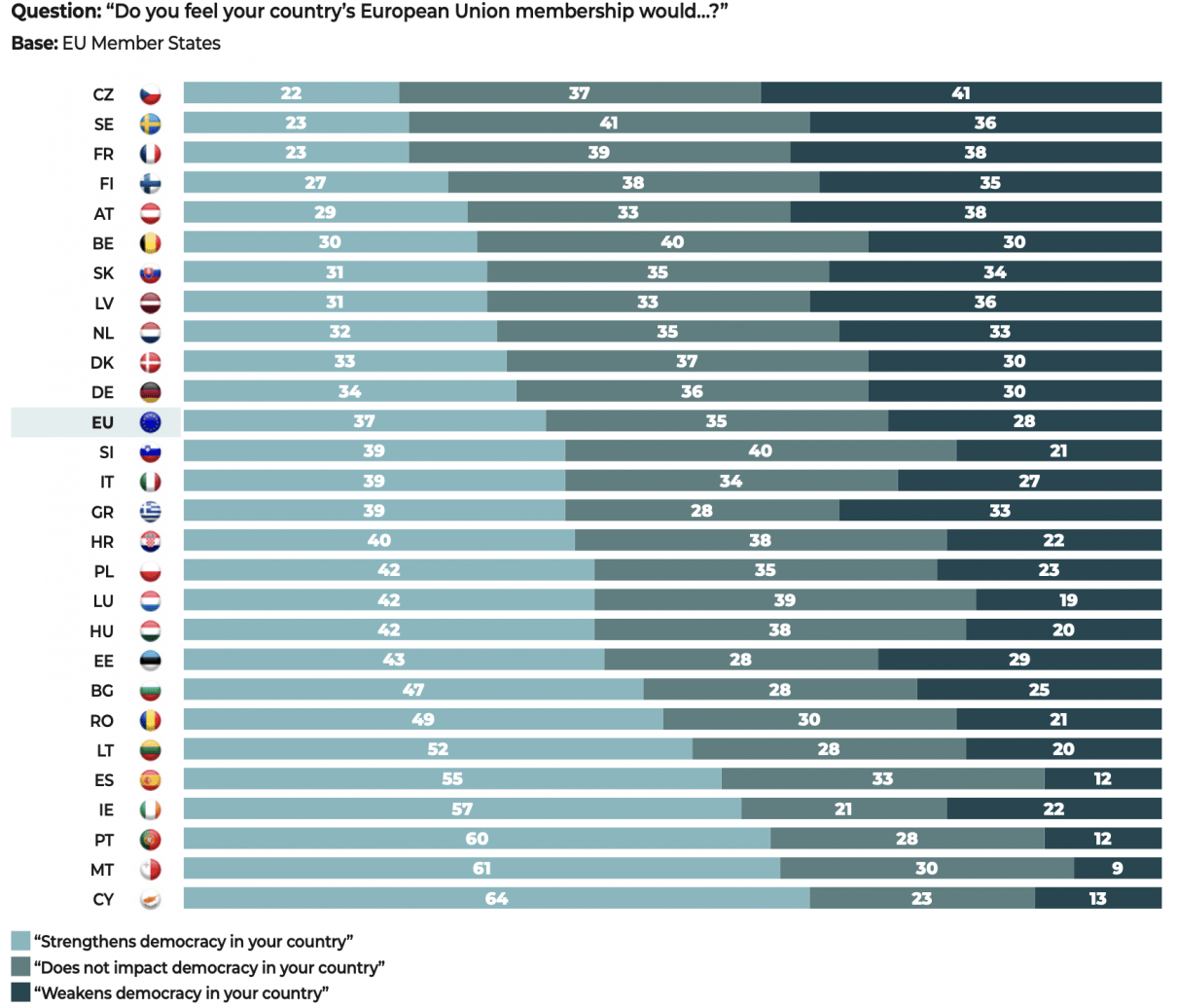
Copyright :
Fondation pour l’innovation politique – January 2022
The Western Balkans: between European aspirations and weariness
Contrasted aspirations for European Union membership
In the Western Balkans, a majority of respondents view their country’s potential ascension to the European Union as a good thing (54%). Meanwhile, 29% believe that it is “neither good nor bad”, while 17% see it as “a bad thing”. The results show significant contrasts between the various countries. While most Albanians and Kosovars are positive about their accession to the European Union, only one in two Macedonians and one in three Serbians share this opinion. In Bosnia and Herzegovina, the country’s ethnic partition may be a significant factor behind this: respondents living in Serbian regions, such as Republika Srpska, are more negative about potentially joining the European Union: 40% believe that this would be “a good thing”, while 18% see this as “a bad thing” and 42% replied “neither good nor bad”.
Aspirations for European Union membership in the Western Balkans (in %)

Copyright :
Fondation pour l’innovation politique – January 2022
The expected effects of European Union membership on democracy in the Western Balkans (in %)

Copyright :
Fondation pour l’innovation politique – January 2022
A region coveted by authoritarian powers
Serbia is the country with the most negative perception of its accession to the European Union, even though it is one of the Western Balkan states to have made the most progress with its accession negotiations: 39% of Serbians said that they are concerned about the European Union’s posture on the international stage, while reaffirming their cultural and historical affinity with Russia, which the majority view as reassuring (56%).
Turkey is seen as reassuring by 40% of Albanians, 45% of Montenegrins, 48% of Bosnians, 54% of Macedonians and 69% of Kosovars. Serbians are the only nationality that feel less reassured (9%) than worried (42%). This sense of concern is shared by only a minority of Kosovars (10%), Macedonians (15%), Montenegrins (17%), Bosnians (18%) and Albanians (23%).
Lastly, most Bosnians and Montenegrins (74%), Macedonians (75%), Serbians (76%) and, less so, Albanians (63%) would like their country to have stronger relations with China, whose influence in the Western Balkans has been ramped up in the last few years: the Western Balkans are part of the “17+1” initiative, launched by Beijing in 2012, setting out its commitment to building closer links with countries in Eastern Europe. Respondents from Kosovo are opposed (55%) to their country developing closer links with Beijing, however, since China has excluded Kosovo from these projects as it does not recognize its independence.
The Western Balkans’ relations with the United States show some significant contrasts: most Kosovars (87%) and a majority of Albanians (65%) feel reassured by its posture on the international stage. This appreciation is less widespread in Montenegro (46%) and North Macedonia (43%), as well as in Bosnia and Herzegovina (35%). However, only 11% of Serbians said that they feel reassured by American power.
Support for European armed forces is reinforced
Support for the creation of a European army (in %)
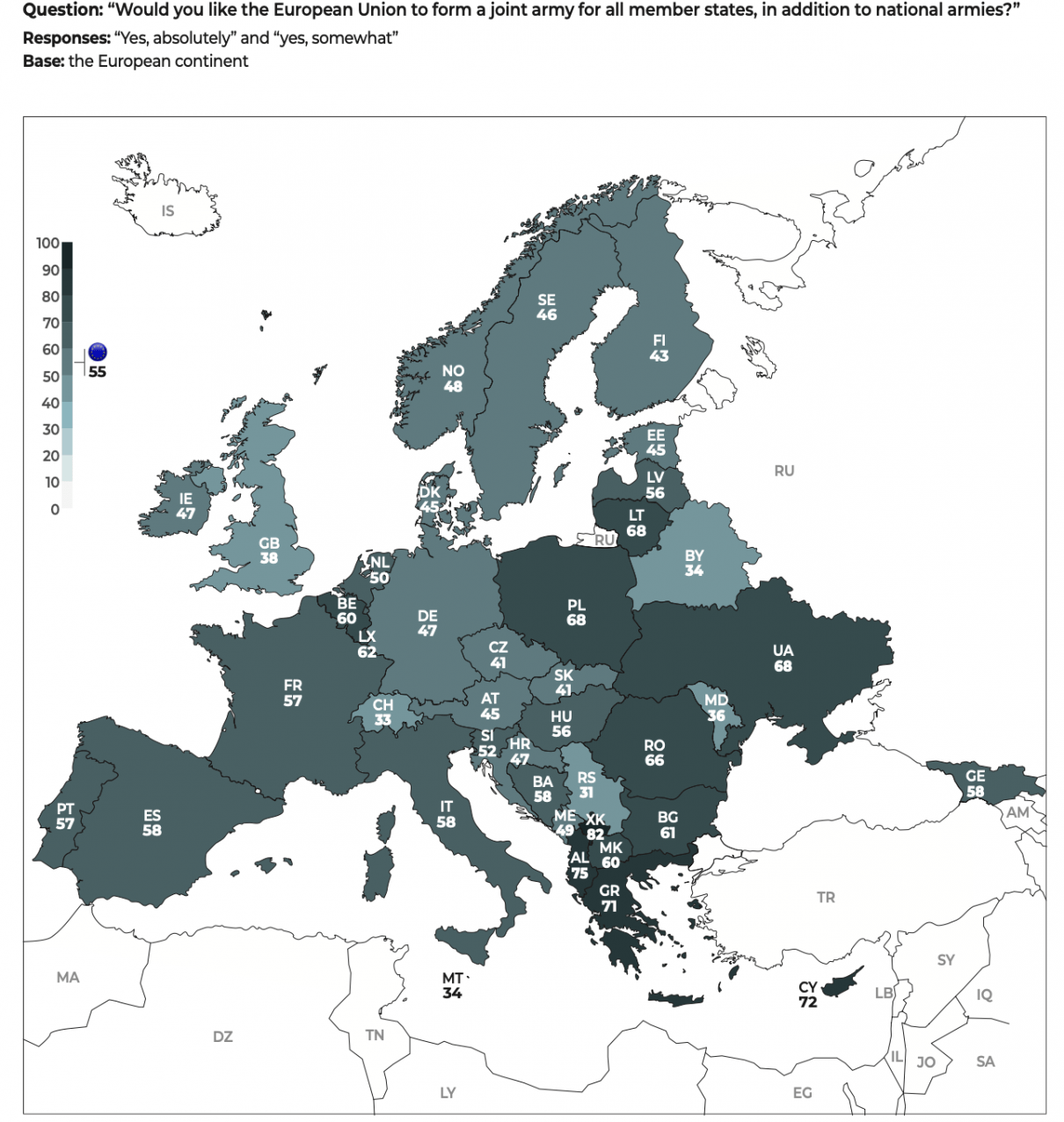
Copyright :
Fondation pour l’innovation politique – January 2022
See Guy Chazan and Jim Brunsden, “Merkel backs Macron’s call for creation of European army”, ft.com, November 13th 2018.
See Daniel Boffey, “Von der Leyen: EU must acquire ‘political will’ to build own military”, theguardian.com, September 15th 2021.
“Council decision (CFSP) 2017/2315 of 11 December 2017 establishing permanent structured cooperation (PESCO) and determining the list of participating Member States”, Official Journal of the European Union, L331, December 14th 2017.
The European Union average from 2017 did not include data for Cyprus, Ireland, Luxembourg, Malta or Slovenia. The average European Union figures for 2017, 2018 and 2021 do not include the United Kingdom as a result of the June 2016 Brexit referendum.
See Stanley R. Sloan, “NATO’s ‘neutral’ European partners: valuable contributors or free riders?”, nato.int, April 23rd 2013.
See “Denmark and NATO”, nato.int, s.d..
See “A row between Turkey and Greece over gas is raising tension in the eastern Mediterranean”, economist.com, August 20th 2020.
More than half of Europeans (55%) are in favor of the creation of a joint army
The idea of a European army dates back to the proposal for a European Defense Community (EDC) at the end of the Second World War. This idea failed to materialize in 1954. Since then, the proposal for a common defense framework has been raised on a regular basis. In 2017, French President Emmanuel Macron announced that he wanted to launch a common military project followed, in 2018, by German Chancellor Angela Merkel.3 Establishing a security and defense union is also one of the priorities set out by the European Commission under Ursula von der Leyen.4 Several initiatives have been rolled out recently, including the launch of permanent structured cooperation (PESCO) in 2017,5 enabling certain Member States to develop their collaboration for defense, and the European Defense Fund (EDF), which was approved by the European Parliament for the first time in April 2021.
According to our survey data, more than half (55%) of the Europeans (EU) surveyed are in favor of forming a common army in addition to their national armies, despite a decrease in 2021 by 4 points from the level recorded in 2018 (59%) and by 2 points from 2017 (57%).6
Results are uncertain among the founding members of the European Union: Luxembourgers (62%), Belgians (60%), Italians (58%) and the French (57%) are in favor of this idea, while the Dutch opinion is divided (50%) and Germans are against it (53%). In 2018, just 6 of the 27 Member States saw a majority of their population being opposed to forming a European army, compared with 11 in 2021.
There is often more opposition to the idea of a European army among citizens in Northern Europe, such as Finns (43%), Danes (45%), Swedes (46%) and the Irish (47%). Among these countries, Finland, Ireland and Sweden have a neutral status enshrined in their constitution and recognized by the international community.7 Denmark is a country that was previously neutral.8
On average, within the European Union, public opinion in Eastern countries is more favorable to the concept of European armed forces (60%) than in Western European countries (54%). The countries that have joined the Union since 2004 support this initiative, especially Romania (66%) and Bulgaria (61%). However, most respondents are opposed in the Czech Republic and Slovakia (41%), Estonia (45%), Croatia (47%).
Following their effective departure from the European Union, Brits confirmed their disapproval of a European army (62% in 2021, versus 65% in 2018), whereas for Americans, a majority are in favor of this initiative (52%). Similarly, the average figure for respondents in NATO member countries (53% in 2021 and 52% in 2018) supports the idea of European armed forces. It is worth noting that among the European Union countries that are also member countries of NATO, support for the creation of a European army stands at 56%.
The populations most in favor of a European army live in regions with high geopolitical tensions
The idea of European armed forces is supported by three-quarters of Cypriots (72%) and Greeks (71%). In 2018, 54% and 68% of them respectively approved this idea. Developments in the dispute with Turkey concerning oil and gas exploration rights in the Mediterranean are of course a significant factor behind this result:9 most Cypriots (95%) and Greeks (85%) feel that Turkey’s posture on the international stage is worrying (compared with 37% overall).
Relations between European Union Member States and Russia are also a crucial factor behind support for European armed forces. Illustrating this, more than two-thirds of Lithuanians and Poles (68%) support the proposal for European armed forces, while 70% of people in Lithuania and 75% in Poland are worried about Russia’s posture on the international stage. These two countries are located on either side of the Russian enclave of Kaliningrad.
In terms of public opinion, the perception is that Russia’s threat does not stop at the European Union’s borders. The countries involved in territorial disputes with Russia are predominantly in favor of creating a European army. In Georgia, the majority of the population (82%) consider Russia to be a threat; they are also in favor of having a joint European army (58%). Similarly, Russia’s posture is worrying for Ukrainians (69%), who support the creation of a European army (68%). In the Western Balkans, a particularly high number of Albanians (58%) and Kosovars (77%) said that they were concerned about Russia, and they also show the strongest levels of support for a European army (75% of Albanians and 82% of Kosovars).
Brexit: a contrasting judgment on a historic decision
Since the historic vote in June 2016 to leave the European Union, and the implementation of that decision on January 31st 2020, the United Kingdom has become a third country in relation to the European Union. Following this bitter divorce, the British, Europeans and, more widely, all of the citizens surveyed here can now look back on this referendum, which has changed the face of the United Kingdom and the European Union. When asked how they view their country’s future, half of British respondents (48%) believe that their country will be worse off without the European Union; only one-third (33%) think that it will be better off, while 19% do not expect Brexit to have any impact on the country. In 2016, Brexit won with 51.9% of the total votes (17,410,742 for, 16,141,241 against) with a turnout of 72.2%.
Across the European Union, half of citizens (47%) expect the United Kingdom to be worse off outside the European Union. This opinion is supported by 61% of those in favor of the euro. Similarly, 66% of respondents who believe that the European Union strengthens democracy in their country feel that the United Kingdom will be worse off without the European Union.
Brexit: a right-wing protest vote (in %)
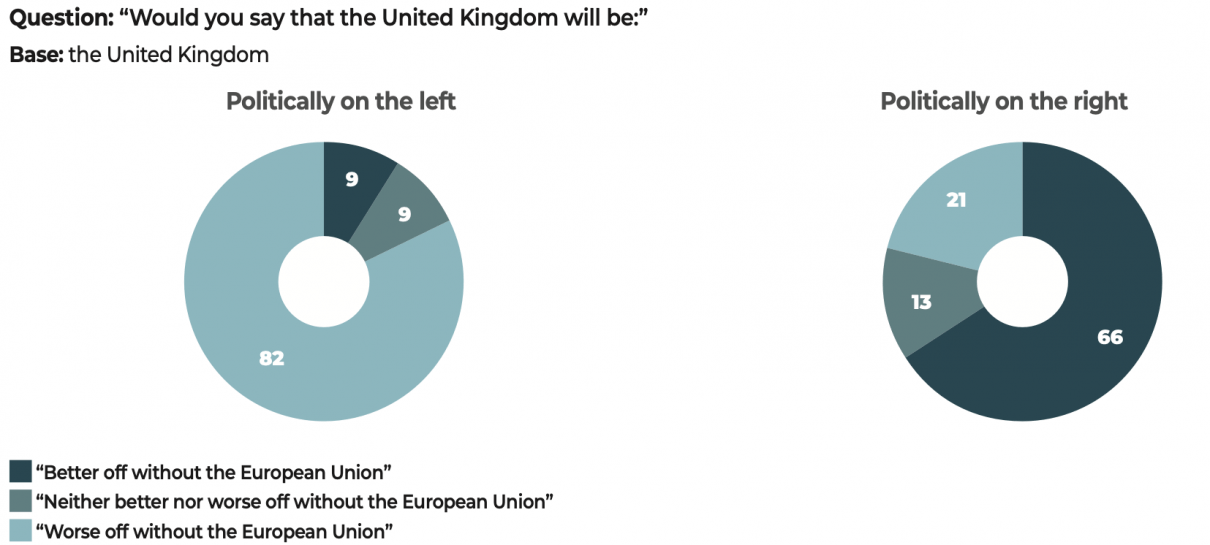
Copyright :
Fondation pour l’innovation politique – January 2022
Memo for the reader: In the United Kingdom, two-thirds of those (66%) who identify themselves as right-wing believe that their country “will be better off without the European Union”.
The United Kingdom outside the European Union: younger Britons are the most worried (in %)
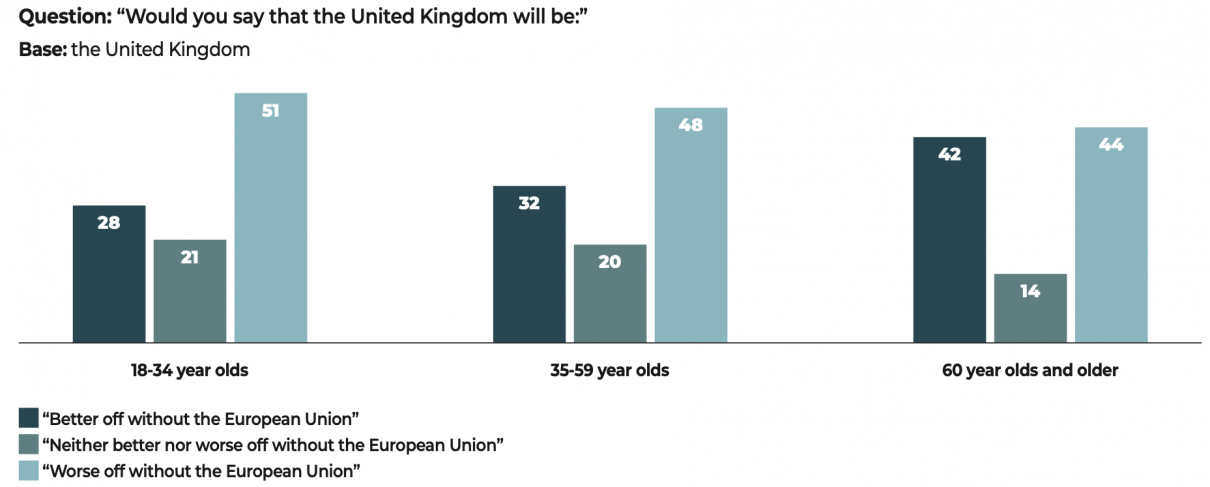
Copyright :
Fondation pour l’innovation politique – January 2022
Memo for the reader: In the United Kingdom, 51% of 18-34 year olds believe that their country “will be worse off without the European Union”.
Only 47% of Europeans believe that the UK “will be worse off without the European Union” (in %)
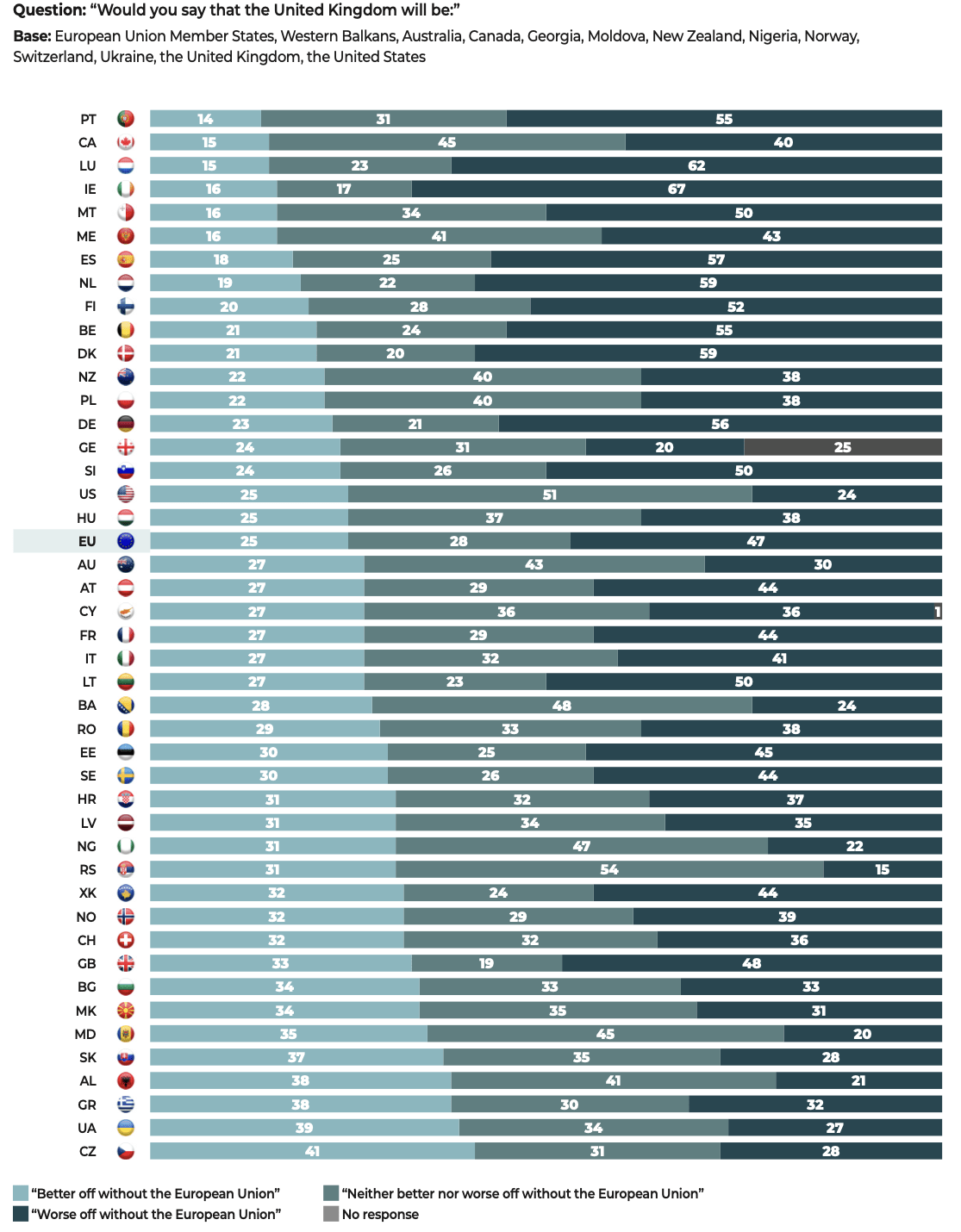
Copyright :
Fondation pour l’innovation politique – January 2022
What is the public opinion on Brexit? (in %)
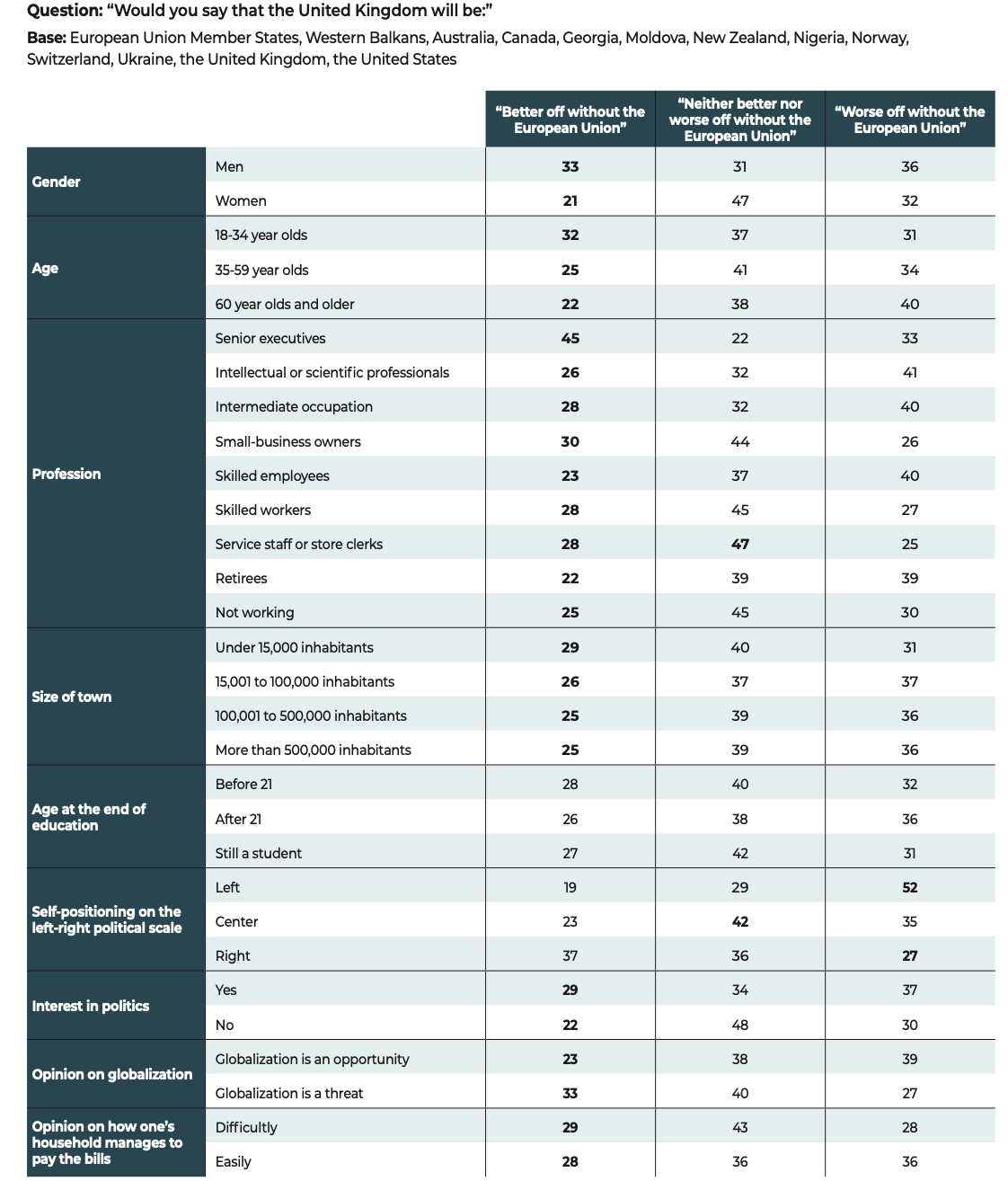
Copyright :
Fondation pour l’innovation politique – January 2022
Note: the difference between totals and 100% represents non-responses.
The democratic ideal resists
Without overlooking the long genealogy of ideas and experiments on which democracy was built, there is a general consensus that it was introduced sometime in the 1880s in the form of a parliamentary system. The principles and institutions on which democratic politics are based were subsequently developed over the twentieth century, with extended voting rights, additional freedoms, diversified elections, etc., before taking the form we recognize today. Democracies have allowed their citizens to access material wealth, human progress and an existential condition of an unprecedented and unequalled quality and value. There is a close link between this progress and the system’s entrenchment. This connection also exists between support for the system and the practical achievements of which it has proved capable. Its political legitimization may also or perhaps even mainly be ascribed to these economic and social accomplishments. This raises the question of the conditions required for modern democracies to maintain this level of material comfort and, moreover, continue at the same pace of progress seen in democratic nations over the past century. In the face of these major challenges, democratic societies still have one priceless asset that is illustrated in the results of our study. The citizens surveyed have confirmed their allegiance to freedoms and to democracy. Our data show that when they voice disapproval, more often than not, the object of their criticism is not the idea of democracy itself but rather the way in which democracy functions in their country. This points towards an anthropological aspiration for freedom, which is the force most capable of guaranteeing the sustainability of democracy in the twenty-first century.
Widespread approval for representative democracy
“Being led by a strongman who does not have to worry about parliament or elections”, “Having experts decide what is best for the country, rather than the government”, “Having the armed forces govern the country”, “Having a democratic political system with an elected parliament that runs the government”, “Having citizens decide what is best for the country, rather than the government”, “Granting the right to vote only to citizens with a sufficient level of knowledge”.
In our study, six different types of regimes1 were presented to the people surveyed. Respondents were invited to say whether they believed that each type of regime represented a good or bad way of governing. Out of these six options, the representative democracy model (“having a democratic political system with an elected parliament that runs the government”) is the most widely supported (81%), followed by the direct democracy model (70%) defined as “having citizens decide what is best for the country, rather than the government”.
There is also significant support (62%) for a political system based on experts. The Covid-19 pandemic has once again turned the spotlight on the concept of a technocracy, a form of government in which decisions are made by experts. However, we found that the idea of “having experts decide what is best for the country, rather than the government” has not increased in popularity as a result of the pandemic. In 2018, in the 42 countries surveyed, 57% of respondents believed that this form of government was a good way of governing; in 2021, the average figure for these same 42 States was 58%.
Support for different political systems (in %)
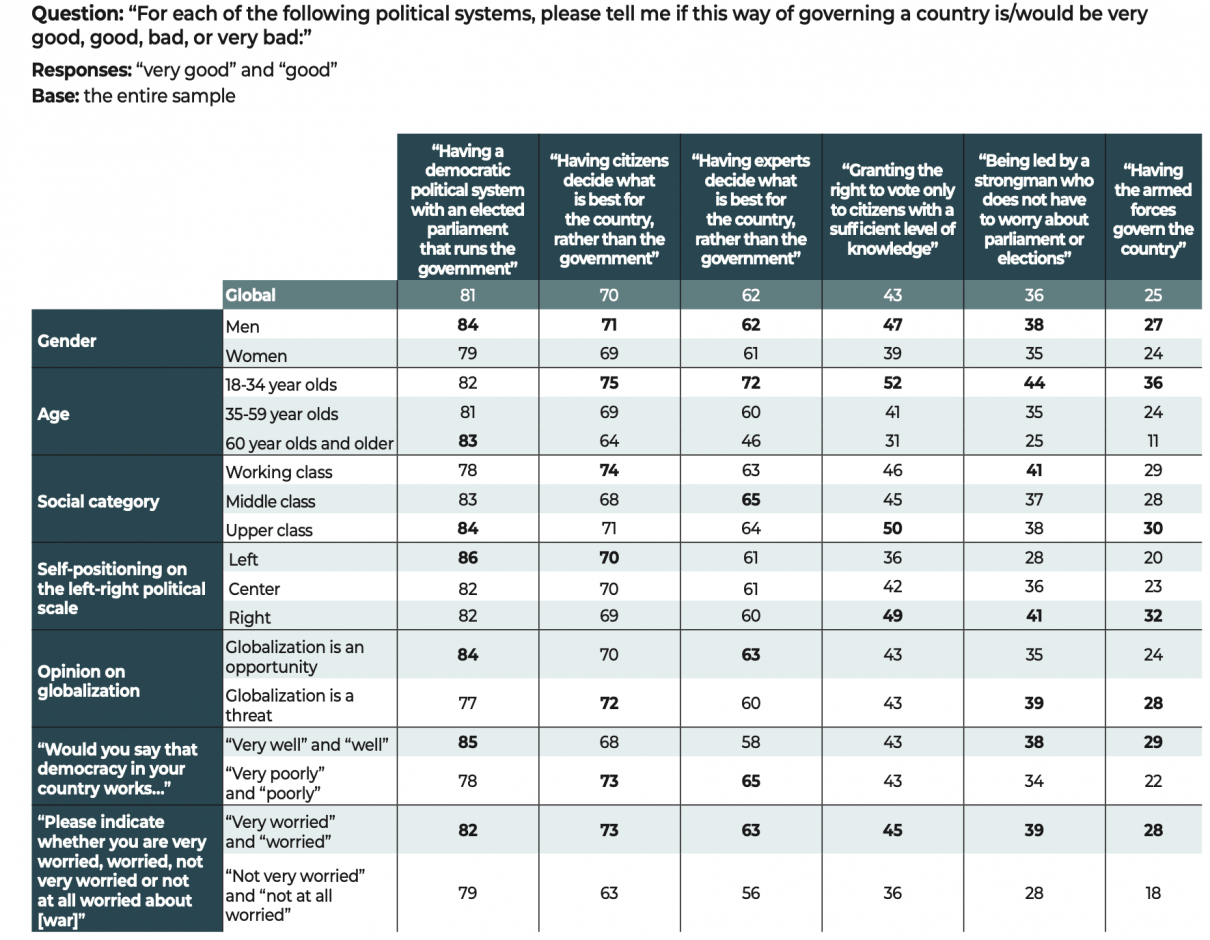
Copyright :
Fondation pour l’innovation politique – January 2022
By the same token, respondents who supported either “being led by a strongman who does not have to worry about parliament or elections” or “having the armed forces govern the country” are more likely than the global average to say that they feel reassured by authoritarian regimes. For example, 25% of respondents who support the idea of a strongman find China’s posture on the international stage reassuring (compared to 18% on average), 28% have the same view of Russia’s posture (as opposed to 20%) and 28% find Turkey’s posture reassuring (compared to 19%). Similarly, among those who believe that having the armed forces govern the country would be a good thing, 28% feel reassured by China, 32% by Russia and 34% by Turkey.
The idea of a political system based on “a strongman who does not have to worry about parliament or elections” enjoys majority support in 14 countries (in %)
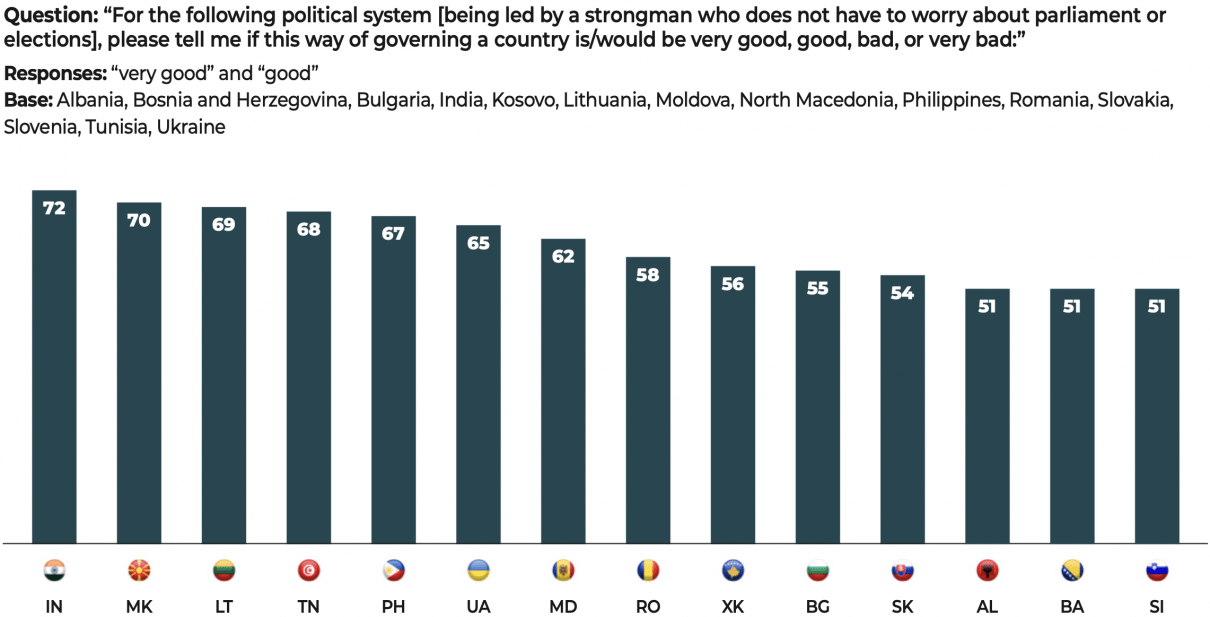
Copyright :
Fondation pour l’innovation politique – January 2022
The idea of a political system where “the armed forces govern the country” is supported by at least a third of respondents in 8 countries (in %)
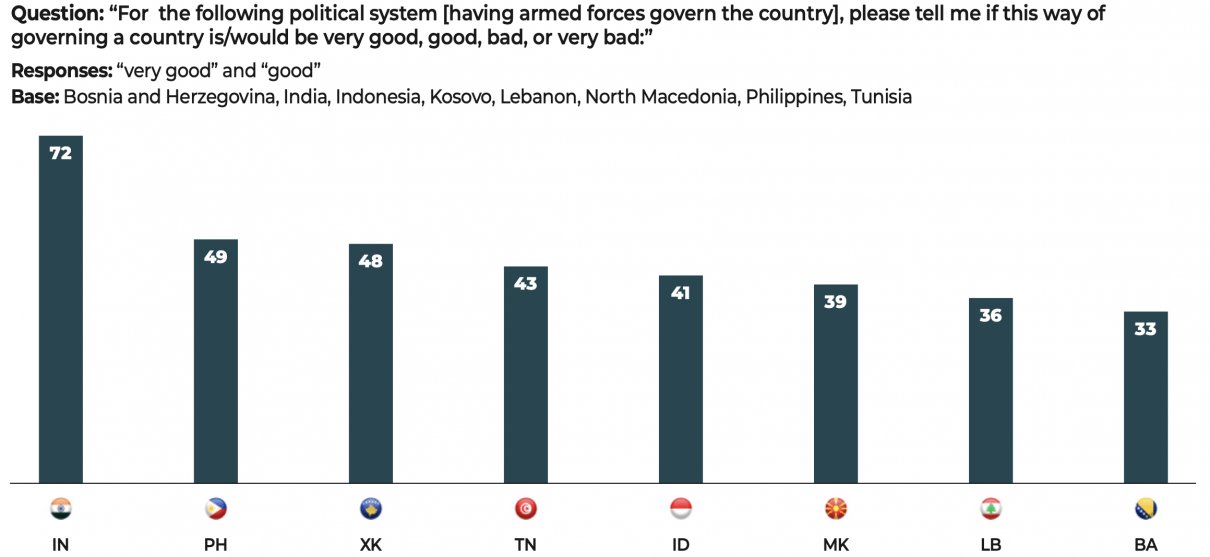
Copyright :
Fondation pour l’innovation politique – January 2022
Fear of war and authoritarian temptation (in %)
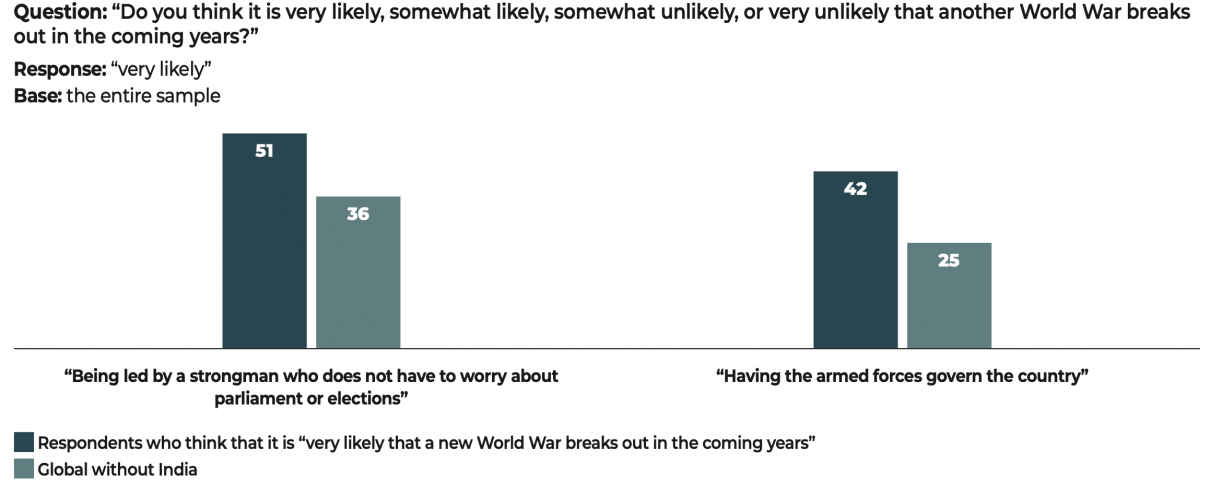
Copyright :
Fondation pour l’innovation politique – January 2022
In Arabic, thawra means “revolution” and refers to the movement opposed to the Lebanese government launched in October 2019.
See The World Bank, “Lebanon Sinking into One of the Most Severe Global Crises Episodes, amidst Deliberate Inaction”, worldbank.org,
June 1st 2021.
See “Lebanon protests erupt over proposed Government tax on WhatsApp”, abc.net.au, October 18th 2019.
| Indignation, anger and pessimism of the Lebanese
Since the thawra1 that began in October 2019, Lebanon has been gripped by one of the worst socioeconomic crises of the 21st century.2 After Hariri’s government stood down in 2019, the country’s political instability grew worse, culminating in 2020, after the tragic Beirut Port explosion in August, which killed several hundred people and led to the fall of Diab’s government. Their indignation, anger and distrust are reflected in the survey’s results, which are far higher than the average levels. However, these results also indicate a strong desire for change among the population. Firstly, from a political perspective: virtually all respondents believe that their democracy works poorly (90%), which is the highest figure in our survey. Corruption is considered to be omnipresent: 95% of respondents believe that “most” or “all” of the people that govern their country are corrupt. The level of distrust in democratic institutions is unprecedented: 93% of respondents reported distrust in the government (versus 57% for the global average), 90% in the country’s parliament (versus 58%), 91% in the political parties (versus 73%) and 93% in the religious authorities, which are essential to the political functioning of the country’s denominational regime (versus 50%). For the Lebanese population, the two biggest threats to democracy in their country are corruption (75%) and the current government (35%). This political crisis and distrust are also the result of a crisis in terms of representation: 81% of Lebanese respondents say that they do not feel represented by “any political party” (versus 44% on average), while nearly half of respondents (44%) believe that “voting is pointless because politicians do not care about the will of the people” (versus 29% on average). In a country attached to its freedom but riddled with corruption, 86% of respondents said that they are in favor of a government led by experts. From an economic perspective, the devastating crisis, the devaluation of the Lebanese pound and the breathtaking surge in the country’s debt levels are all reflected in widespread concerns among the respondents. The rapid decline in their standard of living and rising inflation were highlighted by respondents: just 1% of the Lebanese believe that “their standard of living has gotten better over the past few years”, while 2% said that it has remained the same. Virtually all respondents said that they are worried about the economic crisis (97%), unemployment (97%), the rising cost of living (96%), and government debt and deficits (94%). These fears related to the country’s economic situation are combined with other concerns resulting from the high level of instability, such as social inequalities (which 95% of respondents are worried about), as well as terrorism (92%), in a country marked by the aftermath of the civil war. The culmination of these factors play a large role as to why the Lebanese are among the most pessimistic of this survey. When asked “What do you think your country will be like tomorrow?”, just 10% answered that their country will be “better than it is now”. For 76% of respondents, “citizens will no longer be able to resolve their disagreements peacefully and will resort to violence more often” (compared with an average of 44%). More than half of the Lebanese (53%) also support the right to have a firearm at home (versus 47% on average). Lastly, a majority of the Lebanese (68%) feel free to criticize their government on social media (18 points higher than the average figure). The October 2019 thawra was triggered by opposition to the introduction of a WhatsApp tax.3 They have a positive perception of social media, which has been a major revolutionary tool and driving force in Lebanon since the Arab Spring: 93% believe that social media are useful because they help people get informed, while 88% believe that they are useful because they help people to freely express themselves (versus respectively 83% and 79% on average). |
Criticism of the functioning of democracy in the name of democracy
See Yves Bertoncini and Dominique Reynié, “The illiberal challenge in the European Union”, in András Sajó, Renáta Uitz, and Stephen Holmes (dir.), Routledge Handbook of Illiberalism, 2021, p. 822-839.
Respondents were invited to choose from the following items: civil war, terrorism, immigration, racism, sexism, social and economic inequalities, authoritarian countries like China, Russia, Turkey or Iran, social media, disinterest of citizens in politics, the current government and, lastly, corruption.
For half of respondents, democracy works poorly in their country
On average, excluding India, half of citizens (50%) believe that democracy works poorly in their country. The results, of course, vary greatly from country to country. In some countries, most respondents believe that their democracy works well, such as Switzerland, Norway, Denmark, Luxembourg, Canada, New Zealand and Australia.
Generally, in the European Union, the views on how democracy works reflect a deterioration: on average, 49% of the Europeans surveyed feel dissatisfied with how democracy works in their country. In Eastern European countries, more than two-thirds (66%) of respondents feel that democracy works poorly. In terms of “illiberal” democracies,2 where citizens see the rule of law challenged by their elected leaders, those who feel that democracy works poorly in their country are in the majority Hungary, Slovenia and Poland. When asked about the greatest threats to democracy in their country, “the current government”3 is the principal threat for citizens in Slovenia (57%), Poland (55%) and Hungary (53%). However, this negative view of how democracy works in their country is also very widespread among the French, Spaniards and Italians.
In the United Kingdom, a third country in relation to the European Union since December 31st, 2020, 41% of respondents believe that their democracy works poorly. This proportion is even more significant since the June 23rd, 2016, referendum process could have led the Brits to believe that they were effectively taking back control over the key decisions regarding their future.
In the Western Balkans, more than two-thirds (67%) of respondents believe that democracy works poorly in their country. The same is true in countries where democracy is not only fragile but under serious threat, or where it has even been overthrown. Citizens surveyed in Moldova, Belarus, Ukraine and Georgia all strongly believe that democracy works poorly in their country.
When a country is run by populist leaders, the assessment of the functioning of democracy varies. In the Philippines, where Rodrigo Duterte’s presidency stands testament to the recent rise in authoritarianism in Southeast Asia, 70% of respondents believe that democracy “works well” in their country. The same view is held by two-thirds of respondents in India. Conversely, Brazilians are more critical and widely condemn how their democracy works, just as people do in Tunisia, a country caught up in a deep political crisis.
Women and those with lower incomes are the most critical of the way in which democracy works (in %)
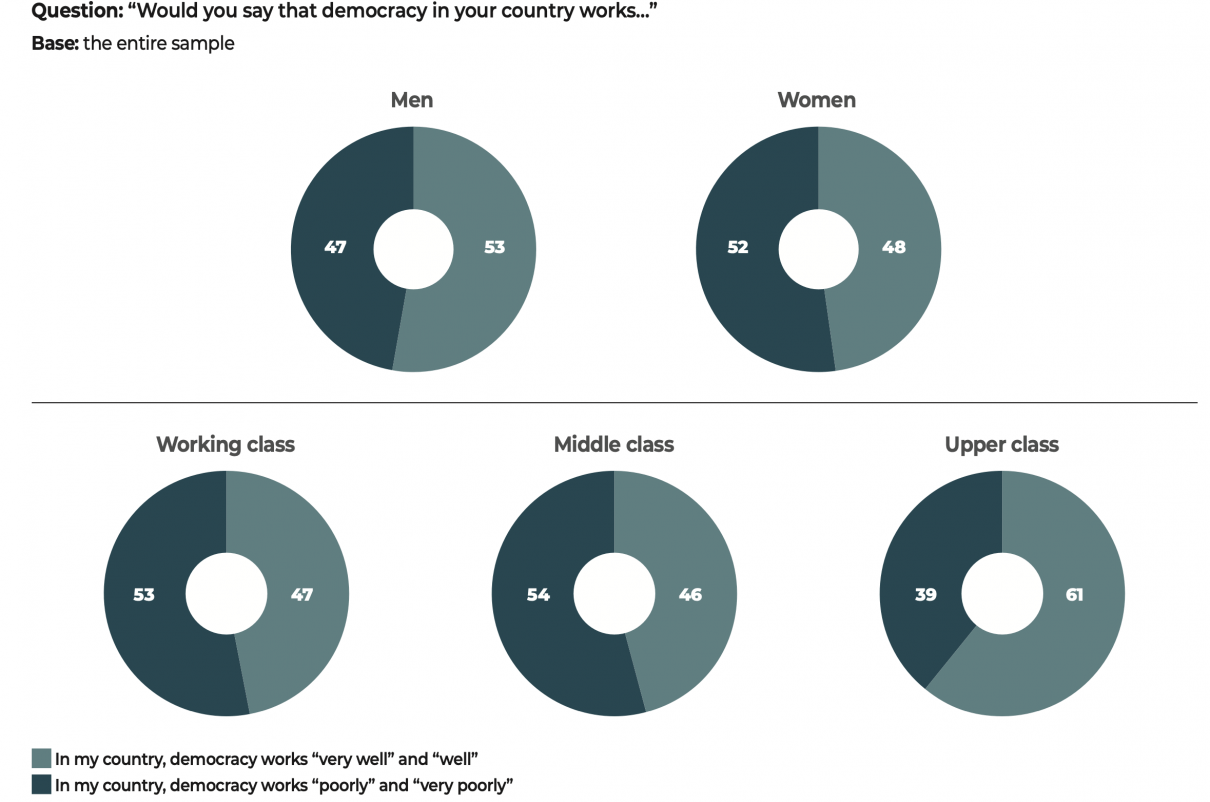
Copyright :
Fondation pour l’innovation politique – January 2022
Half of respondents feel that their democracy is not working well (in %)
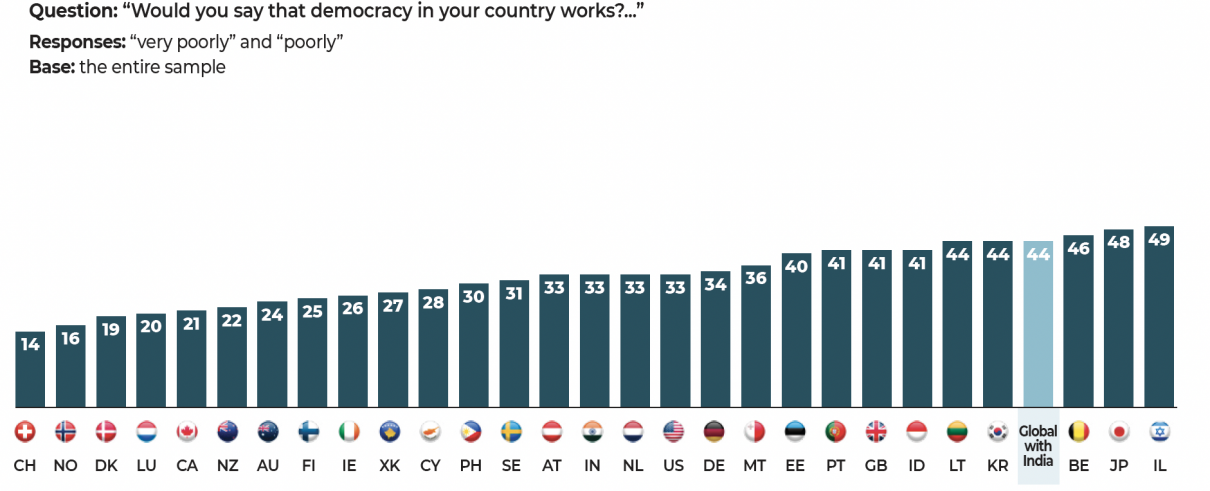
Copyright :
Fondation pour l’innovation politique – January 2022
Half of respondents feel that their democracy is not working well (in %) – continued
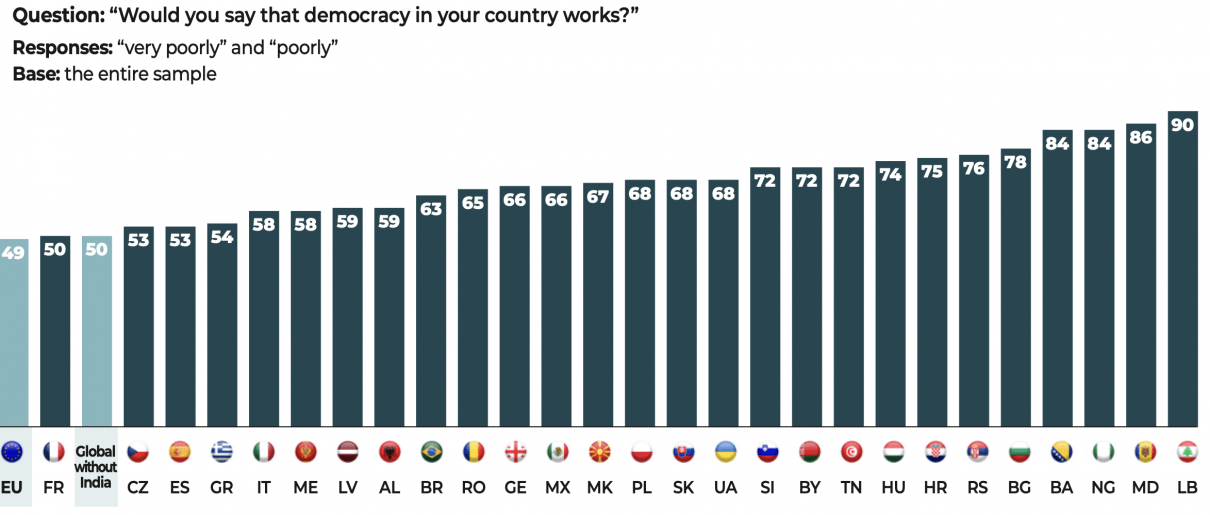
Copyright :
Fondation pour l’innovation politique – January 2022
Younger generations display harsher views about how well democracy is working (in %)
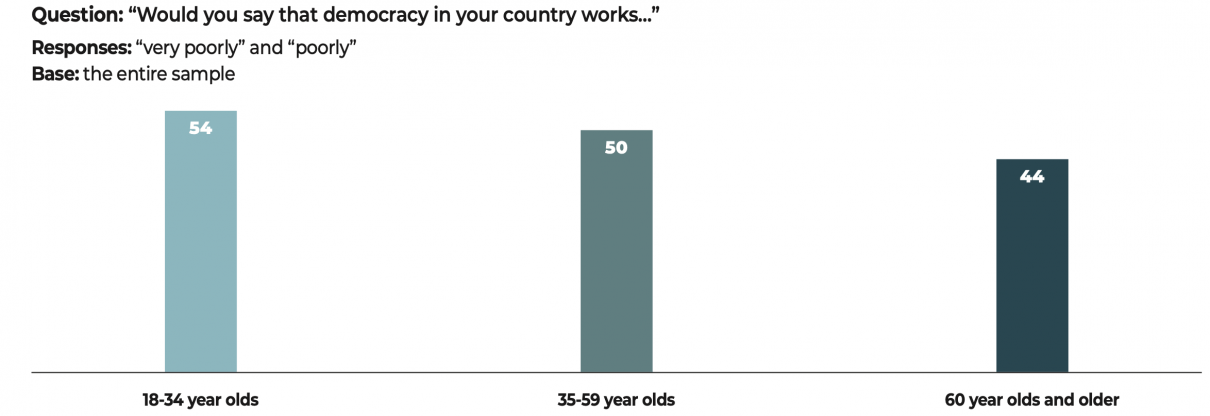
Copyright :
Fondation pour l’innovation politique – January 2022
Civil war, terrorism, immigration, racism, sexism, social and economic inequalities, authoritarian countries like China, Russia, Turkey or Iran, social media, disinterest of citizens in politics, the current government and, lastly, corruption.
The questionnaire for this survey was administered between June and August 2021, i.e. before the Pandora Papers were released in early October 2021, revealing the secret bank accounts held by large numbers of leaders from around the world.
Corruption is seen as the main threat to democracy
We invited respondents to answer the following question: “In your opinion, which of the following are the greatest threats to democracy in your country?”. They were then invited to rank two of the eleven proposed options “firstly” or “secondly” in order of importance.4 When analyzing the results, we have used the total number of answers ranked “firstly” or “secondly”. Out of the 11 items, corruption was ranked first by nearly one in two respondents (47%).5 Under 35s (53%) are more sensitive to the threat to democracy posed by corruption than people aged 60 and over (36%). The lower-income (52%) and middle-income (51%) sections of the population are more concerned about corruption than those with higher incomes (43%), just as those experiencing financial difficulties (57%) are more concerned than those who do not face such difficulties (43%). Lastly, more right-wing respondents highlighted corruption as a primary or secondary threat to their democracy (48%) than left-wing respondents (42%).
Corruption is a major issue on many levels and its effects are particularly pernicious in democratic regimes, which cannot function without the confidence and trust of citizens. Crises related to corruption undermine democracies. They fuel distrust and lead to widespread suspicions: 16% of respondents believe that “all of the people who govern our country are corrupt”, while half (50%) believe that “most of them are corrupt”. Just one-third (33%) believe that only “a few of them are corrupt”.
Corruption and perception on how well democracy is working (in %)

Copyright :
Fondation pour l’innovation politique – January 2022
The fight against corruption, a major challenge (in %)
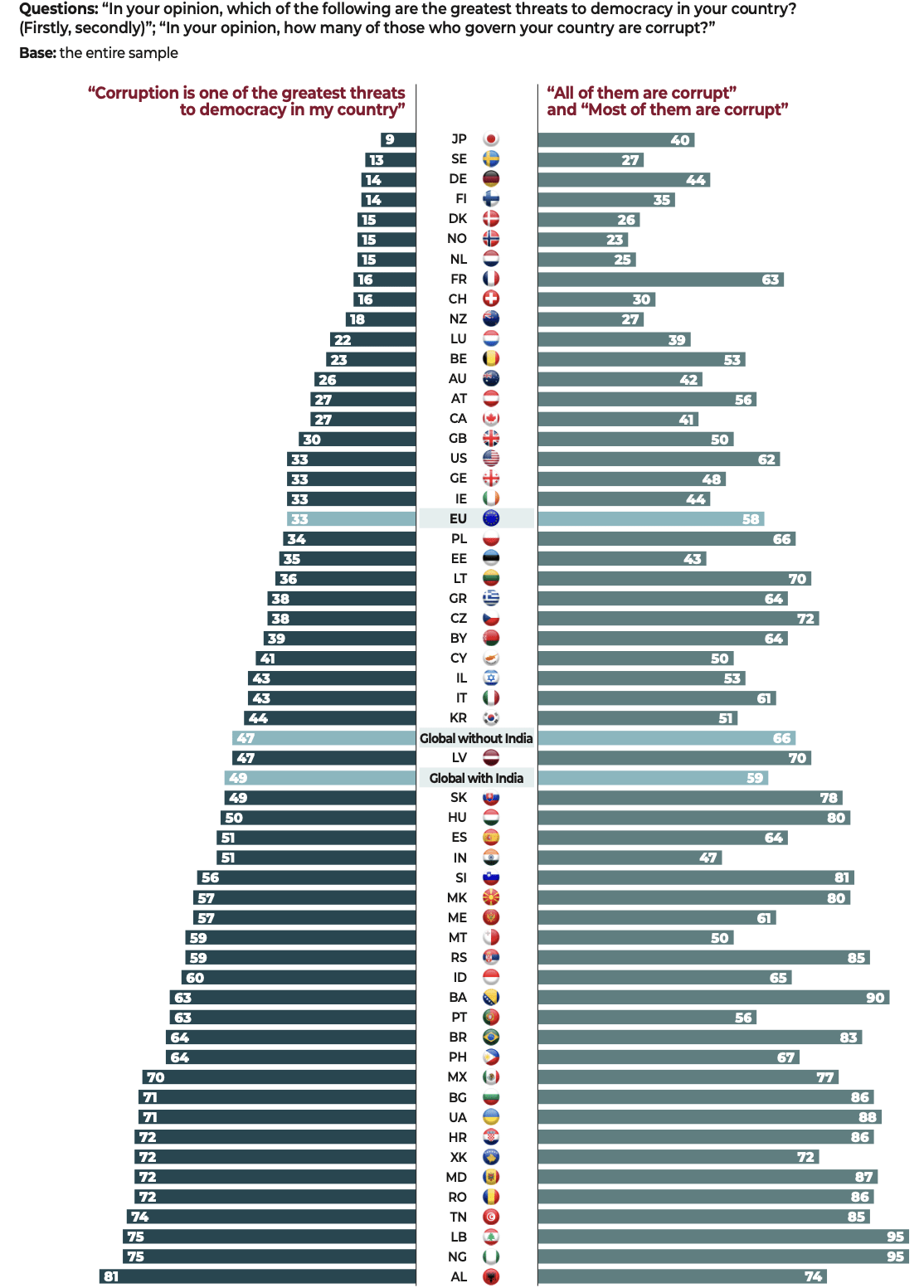
Copyright :
Fondation pour l’innovation politique – January 2022
The efficiency of voting is questioned
One-third of respondents question the value of voting
While there is widespread support for voting, its actual utility is up for debate for a significant minority (29%), who believe that “voting is pointless because politicians do not care about the will of the people” (compared with 71% who believe that “voting is worthwhile because elections can make a difference”). This disparaging view of the value of the usefulness of voting, and not of voting as a principle and mechanism, is not absent from some EU countries and is supported by most Latvians, Belgians and Romanians, but also a significant proportion of Croats, Bulgarians, the French and Spaniards.
Out of all the countries studied, South Korea has the highest percentage of respondents who believe that “voting is worthwhile because elections can make a difference”. It is interesting to recall that South Korea held legislative elections on April 15th, 2020, despite the worsening health crisis. While South Korean President Moon Jae-in had at one stage considered postponing the elections, in the end he wanted to show that the epidemic should not prevent democracy from functioning effectively. Voter turnout reached 66.2%, its highest level since 1992.
More of the respondents who view globalization as a threat (36%) believe that voting is pointless than those who see globalization as an opportunity (25%). Similarly, the idea that voting is pointless is paradoxically more widespread in towns of under 15,000 inhabitants (33%), which are those where people tend to vote the most, than in cities of over 500,000 inhabitants (26%), where people vote less.
Transparency of the electoral process raises doubts
Globally, 43% of respondents believe that the electoral process is not transparent in their country. There are large disparities between countries. In Northern Europe, most of the people in Norway (87%), Finland (86%), Denmark (84%) and Sweden (83%) believe that the electoral process in their country is transparent. Strong results can also be seen in Switzerland (85%), New Zealand (82%), Canada and Cyprus (81%), but also for Australia (79%), Israel (77%), South Korea (75%), the Philippines and the United Kingdom (72%).
Roughly a third of respondents (29%) consider that “voting is pointless because politicians do not care about the will of the people” (in %)
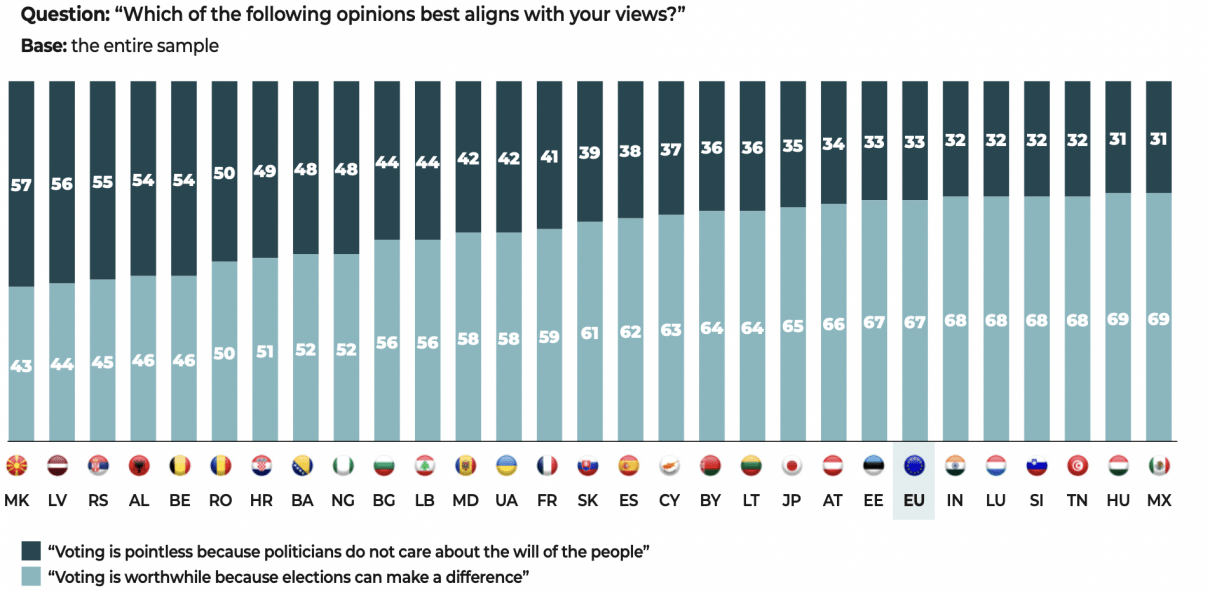
Copyright :
Fondation pour l’innovation politique – January 2022
See Daniel Braun and Granit J. Tërnava, “Parliamentary Election in Kosovo: Will the Victor also Become Prime Minister?”, Konrad-Adenauer-Stiftung, February 2021.
In the European Union, a majority believes that the electoral process is not transparent in Hungary (65%) and Bulgaria (54%), while half of the Italians surveyed share this belief (51%).
These opinions are even more widely shared in the Balkans – especially in Bosnia and Herzegovina (69%) and Serbia (65%) – with the exception of Kosovo, where 85% of respondents believe that the electoral process is transparent. The February 2021 legislative elections and the presidential election on April 3rd-4th 2021 transformed the political landscape: indeed, for the first time since the end of the War of 1999, the country is no longer led by former commanders from the Liberation Army (UÇK).6
See Mary Ilyushina, Helen Regan and Tara John, “Protests in Belarus as disputed early election results give President Lukashenko an overwhelming victory”, cnn.com, August 10th 2020.
2. See “Belarus plane: What we know and what we don’t”, bbc.com, June 25th, 2021.
| The Belarusian revolt against a violated electoral process
The August 2020 presidential election was marked by the jailing of opposition candidates, opaque ballots, voting booths without curtains, election officials being beaten and arrested, bans on foreign journalists and, most importantly, a falsified result. As a result, less than one-third of respondents (28%) believe that their electoral process is transparent.1 The migrant crisis orchestrated by Lukashenko’s regime on the Polish border since the summer of 2021 represents a new milestone in the crisis separating Belarus from the European Union. 72% of people in Belarus believe that democracy works poorly in their country. However, the data collected by our survey shows that people in Belarus still have strong democratic aspirations: 95% of them believe that “the ability to vote for the candidate of your choosing” is important, while 94% are in favor of “having the right to say what you think”. 87% of Belarusians are in favor of a free press, even though their government forced commercial Ryanair flight 4978 (Athens-Vilnius) to land on its territory in June 2021 in order to arrest the Belarusian journalist and opponent of the regime, Roman Protassevitch.2 The concept of “having a democratic political system with an elected parliament that runs the government” is supported by 85% of Belarusians, and 63% are opposed to “being led by a strongman who does not have to worry about parliament or elections”. We also note that half of Belarusians (49%) feel reassured by Russia’s posture on the international stage (compared with 20% on average), while 32% find it worrisome (versus 52%). The Belarusian population seems confident about its future: a majority (52%) think that their country will be “better tomorrow than it is today” (compared to 36% for the global average). |
Roughly a third of respondents (29%) consider that “voting is pointless because politicians do not care about the will of the people” (in %) – continued
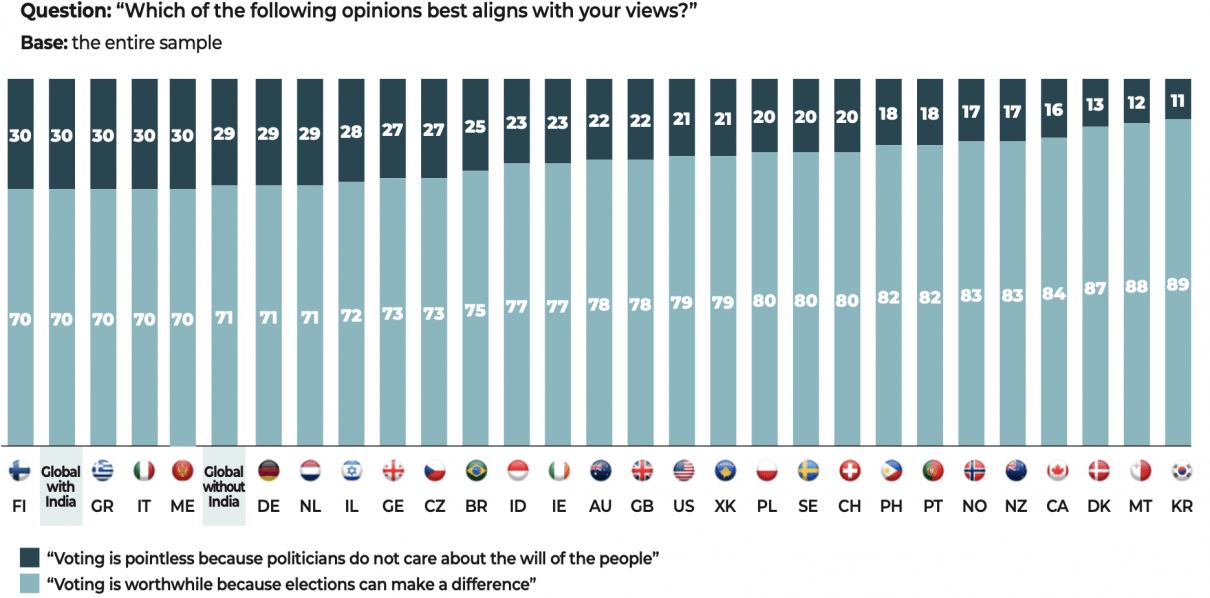
Copyright :
Fondation pour l’innovation politique – January 2022
There is significant support for making the right to vote conditional on one’s level of knowledge
The idea that access to the right to vote should be dependent on a certain level of intellectual knowledge, meaning that it would no longer be given to everyone. Nevertheless, this idea has a strong level of public support: 43% of respondents across all countries stated that “granting the right to vote only to citizens with a sufficient level of knowledge” would be a good way of governing a country. In the European Union, this idea is backed by more than a third of respondents (36%).
Even more significantly, the idea of voting rights being dependent on knowledge is most popular among the younger generations. Half of under 35s (52%) approve this idea, compared with 31% of people aged 60 and over. This elitist conception of electoral participation is even more widespread among higher socio-professional categories; it is most popular among senior executives (63%), ahead of service staff or store clerks (39%).
Individuals favoring reserving the right to vote for those with sufficient knowledge are most tempted by a “strongman”, a government of “experts” or the “armed forces”(in %)
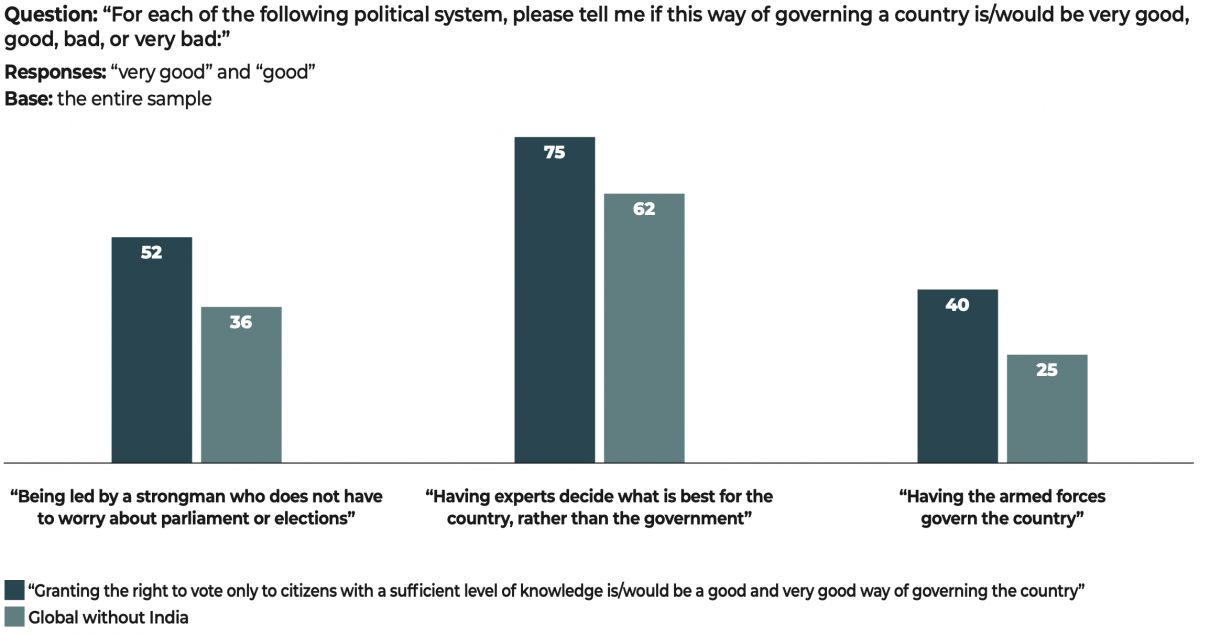
Copyright :
Fondation pour l’innovation politique – January 2022
Memo for the reader: Among those who support limiting the right to vote to those with a sufficient level of knowledge, 52% believe that “being led by a strongman who does not have to worry about parliament or elections” is/would be a good way to govern the country.
See “The Role of Youth in Democratic Resilience. Summary Report. Side-event held in the margins of the 73rd UNGA organized by the CoD and hosted by Romania”, Community of Democracies, October 2018.
Nearly half of those under 35 (46%) believe that the electoral process in their country is not transparent
The younger generations are attached to collective liberties:7 93% of 18- to 34-year-olds said that it is important to be able to take part in the decision-making process, while 95% highlighted the ability to vote for the candidate of their choice and 95% believe that having the right to say what they think is important. However, and this is a new development, this attachment is expressed based on a feeling that these liberties are under threat and being lost. For instance, 44% of 18- to 34-year-olds said that they do not feel free to express themselves, compared with 31% of people aged 60 and over. Similarly, more than half of 18- to 34-year-olds (54%) believe that democracy in their country works poorly, compared with 44% of people aged 60 and over. When asked “Would you say the electoral process in your country is transparent?”, 46% of people under 35 said that this was not the case, compared with 37% of people aged 60 and over.
The sensitivity shown in relation to order and authority also stems from questions concerning the efficiency of democratic regimes. Over a third (35%) of under 35s chose the option “I would not mind having fewer freedoms if it made the government more efficient”, compared with 28% of people aged 60 and over.
43% of citizens believe that voting should be reserved for those with “a sufficient level of knowledge” (in %)
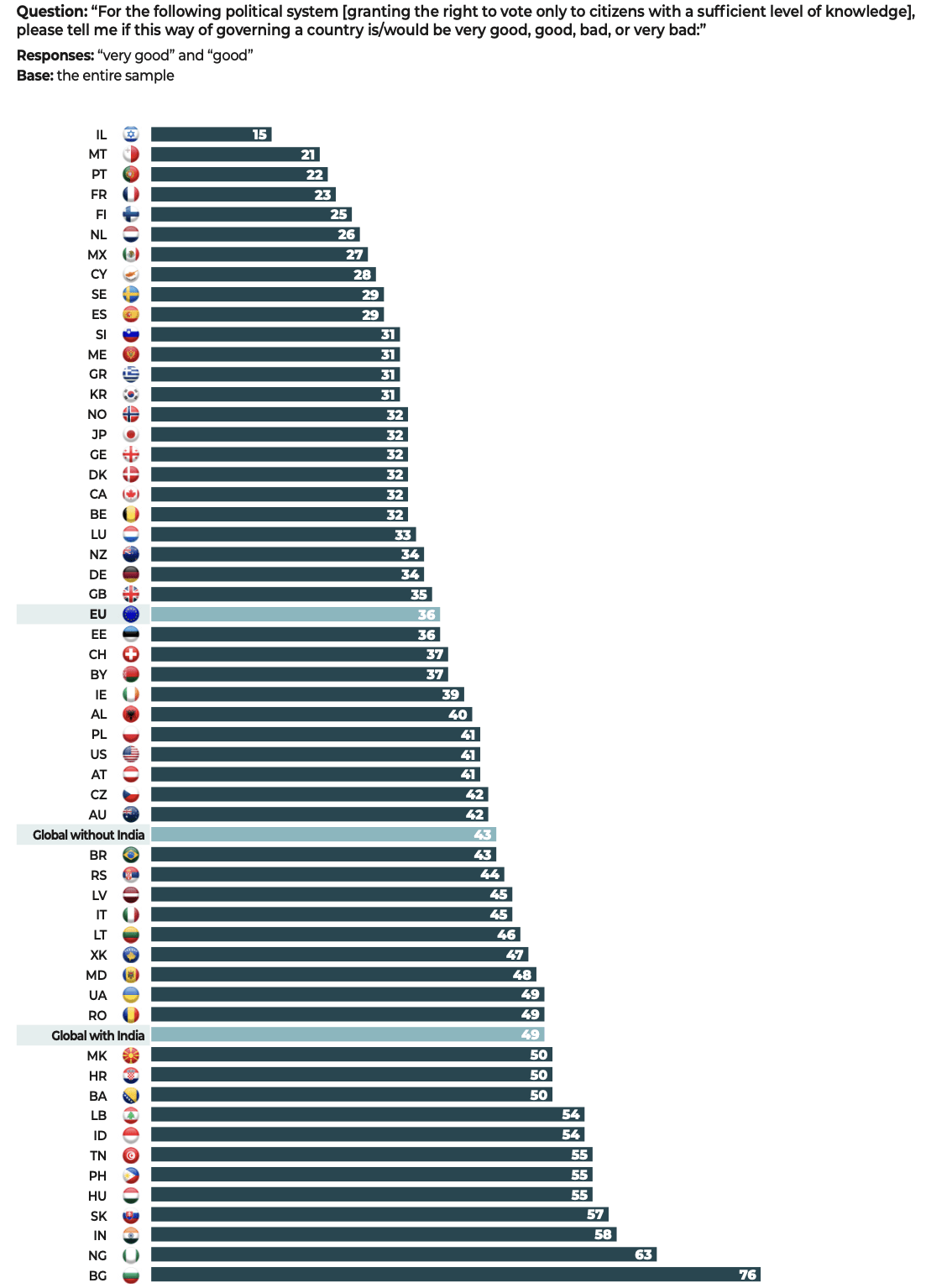
Copyright :
Fondation pour l’innovation politique – January 2022
The younger generations are convinced by representative democracy, but also more sensitive to alternative political systems (in %)
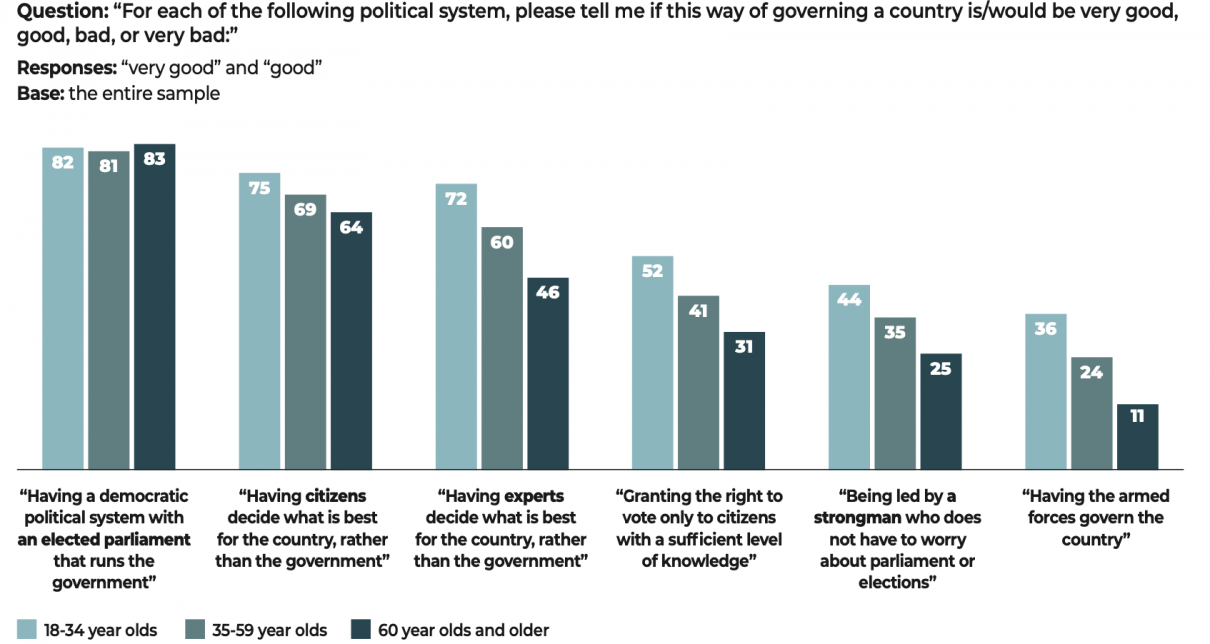
Copyright :
Fondation pour l’innovation politique – January 2022
Memo for the reader: 82% of 18-34 year olds think that “having a democratic political system with an elected parliament that runs the government” is/would be a good way to govern the country.
Politics and media: the double crisis of representation
See Dominique Reynié (ed.), 2022, The Populist Risk in France, Waves 1 to 6, Fondation pour l’innovation politique, 2019-2022 (studies can be downloaded from www.fondapol.org/en).
Our respondents expressed a strong distrust of political institutions, especially regarding political parties, parliament, the government and unions. By way of comparison, a majority of them trust their hospitals, medical professions, schools, armed forces and the police.
The dissatisfaction with public action is not the only factor behind this distrust. Political discourse is also undermined. When asked “Would you say that your ideas are represented by the political parties in your country?”, more than four in ten people (44%) do not feel represented by any party, while less than a third (29%) believe that they are represented by one party and one in four (27%) feel represented by several parties. The majority (60%) of respondents also agreed with the statement: “Most of the time, when politicians speak, I feel like they are discussing issues that do not concern me”.
However, this crisis of political discourse must be assessed in relation to a similar crisis of the same magnitude: that of the media. While the majority of citizens (56%) do not trust the media, half (50%) also agreed with the statement: “Most of the time, when I look at the news in the media, I feel like they are discussing issues that do not concern me”.
This dual representation crisis is contributing to the troubles affecting the democratic world. This sense of distance between citizens and their representatives may explain, at least partially, why many people either choose not to vote or are voting for populists.8 The high level of dissatisfaction with political representation often coincides with a significant level of dissatisfaction with media representation.
The crisis of political representation is accompanied by a crisis of media representation (in %)

Copyright :
Fondation pour l’innovation politique – January 2022
“I feel like they are discussing issues that do not concern me” (in %)
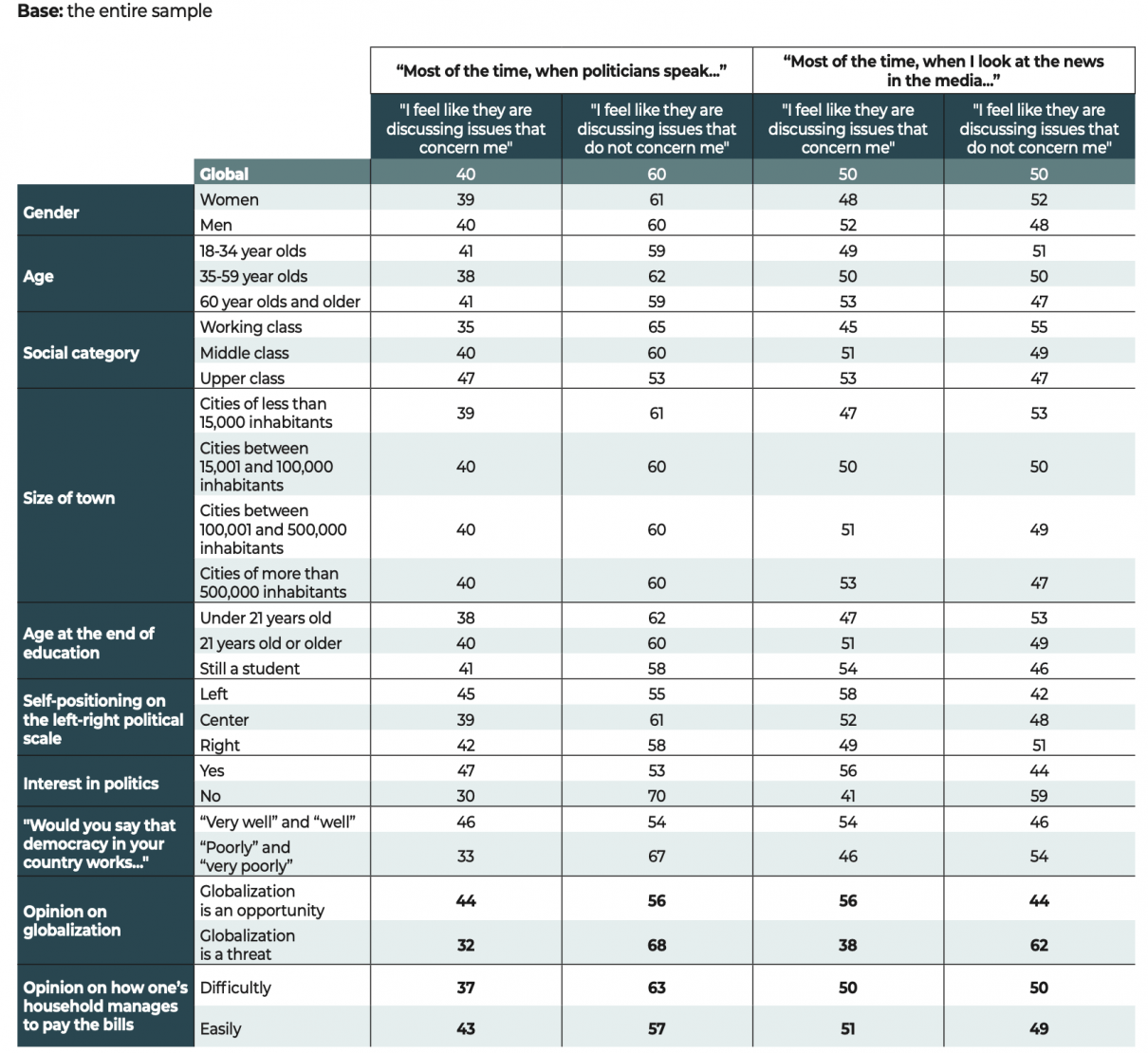
Copyright :
Fondation pour l’innovation politique – January 2022
Note: the difference between totals and 100% represents non-responses.
Despite being indispensable to democracy, political parties are overwhelmingly rejected (in %)
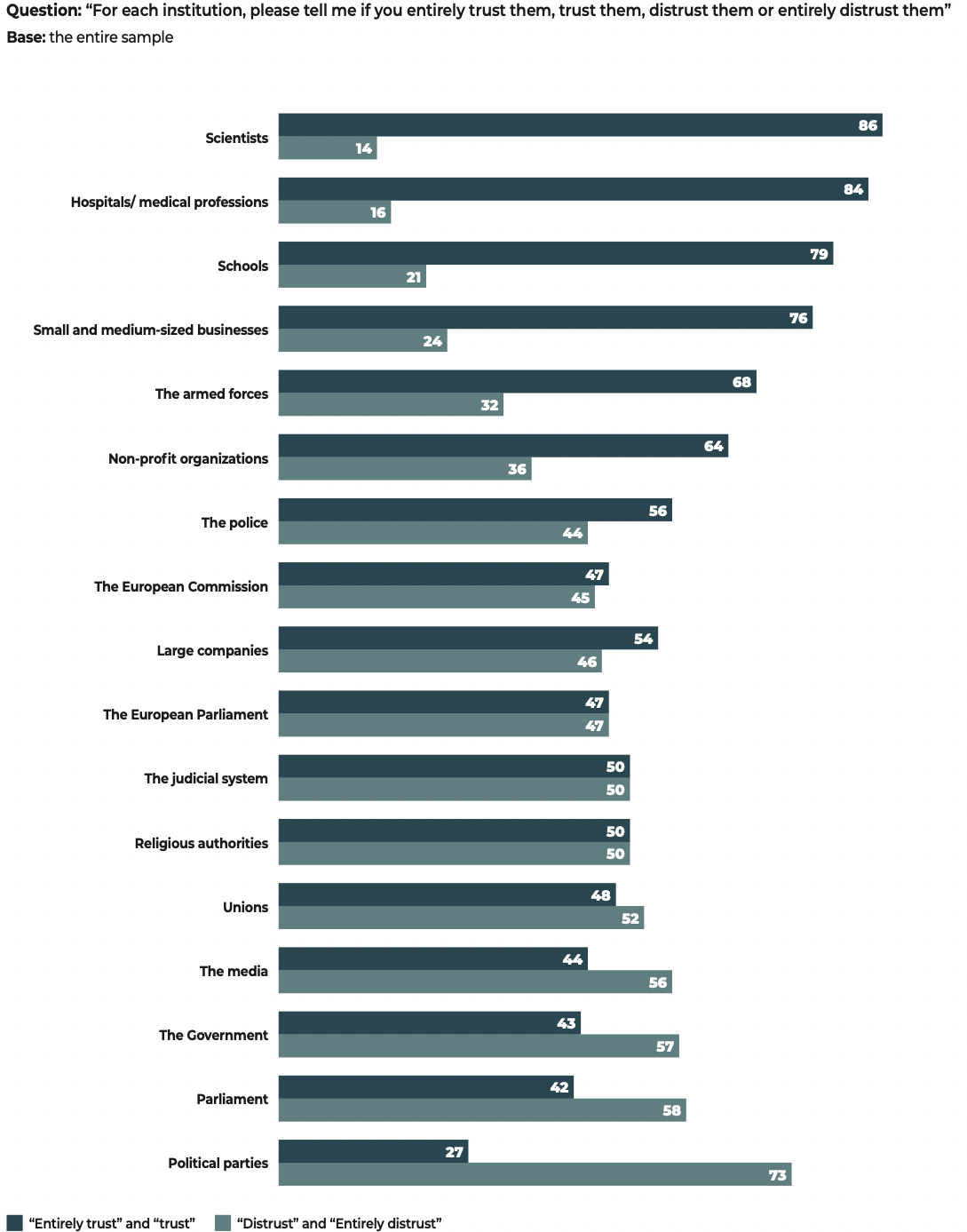
Copyright :
Fondation pour l’innovation politique – January 2022
Note: the difference between totals and 100% represents non-responses.
Freedom of expression and pluralism are at the heart of democracy
In September 2021, the situation was as follows: “106 States have abolished the death penalty for all crimes, 8 have abolished the death penalty for ordinary crimes, 50 have introduced a moratorium on executions, whether by law or in practice, for a total of 164 States. However, the death penalty is still applied in 54 states and territories” (France Diplomatie, “Abolition of the death penalty”, updated in September 2021).
On March 2nd 2021, the House of Representatives of the Philippines adopted Bill No.7814 for the reintroduction of the death penalty under the Comprehensive Dangerous Drugs Act of 2002. This bill marks the culmination of the pressure applied by President Rodrigo Duterte to reintroduce the death penalty, which was abolished in 2006. See “Statement of Commissioner Karen Gomez-Dumpit on the Passage of House Bill N°. 7814, providing for the “Presumption of Guilt” and Reintroduction of the Death Penalty as amendments to the Comprehensive Dangerous Drugs Act of 2002”, March 3rd 2021.
More than half of respondents (57%) are in favor of the death penalty
Year after year, we see a downward trend in the number of death sentences and the number of executions carried out worldwide. In the beginning of 2022, more than two-thirds of the countries no longer applied the death penalty, either by law or in practice.9 Among the countries of our survey, Belarus, India, Indonesia, Japan, Nigeria and the United States are among the countries where it is still practiced. South Korea, Lebanon and Tunisia have introduced a moratorium on executions, while Brazil and Israel have abolished the death penalty for ordinary crimes.
Nevertheless, a majority of respondents (57% on average) are still in favor of capital punishment. In the countries that have not abolished it, it has strong levels of support: 74% of people in South Korea and Japan, 73% in Tunisia, 70% in Indonesia, 67% in the United States, and 58% in India and Lebanon. However, the proportion of Nigerians (50%) and Belarusians (51%) supporting the death penalty is lower than the average level (57%) even though it is still practiced in these countries. The same situation can be seen in states that have abolished the death penalty other than for so-called “exceptional” crimes (50% of Brazilians and Israelis).
In the countries from the Asia-Pacific region of our survey, capital punishment has the backing of the public (Australia, India, Indonesia, Japan, New Zealand, Philippines and South Korea).10 In the European Union, the situation and public opinion positions are different. As the fight against the death penalty has been identified as “a foremost priority of the European Union’s human rights policy”, it no longer exists anywhere in the Union, as its abolition is one of the conditions of entry for countries seeking membership. As part of his EU Council Presidency from January 1st to June 30th 2022, French President Emmanuel Macron announced that he wanted to convince the leaders of countries that still have capital punishment to abolish this practice. However, public opinion is still in favor of the death penalty in 10 European Union countries, namely the Czech Republic (59%), Bulgaria and Hungary (54%), Lithuania (52%), France and Poland (51%), Estonia (50%), Latvia (49%), Belgium and Croatia (48%). In the Western Balkans, support for the death penalty reaches 68% in Serbia and 53% in Albania, compared with a minority of the population in Bosnia and Herzegovina and Montenegro (47%), North Macedonia (38%) and Kosovo (25%).
| Survey countries that have abolished the death penalty: Albania, Australia, Austria, Belgium, Bosnia and Herzegovina, Bulgaria, Canada, Croatia, Cyprus, Czech Republic, Denmark, Estonia, Finland, France, Georgia, Germany, Greece, Hungary, Ireland, Italy, Kosovo, Latvia, Lithuania, Luxembourg, Malta, Mexico, Moldova, Montenegro, Netherlands, New Zealand, North Macedonia, Norway, Philippines, Poland, Portugal, Romania, Serbia, Slovakia, Slovenia, Spain, Sweden, Switzerland, Ukraine and the United Kingdom.
Survey countries that have not abolished the death penalty: Belarus, Brazil, India, Indonesia, Israel, Japan, Lebanon, Nigeria, South Korea, Tunisia and the United States. |
Opinion and legislation on the death penalty are in agreement (in %)
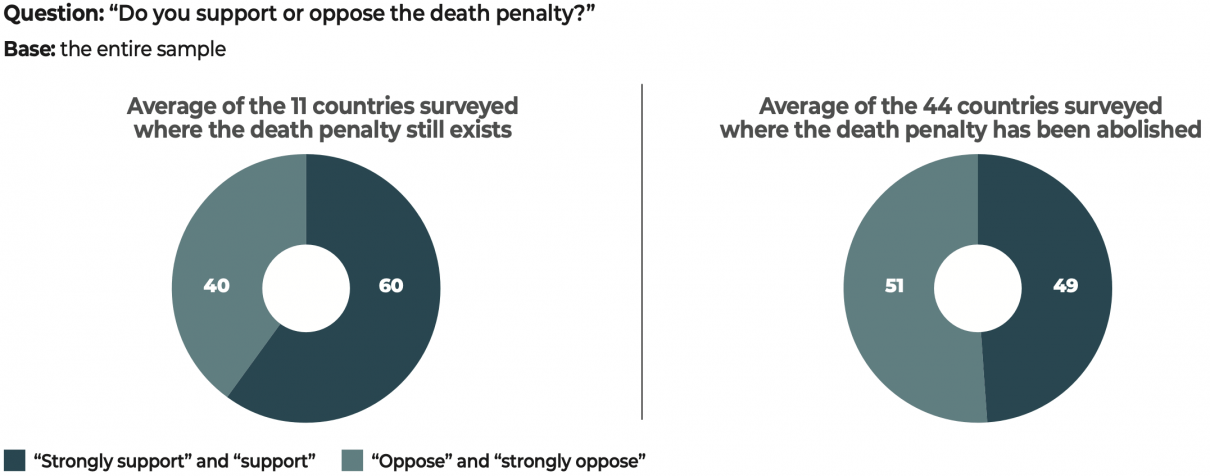
Copyright :
Fondation pour l’innovation politique – January 2022
Who is in favor of the death penalty, and who is against it? (in %)
Question: “Do you support or oppose the death penalty?”
Base: the entire sample
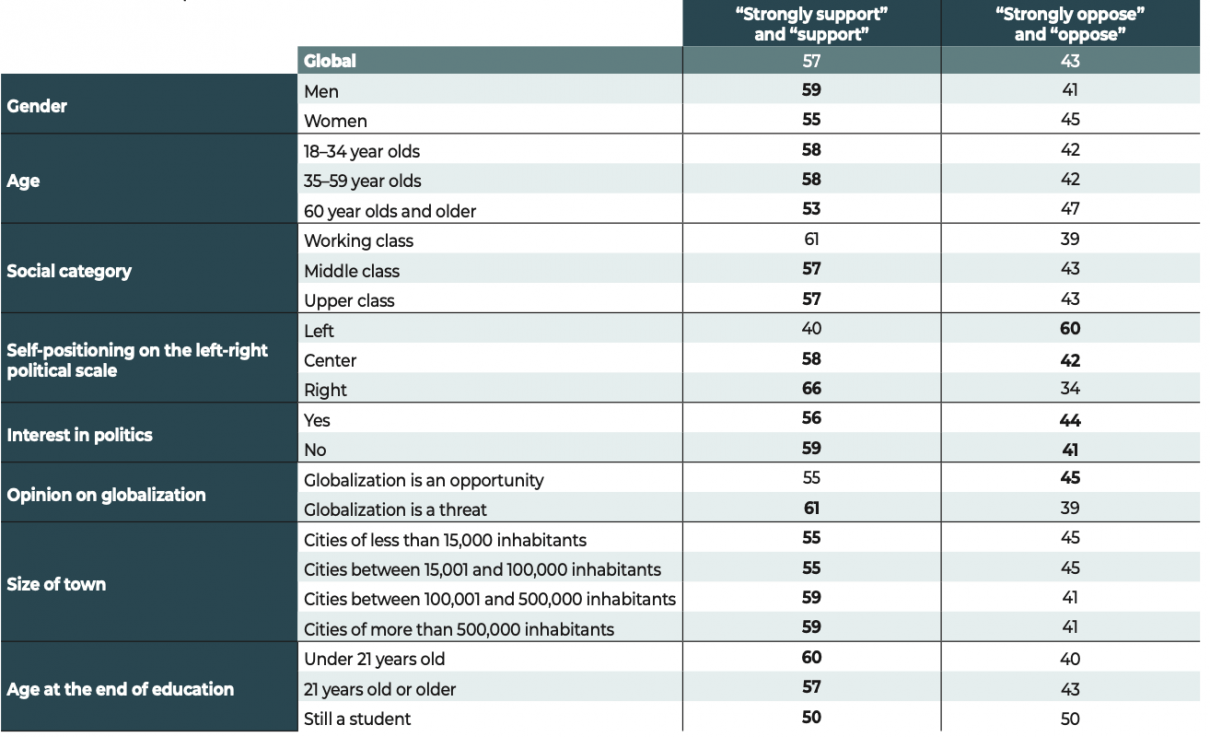
Copyright :
Fondation pour l’innovation politique – January 2022
Who is in favor of abortion rights, and who is against it? (in %)
Question: “Do you support or oppose abortion rights?”
Base: the entire sample
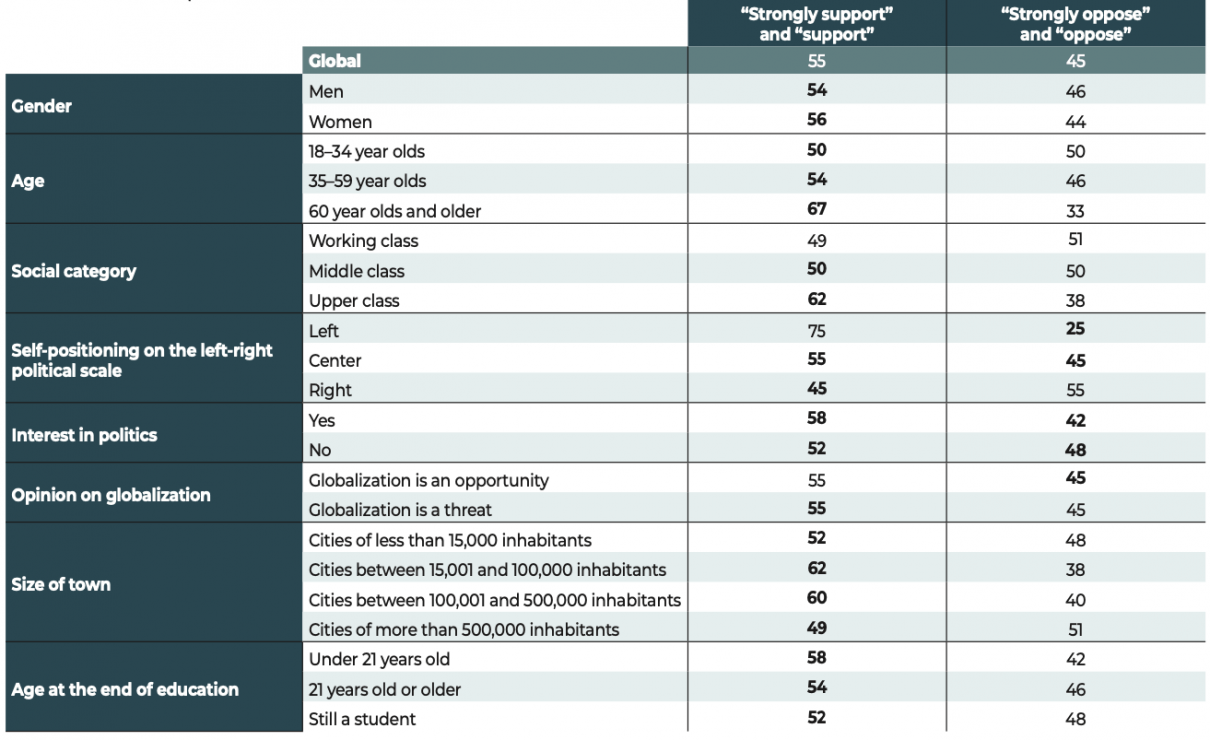
Copyright :
Fondation pour l’innovation politique – January 2022
See Center for Reproductive Rights, “The World’s Abortion Laws”, repoductiverights.org, 2021.
Abortion rights are being challenged
Public tolerance for abortion rights varies depending on the political, social and cultural context in the various countries. Likewise, depending on their beliefs, respondents adopt more or less progressive or conservative positions on the issue of abortion.
Overall, 45% of respondents said that they are opposed to abortion rights. While a majority (55%) are in favor of them, there does not seem to be any guarantee that these rights will be maintained across the generations: for instance, half of 18–34-year-olds (50%) are against abortion rights, compared with 33% of people aged 60 and over. The differences by gender are too small to be significant, but there seems to be slightly more opposition among men (46%) than women (44%). Within lower-income (51%) and mid-income (50%) categories, hostility to abortion rights is far stronger than among higher-income sections of the population (38%). Marital status is another indicator: opposition to abortion rights is significantly stronger among married respondents (47%) than those who are divorced or separated (33%). In the same way, a majority (56%) of respondents who have three or more children are not in favor of abortion rights, compared with 41% of respondents with no children. The perception of the future offers another framework for interpretation: individuals who believe that their country will be in a worse position tomorrow than today are less likely to be against abortion (41%) than those who believe that their country will be better tomorrow than it is now (55%).
We know that there are significant differences in legislation between the various states: in some countries, abortions are permitted unconditionally when requested by women; in other countries, they are strictly forbidden and punished. Between these two scenarios, many countries allow abortions under certain conditions, which are more or less restrictive, such as when pregnancies are the result of rape or incest, when there are fetal malformations, when there are risks to the pregnant woman’s physical or mental health, etc. Among the countries studied as part of our survey, only Malta and the Philippines have prohibited all types of abortion, which their citizens are satisfied with: 87% of the Maltese and three in four Filipinos (76%) are opposed to abortion rights. Malta, where the vast majority of people are Catholic, is still the only country in the European Union where abortion is strictly forbidden; women who voluntarily terminate their pregnancies and their practitioners face up to three years in prison.
In other countries, abortions are only permitted if the pregnant woman’s life is in danger. This is the case in Brazil, Indonesia, Lebanon, Mexico and Nigeria. In these countries, the populations are strongly opposed to abortion rights. Since January 2021, following a ruling by its constitutional court, Poland has introduced tighter legal conditions restricting access to abortion. Abortions are now only permitted if women are pregnant as a result of rape or incest or if their life is in danger. This legislation has led to a number of protests. More than half of Poles are in favor of abortion rights.
In the other countries in our study where pregnant women have the right to opt for an abortion, hostility to abortion rights is highest among Georgians (74%), Albanians (70%), Montenegrins (69%), Kosovars (66%), Moldovans (61%), Tunisians (58%) and Cypriots (51%).11
In the United States, two-thirds of respondents (67%) support abortion rights, consistent with the levels registered in 2018 (68%) and 2017 (64%). There has always been a divide between Democrats and Republicans when it comes to abortion rights, and our data show that just 9% of Americans who are on the left of the political scale are against abortion rights, compared with 49% of people on the right.
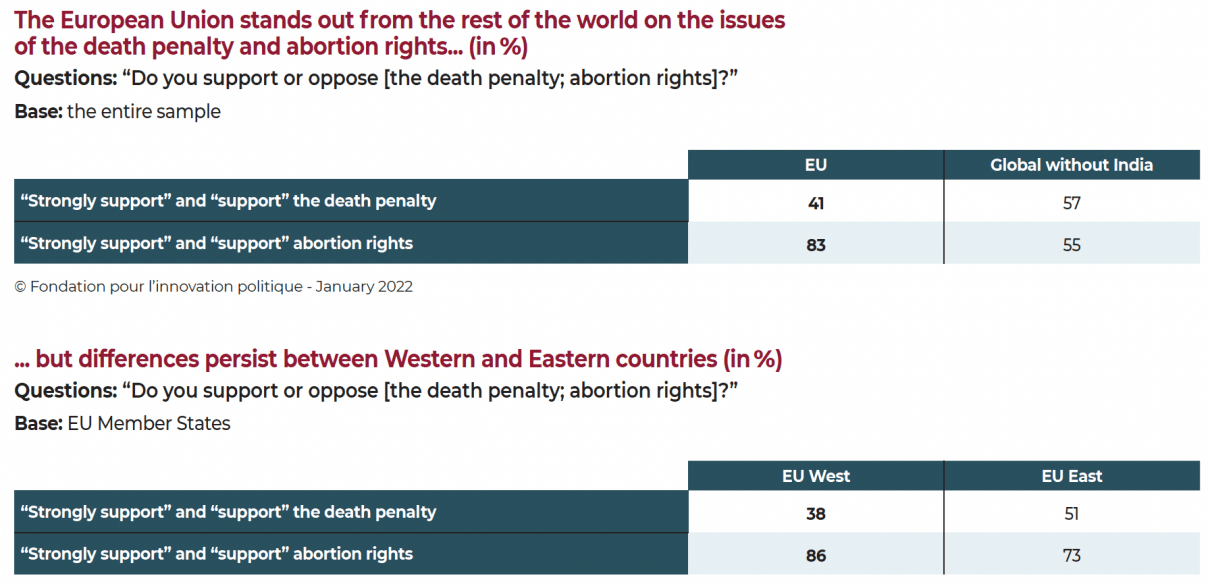
Copyright :
Fondation pour l’innovation politique – January 2022
Level of support for abortion rights (in %)
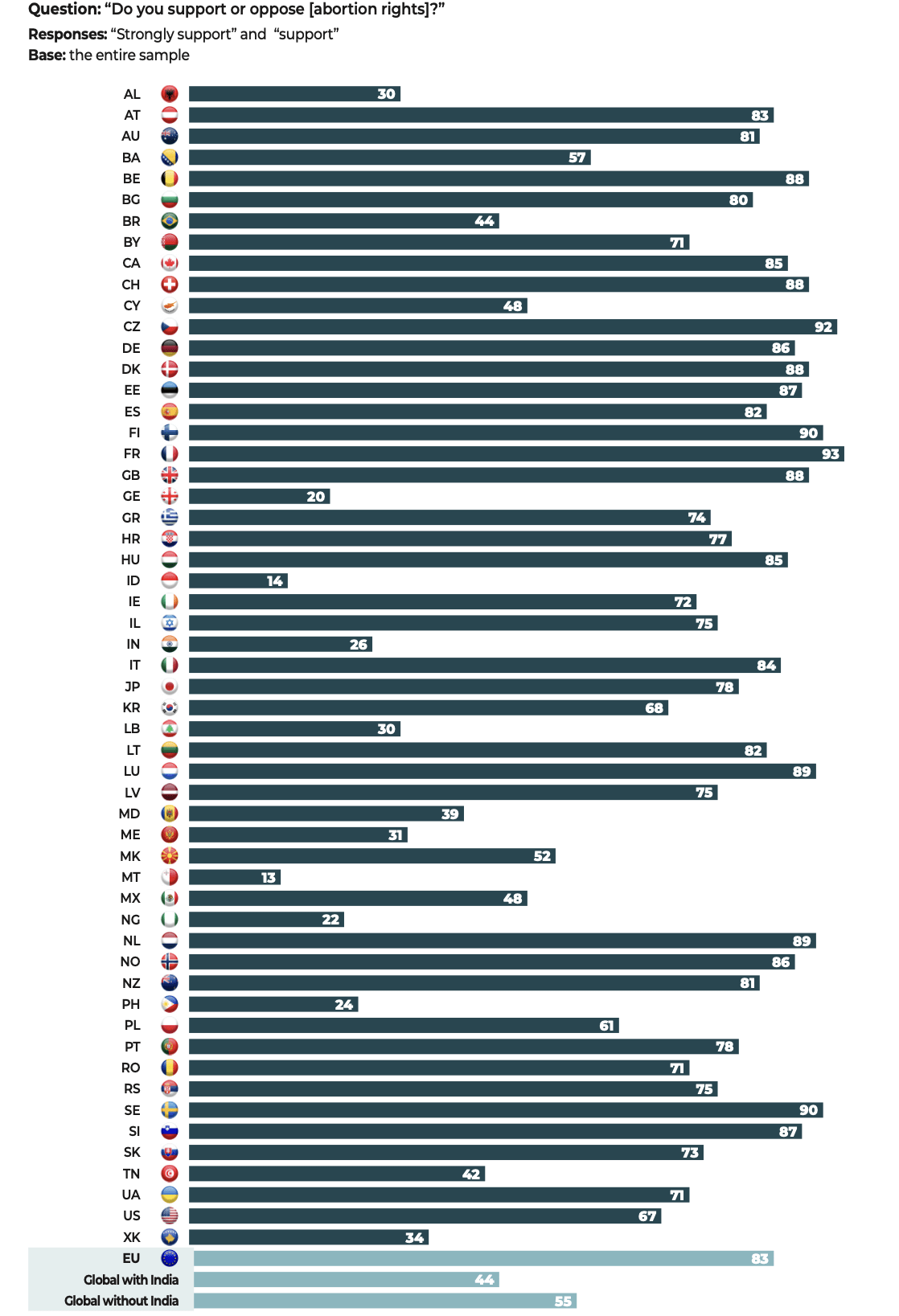
Copyright :
Fondation pour l’innovation politique – January 2022
Level of support for the death penalty (in %)
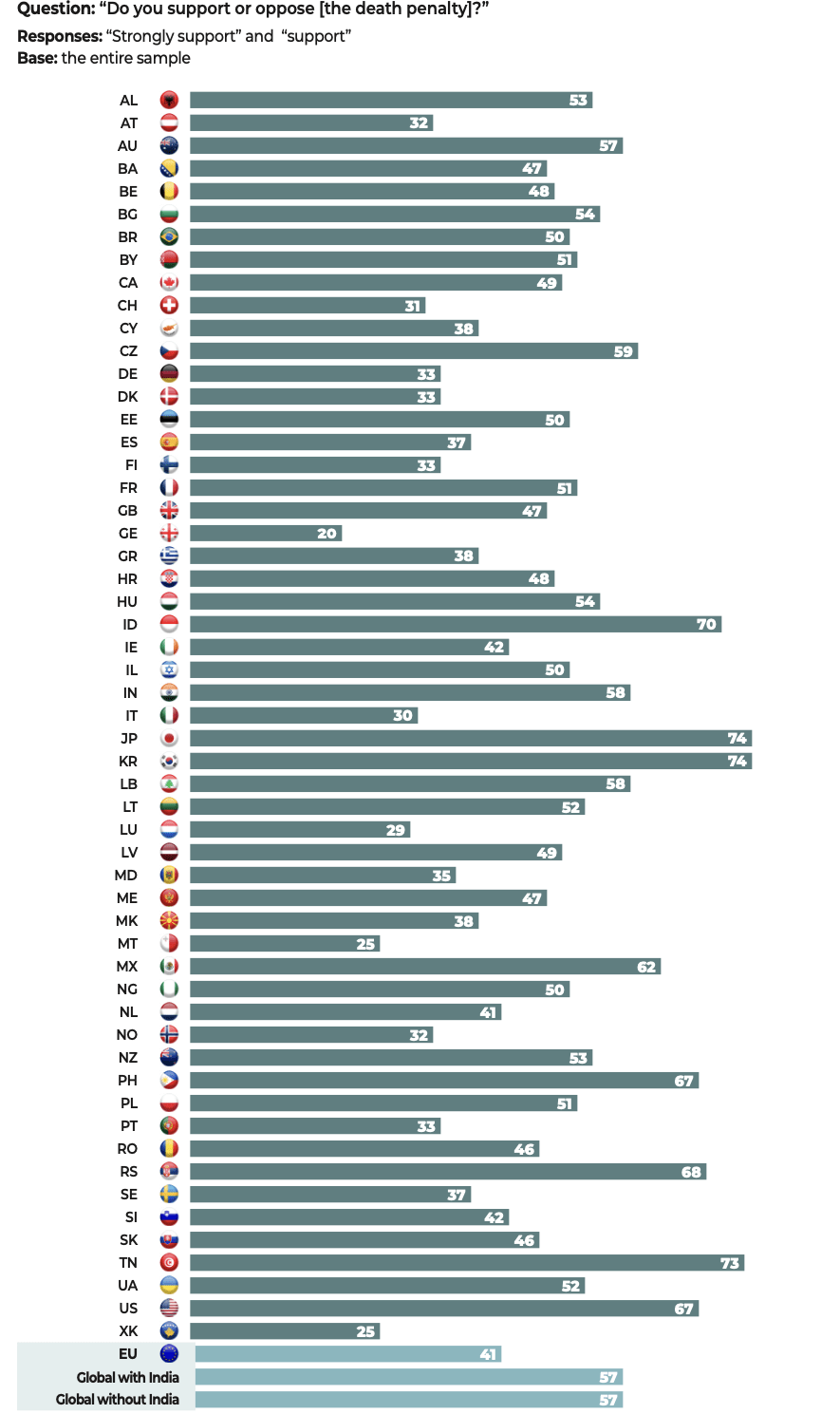
Copyright :
Fondation pour l’innovation politique – January 2022
The State should give businesses more freedom
The democratic world has a positive view of globalization. Nearly two-thirds of respondents view it as “an opportunity” (65%) rather than a threat (35%). Our findings also reveal an attachment to economic liberalism, defined here as limiting the government’s role in the economy and strengthening the freedom of enterprises: 58% believe that “the role of the government in the economy should be limited and the freedom of enterprises should be strengthened”, while 42% would like to see a stronger role for the government and increased control over enterprises.
The freedom of companies is wished for by all socio-professional categories (in %)
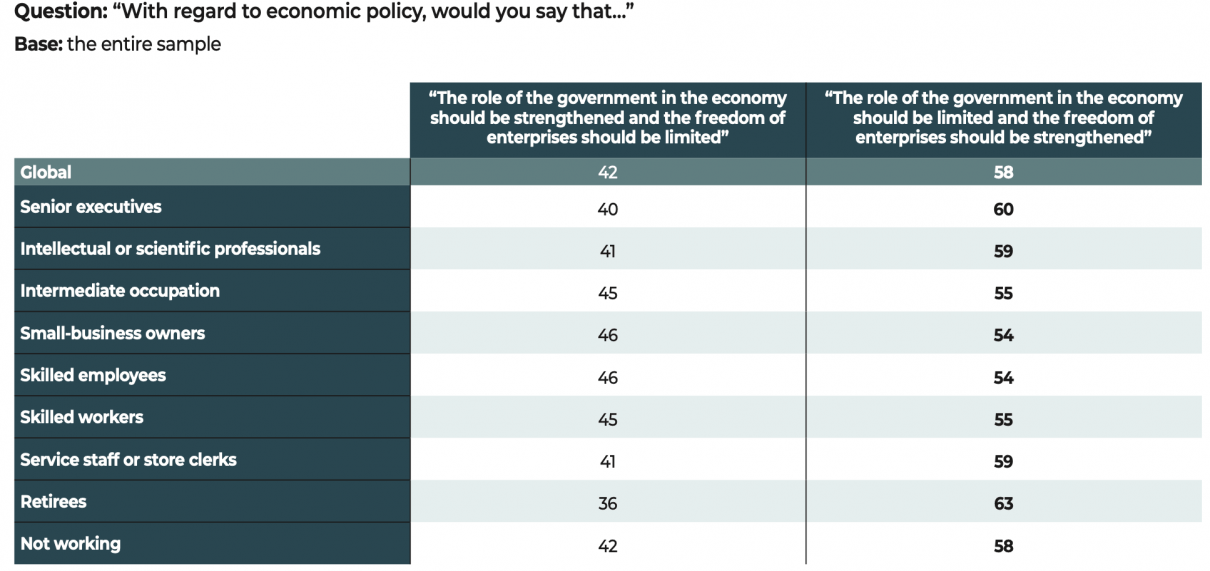
Copyright :
Fondation pour l’innovation politique – January 2022
Note: the difference between totals and 100% represents non-responses.
Should the state strengthen the freedom of companies? (in %)
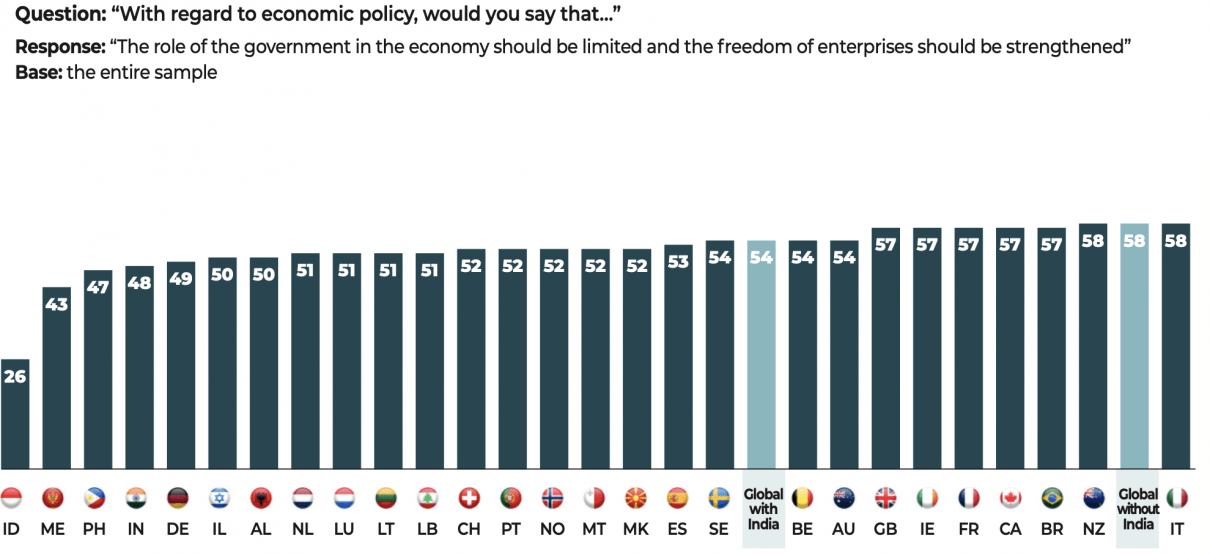
Copyright :
Fondation pour l’innovation politique – January 2022
| Economic liberalism and political liberalism in Central Europe
“At the same time that the reconfiguration of the intellectual and political field favored a rediscovery of political liberalism, the decomposition of the socialist economy and the failure of reforms favored the rediscovery of economic liberalism. Thus, especially in Poland and Hungary, and later in Czechoslovakia, liberal economic thought was presented as an alternative to the failure of statism. The authors were very familiar with the blockages of the administered economy, but knew very little about the functioning of “real capitalism” in the West. After forty years of statism, the minimal state seemed to be the appropriate response to the crisis, and in the context of the 1980s, marked by the influence of “neo-liberalism” in the West, the liberals of the dying socialism readily turned to the free-market theorists of the Chicago School, who – just so happened to be… from Central Europe! The historian Tony Judt speaks of the neo-liberalism of the Reagan-Thatcher years as “the revenge of the Austrians”: Hayek, von Mises, Schumpeter, Popper, Drucker, all born in the four corners of the Austro-Hungarian Empire, all of them marked by the Austrian catastrophe and the question: why and how can a liberal democracy be created? question: why and how had a liberal democracy succumbed, between February 1934 and the Anschluss of 1938, to the totalitarian temptation. The best guarantee for preserving an “open society”, they concluded, was to minimize the state’s interference in the economy and society. This message was taken up by the liberal economists who developed the economic reforms for the exit from communism after 1989.” Jacques Rupnik, “La crise du libéralisme en Europe centrale”, |
In a world of distrust, companies still inspire trust (in %)

Copyright :
Fondation pour l’innovation politique – January 2022
Should the state strengthen the freedom of companies? (in %) – continued
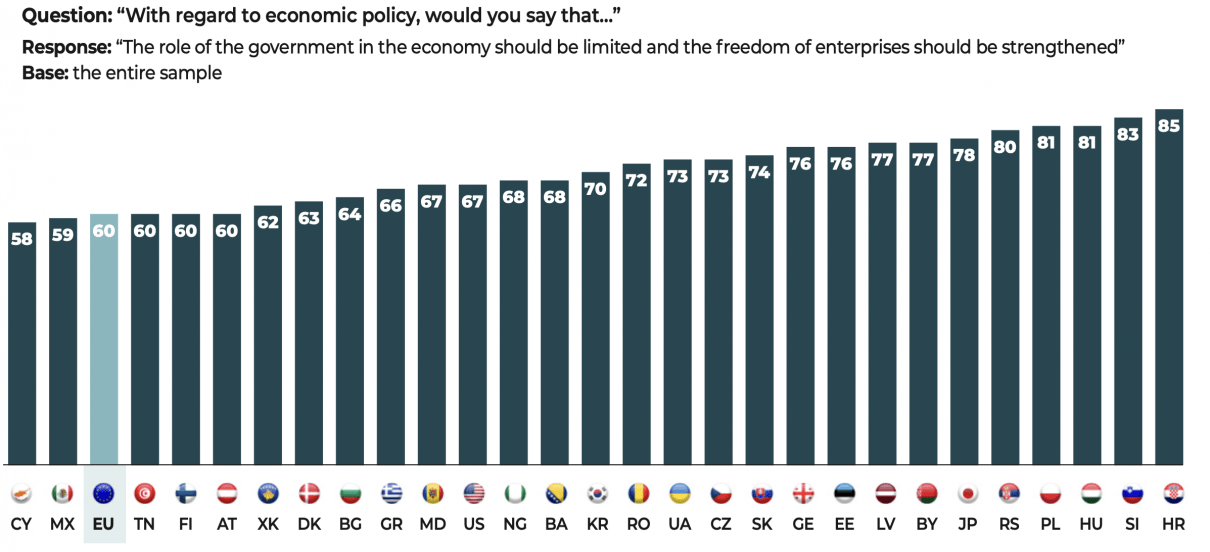
Copyright :
Fondation pour l’innovation politique – January 2022
Faced with the challenge of Covid-19, citizens reclaim their attachment to the ideals of freedom
Only a minority of respondents are willing to scale back their freedom in exchange for greater efficiency
In the democratic world, two-thirds (67%) of respondents chose the following answer: “Even if it made the government more efficient, I would not accept having fewer freedoms”. However, some people would be willing to reduce their freedoms in exchange for an expected increase in efficiency. China’s handling of the Covid-19 pandemic may have strengthened public support for the acceptability of authoritarian power among certain people. Half of our survey’s respondents (51%) agree with the idea that “authoritarian governments are more efficient than democratic governments in overcoming pandemics such as the Covid-19 crisis”, while 49% disagree with this statement.
One-third of respondents (33%) chose the following option: “I would not mind having less freedom if it made the government more efficient”. To some extent, this opinion may persist in the future if we consider the age of our respondents: 35% of 18–34-year-olds, 34% of 35–59-year-olds, and 28% of people aged 60 and over would be willing to see their freedom scaled back. The under 35s (61%) are also more inclined to believe that authoritarian regimes are more efficient at handling pandemics (36% among people aged 60 and over).
Among respondents who said that “being led by a strongman” is a good thing, two-thirds (66%) believe that authoritarian governments are the most effective in dealing with a pandemic. This idea is also widespread (71%) among people who are in favor of having the armed forces govern the country.
Among those who would be willing to cut back “a little on their freedoms if it would make government more effective,” 62% say they agree that “authoritarian governments are more effective than democratic governments in overcoming pandemics, such as the Covid-19 crisis” (in %)

Copyright :
Fondation pour l’innovation politique – January 2022
Among those who think that “authoritarian governments are more effective than democratic governments in overcoming pandemics, such as the Covid-19 crisis”, 60% say they would not agree to having their freedoms curtailed “a little bit even if it made the government more effective” (in %)

Copyright :
Fondation pour l’innovation politique – January 2022
Restricted liberty, government efficiency and pandemics (in %)
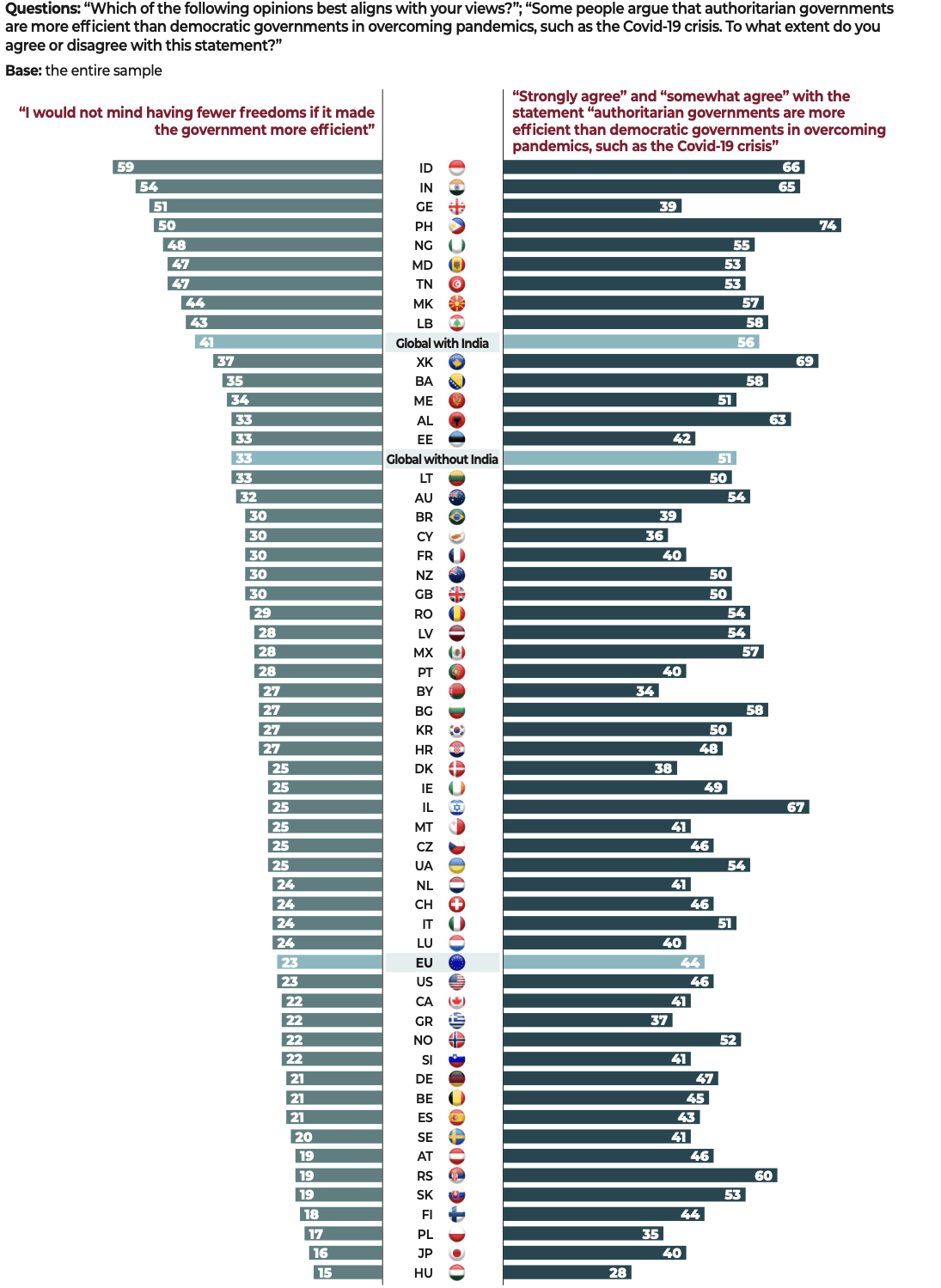
Copyright :
Fondation pour l’innovation politique – January 2022
Attachment to freedom is almost unanimous
The respondents believe in the importance of the ability to protest (83%), the ability to take part in the decision-making process (95%), the ability to vote for the candidate of your choosing (96%), having the right to say what you think (96%) and having freedom of the press (94%).
Hybrid regimes in search of democracy and freedom (in %)
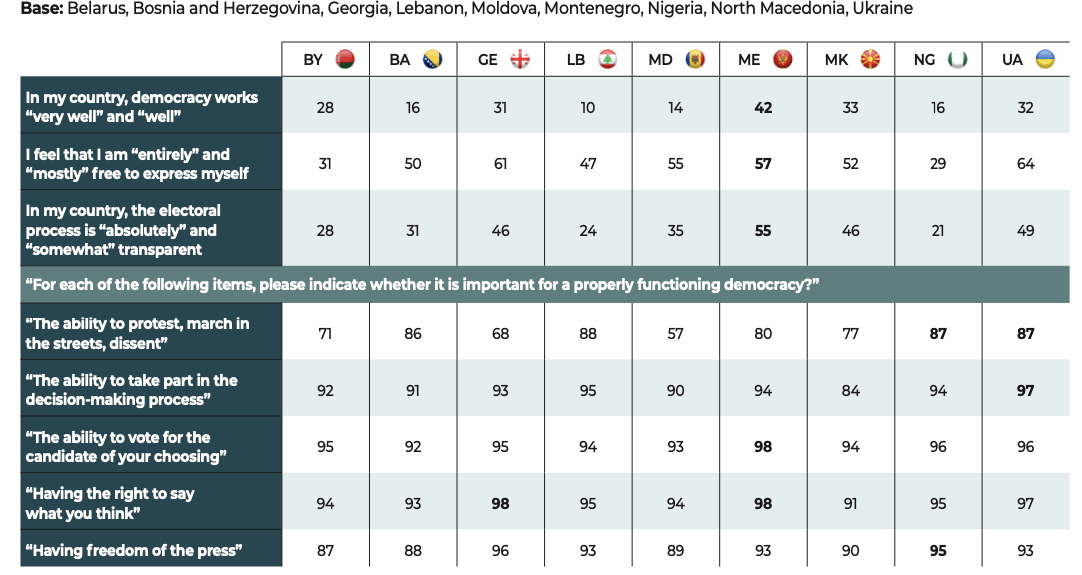
Copyright :
Fondation pour l’innovation politique – January 2022
Democracy Index 2020: In sickness and in health?, The Economist Intelligence Unit, 2021, p. 3.
“Hybrid regimes: Elections have substantial irregularities that often prevent them from being both free and fair. Government pressure on opposition parties and candidates may be common. Serious weaknesses are more prevalent than in flawed democracies — in political culture, functioning of government and political participation. Corruption tends to be widespread and the rule of law is weak. Civil society is weak. Typically, there is harassment of and pressure on journalists, and the judiciary is not independent”, ibid., p. 57).
“Authoritarian regimes: In these states, state political pluralism is absent or heavily circumscribed. […] Some formal institutions of democracy may exist, but these have little substance. Elections, if they do occur, are not free and fair. There is disregard for abuses and infringements of civil liberties. Media are typically state-owned or controlled by groups connected to the ruling regime. There is repression of criticism of the government and pervasive censorship. There is no independent judiciary”, ibid.).
Kosovo was not studied as part of the Democracy Index 2020 and is therefore not included here.
It is interesting to note that in countries that have less democratic regimes or that are struggling to adopt democracy, respondents aspire to more freedom. The Democracy Index 2020 classifies the status of regimes around the world based on four categories:12 full democracy, flawed democracy, “hybrid regime”13 or “authoritarian regime”.14 To achieve this, it uses several criteria relating to the quality of the electoral process, pluralism, the functioning of government, political participation, political culture, civil liberties, etc. Eight of the countries researched as part of our survey15 are considered to be “hybrid” regimes (Bosnia and Herzegovina, Georgia, Lebanon, North Macedonia, Moldova, Montenegro, Nigeria and Ukraine), while Belarus is classified as an authoritarian regime. In these nine countries, our data show that a negative view of how democracy works and the rule of law is accompanied by aspirations for more freedom and democracy.
FONDATION POUR L’INNOVATION POLITIQUE
Created in 2004, the Fondation pour l’innovation politique has an economically liberal, progressive and European perspective. Through its work, it has two objectives: to contribute to a pluralist and informed debate, and to inspire public decision-making.
As a state-recognized organization, the website fondapol.org provides public access to all the Foundation’s work. Anyone can access and use all the data gathered for the various surveys via the “data.fondapol” platform, made available in accordance with a government policy desiring the sharing of public data. Moreover, when it comes to international surveys, the data are available in the different languages of the questionnaire; for example, in 45 languages for the survey Freedoms at risk: the challenge of the century, conducted in 55 countries.
Furthermore, reflecting the Foundation’s editorial policy, our blog “Anthropotechnie” aims to explore new avenues prompted by human enhancement, reproductive cloning, human/ machine hybridization, genetic engineering and germline manipulation. It contributes to thinking and debate on transhumanism. “Anthropotechnie” offers articles tackling ethical, philosophical and political issues associated with the expansion of technological innovations relating to the enhancement of human bodies and abilities.
The Fondation pour l’innovation politique is independent and receives no financial support from any political party. Its funding comes from both public and private sources.
Governing bodies of the Fondation pour l’innovation politique
Supervisory Board
Nicolas Bazire – Chairman, Managing Director of Arnault Group
Grégoire Chertok – Vice-Chairman, Managing Partner of Rothschild & Co.
Valérie Bernis – Independent Director on the boards of Atos, France Télévision and L’Occitane.
Michel Bettan – Executive Vice-President of Havas Paris
Aldo Cardoso – Chairman of Bureau Veritas and Smeg and board member of several companies
Geneviève Ferone Creuzet – President of Casabee
Pierre Giacometti – Co-founder of the communication strategy consulting firm No Com and adviser
Changjian Jiang – Associate Professor of International Relations at Fudan University (China)
Olivier Labesse – Associate and Managing Director of DGM Conseil
Anne Levade – Public Law Professor at Paris-Est-Créteil University, President of the Association française de droit constitutionnel
Blanche Lochmann – member of MGEN mutual health insurance group
Francis Mer – Chairman of the Fondation pour l’innovation politique between 2004 and 2005, former French Minister of the Economy, Finance and Industry (2002-2004)
Sébastien Proto – Deputy Manager at Société Générale, head of the Société Générale France and Crédit du Nord networks, and of the innovation, technology and IT departments
Salima Saa – Prefect of the Corrèze department
Executive Board
Dominique Reynié – Executive Director, University Professor at Sciences Po, Paris
Anne Flambert – Administrative and Financial Director
Auditing Committee
Jean-Daniel Lévy – Chartered accountant and graduate of Sciences Po, Paris
Jacques Pradon – Doctor of law and Honorary Lawyer to the Conseil d’État and the Cour de Cassation
Ethics Committee
Hélène Gisserot – Chairwoman, Honorary General Prosecutor at the Cour des Comptes
Hugues Hourdin – Honorary Councillor of State and a member of the Paris bar
Dominique Latournerie – Member of the Conseil d’État
Scientific and Evaluation Council
Christophe de Voogd – Chairman
Bruno Bensasson, Élisabeth De Castex, Stéphane Courtois, Julien Damon, Laurence Daziano, Marc Fornacciari, Emmanuel Goldstein, Erwan Le Noan, Pascal Perrineau, Xavier Quérat-Hément, Robin Rivaton, Alain-Gérard Slama, Luuk Van Middelaar
INTERNATIONAL REPUBLICAN INSTITUTE
A nonprofit, nonpartisan organization, the International Republican Institute (IRI) advances freedom and democracy worldwide by helping political parties to become more responsive, strengthening transparent and accountable governance, and working to increase the role of marginalized groups in the political process – including women and youth.
IRI works with organizations and individuals across the globe to help citizens build democratic societies that are open and responsible, accountable, and resilient. Collaboration is essential to fulfilling our mission in rapidly changing international landscapes.
For more than 30 years, we have been helping to strengthen democracy through workshops by volunteer experts from all over the world on multi-party-political systems, democratic governance, women’s empowerment, civil society development, youth leadership, strengthening electoral processes, and public opinion research. Research and qualitative and quantitative public opinion data are cornerstones of IRI’s approach to programming. Our data ensures citizens’ needs are at the center of the political debate and guide our projects’ goals. Since 1983, IRI has monitored over 200 elections in 60 countries through international observation missions and assessments.
To learn more about IRI’s work around the world, get involved, or contact us, visit our website at www.iri.org.
Governing bodies of the International Republican Institute
Board of Directors
Sen. Dan Sullivan – Chairman, US Senator (Alaska)
Randy Scheunemann – Vice Chairman, Strategic Counselor, Halifax International Security Forum
Alec L. Poitevint II – Secretary-Treasurer, Businessman and Chair of the 2012 Republican Convention
Kelly Ayotte – Former US Senator (New Hampshire)
Judy A. Black – Policy Director, Brownstein Hyatt Farber Schreck
Gahl Hodges Burt – Vice Chair, the American Academy in Berlin
Sen. Tom Cotton – US Senator (Arkansas)
Sen. Joni Ernst – US Senator (Iowa)
Frank J. Fahrenkopf Jr. – Co-chairman of the Commission on Presidential Debates
Alison B. Fortier – Vice President for Missile Defense and Strategic Systems, Lockheed Martin (ret.)
Christopher J. Fussner – Owner and Founder of TransTechnology Pte Ltd
Sen. Lindsey Graham – US Senator (South Carolina)
Rep. Kay Granger – US Representative (Texas, 12th District)
Cheryl F. Halpern – Partner, HQ Creative LLC
William J. Hybl – Chair of the US Commission on Public Diplomacy
Mark Kirk – Former US Senator (Illinois)
James T. Kolbe – Former US Representative (Arizona, 5th District)
David Kramer – Senior Director for Human Rights and Human Freedoms at the McCain Institute
Tami Longaberger – Businesswoman
Peter T. Madigan – Member of the Board, the School of Policy and International Affairs at the University of Maine
General H.R. McMaster – Former National Security Advisor
Constance Berry Newman – Former Assistant Secretary of State for African Affairs
Sen. Mitt Romney – US Senator (Utah)
Sen. Marco Rubio – US Senator (Florida)
Joseph R. Schmuckler – Member of the Board, the London Center for Policy Research
Amb. Kristen Silverberg – Former US Ambassador to the European Union
Frances Townsend – President of the Counter Extremism Project
Amb. Gaddi Vasquez – Former Director of the Peace Corps
Olin L. Wethington – Founder and Chairman of Wethington International LLC
Dana W. White – former Assistant to the Secretary of Defense for Public Affairs
Executive Leadership
Dr. Daniel Twining – President
Kimber Shearer – Counsel – Vice President for Strategy and Development
Daniel W. Fisk – Executive Vice President
Scott Mastic – Vice President for Programs
COMMUNITY OF DEMOCRACIES
The Community of Democracies is a global intergovernmental coalition comprised of the Governing Council Member States that support adherence to common democratic standards and values outlined in the Warsaw Declaration. The Community of Democracies is committed to taking concerted action to advance and protect democratic freedoms, strengthen democratic institutions, and expand political participation.
Through the Warsaw Declaration and subsequent Ministerial Declarations, Member States have consistently reaffirmed their commitment to core democratic values, including: partnership with civil society, dialogue and peer learning, advocacy on behalf of democratic standards, international collaboration, pluralism, civic education, support for emerging democracies, and economic prosperity as a foundation for democracy.
Governing Council Member States for the Community of Democracies
The Community of Democracies is a global intergovernmental coalition comprised of the following Governing Council Member States:
Argentina
Canada
Chile
Costa Rica
El Salvador
Estonia
Finland
Georgia
Guatemala
Hungary
India
Italy
Japan
Lithuania
Mexico
Mongolia
Morocco
Nigeria
Norway
North Macedonia
Poland
Portugal
Republic of Korea
Romania (Current Presidency of the Community of Democracies)
Sweden
United States of America
Uruguay
United Kingdom.
Thomas E. Garrett – Secretary General of the Permanent Secretariat of the Community of Democracies.
KONRAD-ADENAUER-STIFTUNG
The Konrad-Adenauer-Stiftung (KAS), a political foundation close to the Christian Democratic Union of Germany (CDU), is committed to peace, freedom and justice at both the national and international levels. The main themes they focus on are the consolidation of democracy, the promotion of European unification, the intensification of transatlantic relations and cooperation in development policy.
Each year, KAS disseminates its expertise through some 100 publications in several languages and supports 3,000 scholarship recipients. Based in Berlin and Sankt Augustin, KAS is also represented in over 120 countries. In 2020, it organized more than 4,000 events around the world that were attended by nearly 800,000 people.
The KAS opened an office in France in 1980. Its main objective is to contribute to the intensification of the dialogue between France and Germany and thus to encourage the deepening of the European integration process. To this effect, KAS France prepares various studies and newsletters on the political, economic and social situations for both countries. In addition, KAS regularly initiates and organizes events for a selected audience of specialists in France and Germany.
Board of Directors Konrad-Adenauer-Stiftung
Dieter Althaus – Minister-President (retired), Vice President for Governmental Affairs MAGNA Europe
Ralph Brinkhaus MP – co-opted Chairman of the CDU/CSU parliamentary group in the German Bundestag
Dr. Christoph Brand – Treasurer of the Konrad-Adenauer-Stiftung e.V.
Tanja Gönner – Chairwoman of the Management Board of the German Association of International Cooperation (Deutsche Gesellschaft für Internationale Zusammenarbeit, GIZ)
Hermann Gröhe MP – Federal Minister (retired), Deputy Chairman of the CDU/CSU parliamentary group, Deputy Chairman of the Konrad-Adenauer-Stiftung e.V.
Michael Grosse-Brömer MP – co-opted Chief Whip of the CDU/CSU parliamentary group at the German Bundestag
Prof. Dr. Hans Walter Hütter – President of the Haus der Geschichte der Bundesrepublik Deutschland Foundation
Annegret Kramp-Karrenbauer – Federal Minister of Defense (retired)
Prof. Dr. Norbert Lammert – President of the German Bundestag (retired). Chairman of the Konrad-Adenauer-Stiftung e.V.
Armin Laschet MP – Minister-President (retired), Chairman of the CDU
Dr. Angela Merkel – Federal Chancellor of the Federal Republic of Germany (retired)
Hildegard Müller – Secretary of State (retired), President of the German Association of the Automotive Industry (Verband der Automobilindustrie, VDA)
Hildigund Neubert – Secretary of State (retired), Deputy Chairwoman of the Konrad-Adenauer-Stiftung e.V.
Prof. Dr. Beate Neuss – Deputy Chairwoman of the Konrad-Adenauer-Stiftung e.V.
Prof. Dr. Andreas Rödder – Holder of the Chair for Modern and Contemporary History at the Johannes Gutenberg University Mainz
Prof. Dr. Jürgen Rüttgers – Minister-President (retired)
Dr. Wolfgang Schüssel – co-opted Federal Chancellor of the Republic of Austria (retired).Chairman of the Konrad-Adenauer- Stiftung e.V. Board of Trustees
Prof. Dr. Dr. Thomas Sternberg – Former President of the Central Committee of German Catholics (Zentralkomitee der deutschen Katholiken, ZdK)
Dr. Sabine Sütterlin-Waack – Minister of the Interior, Rural Areas, Integration and Gender Equality of Schleswig-Holstein and President of the Hermann Ehlers Stiftung e.V.
Michael Thielen – Secretary General of the Konrad-Adenauer-Stiftung e.V.
Prof. Dr. Bernhard Vogel – Minister-President (retired). Honorary Chairman of the Konrad-Adenauer-Stiftung e.V.
Klaus Welle – Secretary General of the European Parliament
Prof. Dr. Birgitta Wolff – Professor of Business Administration, President of the Goethe University Frankfurt am Main (retired)
THE GENRON NPO
The Genron NPO is an independent, non-profit think tank based in Japan. Established in 2001, it is the only venue in the country offering responsible political debate.
The Genron NPO’s aim is to strengthen Japanese democracy. It has been the only organization to research various policies and evaluate party manifestos during every general election. It has also hosted many high-level policy debates and publicly announces the information discussed, enabling citizens to make their own judgements about the government and the policies it implements.
In Asia, it has organized an array of Track II diplomatic efforts that have exerted an influence on the situation in Northeast Asia, including the Asia Peace Conference, a multi-lateral dialogue between Japan, the US, China, and South Korea on security agendas in the region. Outside of Northeast Asia, The Genron NPO continuously strives to facilitate responsible collective actions to tackle pressing cross-border challenges by establishing the Tokyo Conference, the first discussion platform in Japan that addresses the global agenda with think tank partners from like-minded democratic countries.
The Genron NPO was founded by Yasushi Kudo, former editor-in-chief of the Japanese political journal, Ronso Toyo Keizai.
Advisory Board the Genron NPO
Yasushi Akashi – Chairman of the Kyoto International Conference Center; Former United Nations Under-Secretary-General
Ichiro Fujisaki – President, The America- Japan Society; former Ambassador to the USA
Yasuchika Hasegawa – Former Chairman of Japan Association of Corporate Executives
Yoriko Kawaguchi – Fellow, Faculty of Global Studies of Musashino University; Former Minister of Foreign Affairs and Minister of the Environment
Hiroya Masuda – Advisor of Nomura Research Institute; Former Minister of Internal Affairs and Communications
Takashi Matsumoto – President, Federation of National Public Service Personnel Mutual Aid Associations
Yuji Miyamoto – Chairman of Miyamoto Institute of Asian Research; Former Ambassador to the People’s Republic of China
Toshiro Muto – Honorary Chairman of Daiwa Institute of Research; Former Deputy Governor, Bank of Japan
Yuzaburo Mogi – Honorary CEO and Chairman of the Board, Kikkoman Corporation
Mistuo Ohashi – Honorary Advisor, Showa Denko k.k.
Kazuo Ogoura – Senior Advisor, Japan Foundation; former Ambassador to the Republic of Korea
Takeshi Sasaki – Honorary Professor of the University of Tokyo
Shinsuke Sugiyama – Former Ambassador to the USA, Former Vice Foreign Minister
Akihiko Tanaka – President of the National Graduate Institute for Policy Studies (GRIPS), Former President of the Japan International Cooperation Agency (JICA)
Osamu Watanabe – Representative Director and Chairman, Japan Petroleum Exploration Co., Ltd. ( JAPEX)
Chair of the Board
Yasushi Kudo – Founder and President of The Genron NPO
Board of Directors
Yaichiro Aizawa – Former National President of the Junior Chamber International Japan
Akihiko Kawashima – Representative Director of DMG MORI B.U.G.Co.,Ltd
Kyoya Kawanishi – President of K&S Accounting Office
Seiichi Kondo – Director, Kondo Institute for Culture & Diplomacy; Former Commissioner, Agency of Cultural Affairs
Shigeaki Okamoto – Former Vice-Minister of Finance, Ministry of Finance
Tatsuo Tanaka – Senior Advisor of Citigroup Global Markets Japan Inc.
Tomomichi Tomiie – Executive Manager of Operation and Systems Department and Corporate Strategy Department of the Sumitomo Mitsui Asset Management Co., Ltd.
Auditor
Manabu Matsuda – Former Member of House of Representative; Visiting Professor of the University of Tokyo
FUNDACIÓN NUEVAS GENERACIONES
The Nuevas Generaciones Foundation is a non-partisan, political think tank that is dedicated to the study and design of public policies and works with a global vision of reality: it combines technical and academic knowledge with the experience of productive actors, workers and employers. Its members have extensive experience in the private sector, in politics and in public, legislative or executive functions. Many of them also play an important role in their respective political parties or sectors.
Through its programs, the Fundación Nuevas Generaciones seeks to develop and promote policy proposals that generate and promote sustainable growth. To this end, it works with the three levels of government and studies the most successful local and international experiences, while at the same time paying special attention to human relations and the development of personal ties, which help guarantee the continuity of the projects undertaken. This is also why one of its main objectives is to ensure that its initiatives and actions have real and measurable political consequences.
Board of Directors Fundación Nuevas Generaciones
Alfredo Atanasof, Paula Bertol, Carlos Brown, Gustavo Ferrari, Mariano Gerván, Diego Guelar, Eduardo Menem, Federico Pinedo, Claudio Poggi, Ramón Puerta, Laura Rodríguez Machado, Leonardo Sarquís, Cornelia Schmidt Liermann, Jorge Srodek, Enrique Thomas, Pablo Tonelli, Pablo Torello, Norberto Zingoni
The New Generations
Manuel Abella Nazar Carlos Aguinaga (h), Valeria Arata, Cesira Arcando, Miguel Braun, Gustavo Cairo, Mariano Caucino, Juan de Dios Cincunegui, Omar de Marchi, Alejandro De Oto Gilotaux, Francisco De Santibañes, Soher El Sukaria, Ezequiel Fernández Langan, Gustavo Ferri, Christian Gribaudo, Marcos Hilding Ohlsson, Joaquín La Madrid, Luciano Laspina, Leandro López Koenig, Cecilia Lucca, Gonzalo Mansilla de Souza, Ana Laura Martínez, Germán Mastrocola, Nicolás Mattiauda, Adrián Menem, Victoria Morales Gorleri, Diego Carlos Naveira Julián, Martín Obiglio Francisco, Quintana Shunko Rojas, Damián Specter, Ramiro Trezza, José Urtubey
Executive Director
Julián Martín Obiglio
REPÚBLICA DO AMANHÃ
República do Amanhã is a non-profit that promotes debate on the major challenges facing society in terms of the technological paradigm shift generated by the digital and cognitive revolution. República do Amanhã acts by supporting, organizing and participating in debates, seminars, publications and studies, as well as through audiovisual production aimed at spreading knowledge and reflection. The think tank, founded and directed by Brazilian economist Octavio de Barros, currently has about 150 associate members, mostly intellectuals, artists, business leaders, economists, scientists, political scientists and teachers who believe in the systemic and interdisciplinary approach. Faced with the significant underestimation of the positive and negative impacts of the transformations underway, República do Amanhã believes that it is crucial to identify the values that animate and will animate contemporary societies. One of the main challenges associated with this initiative lies in institutional innovation at several levels, aimed at avoiding the risks of rupturing the social fabric in a world where technological innovation is constant and omnipresent.
República do Amanhã Supervisory Board
Cleide ALMEIDA – Philosopher, University Professor
Liliana SEGNINI – Sociologist, Professor (UNICAMP)
Valeria PEREIRA DA SILVA – Educator and consultant in education
Ana BARUFI – Economist, specialist in technological innovation
Executive Committee
Octavio DE BARROS – President, economist and vice-president of the France-Brazil Chamber of Commerce
Vasco CALDEIRA – Vice-President, architect-urbanist
Thomás DE BARROS – Thematic coordinator, University Professor at Sciences Po
Renée ZICMAN – Thematic coordinator, Executive Director of FAUBAI
Laerte SZNELVAR – Thematic coordinator, Professor at USP Anthony TAÏEB – Chief of operations, political scientist
Anthony TAÏEB – Chief of operations, political scientist

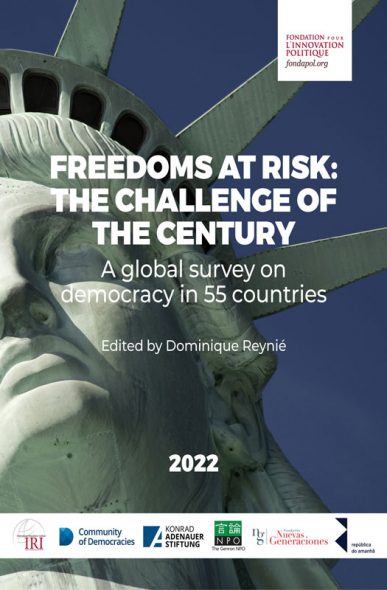
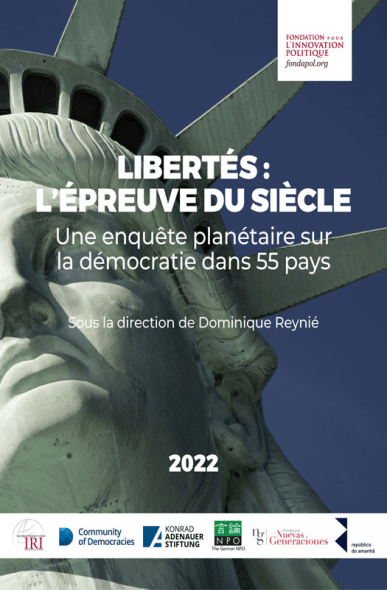
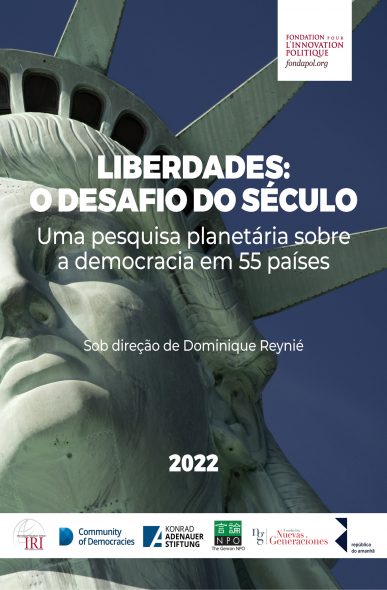
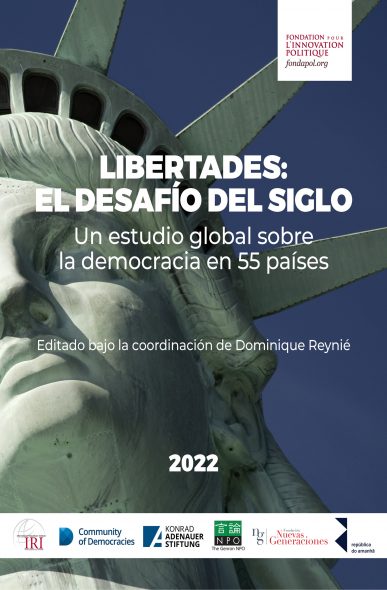
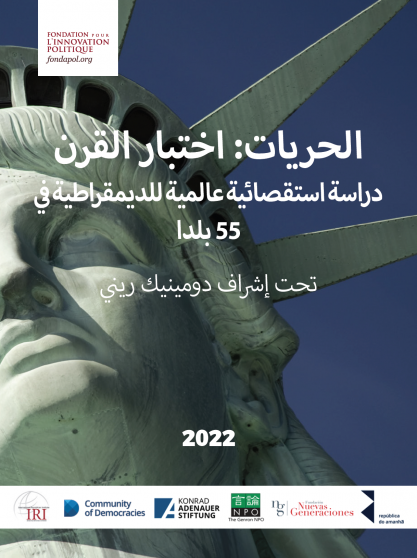
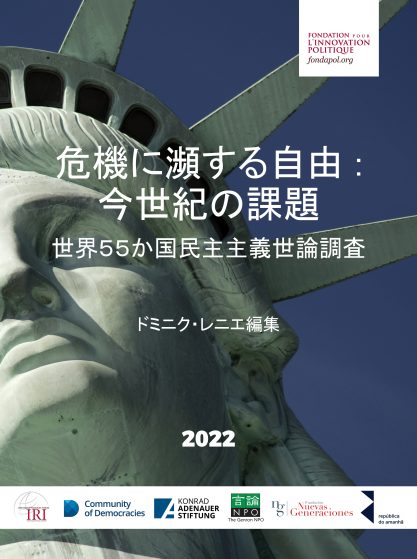

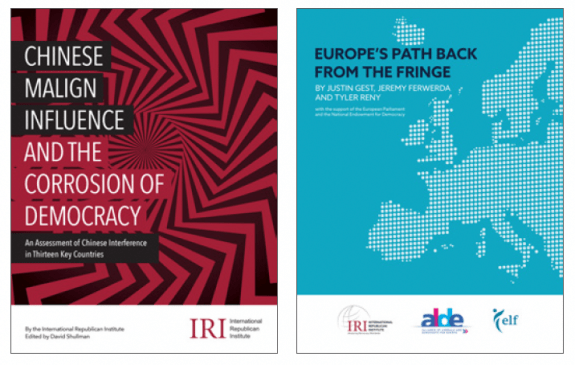
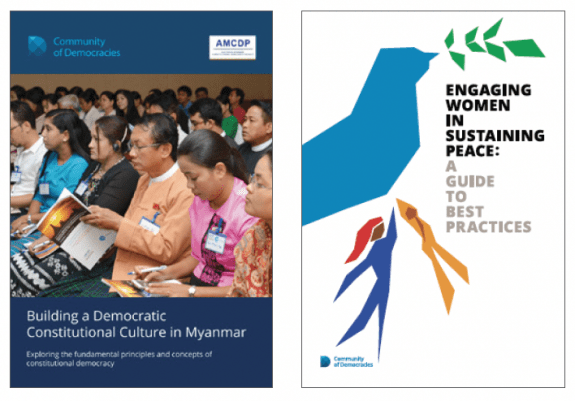
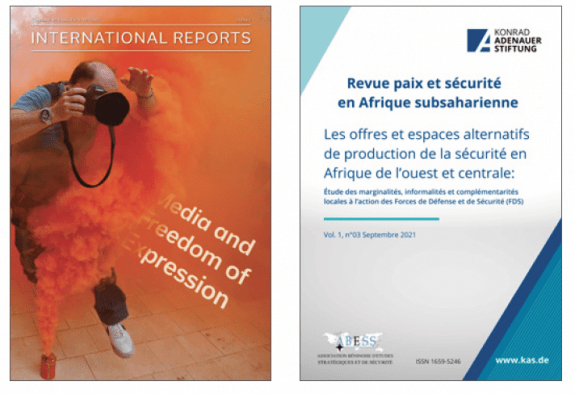
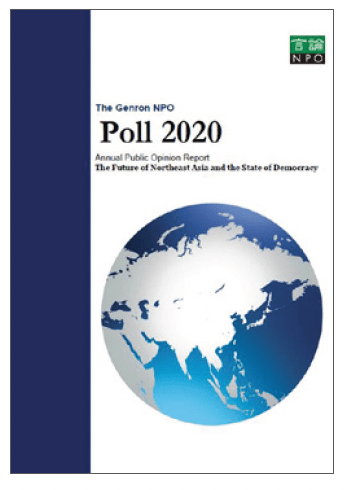
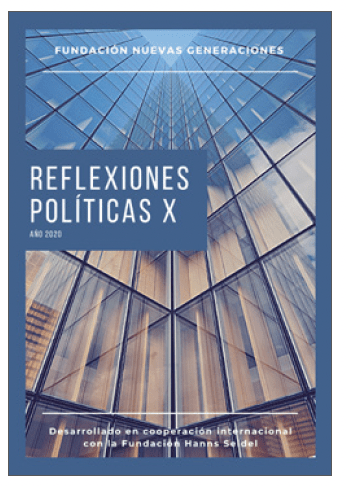
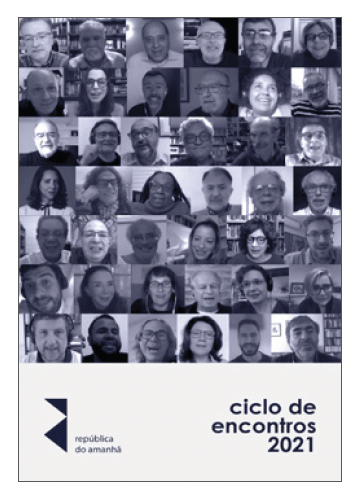

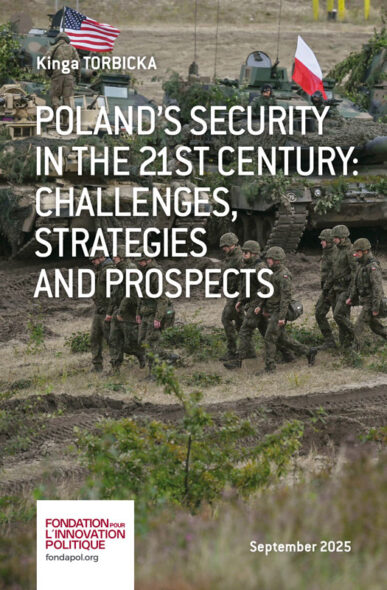
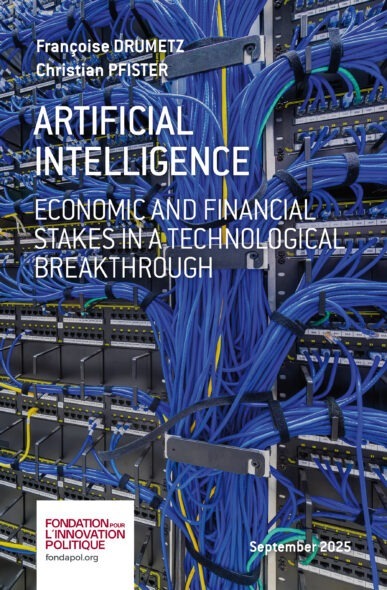
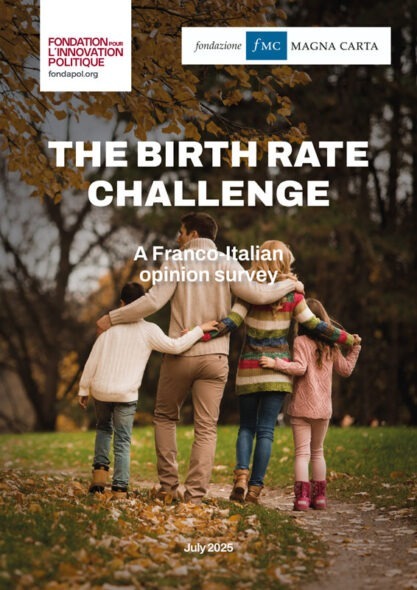
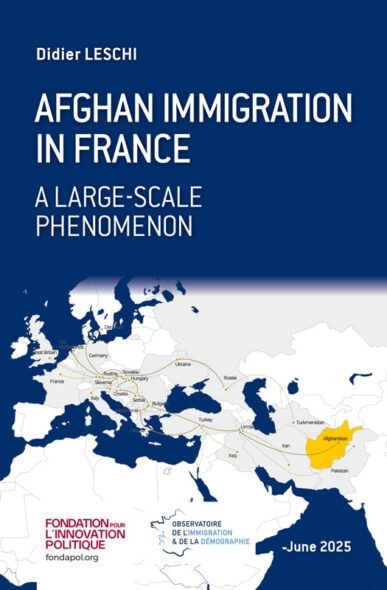
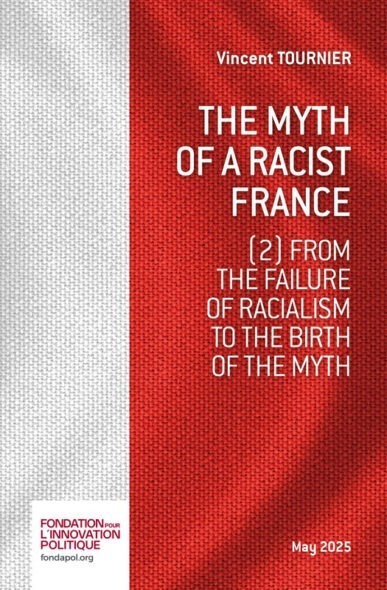
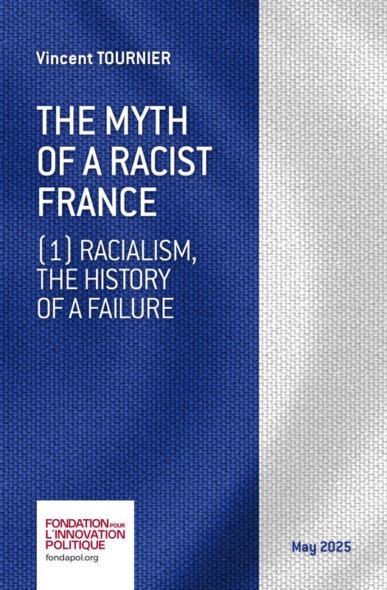
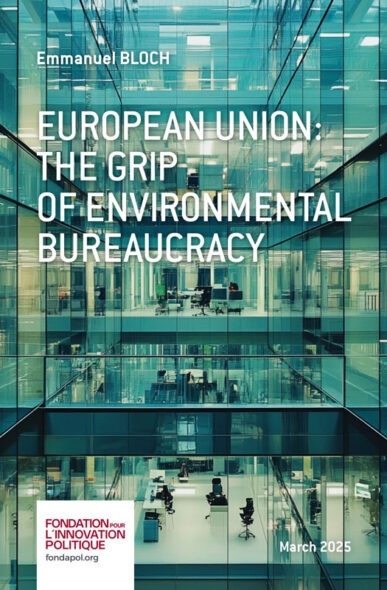
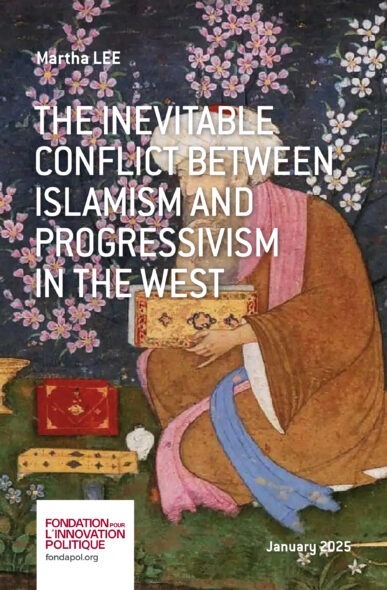
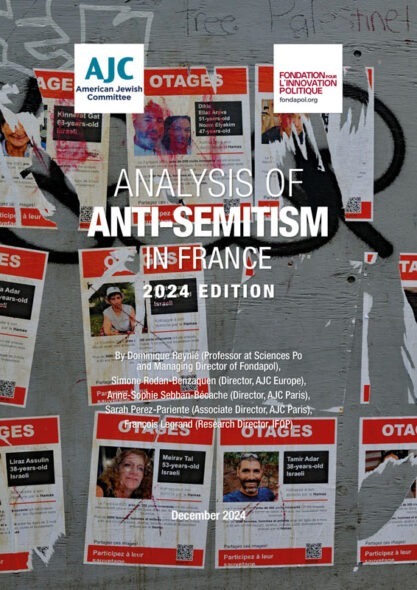
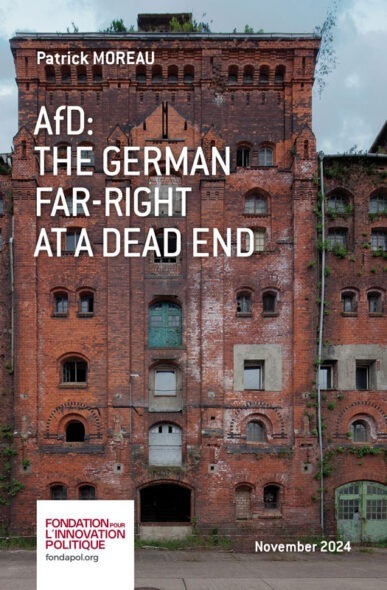
No comments.